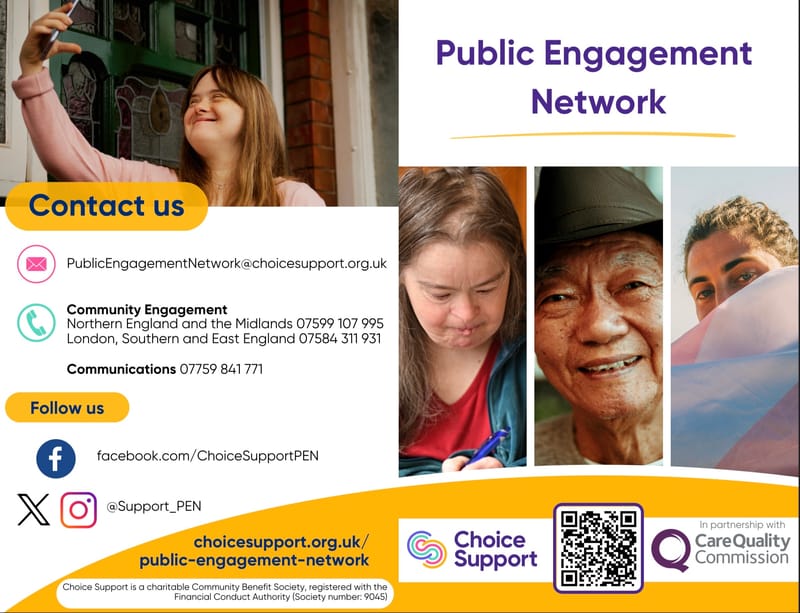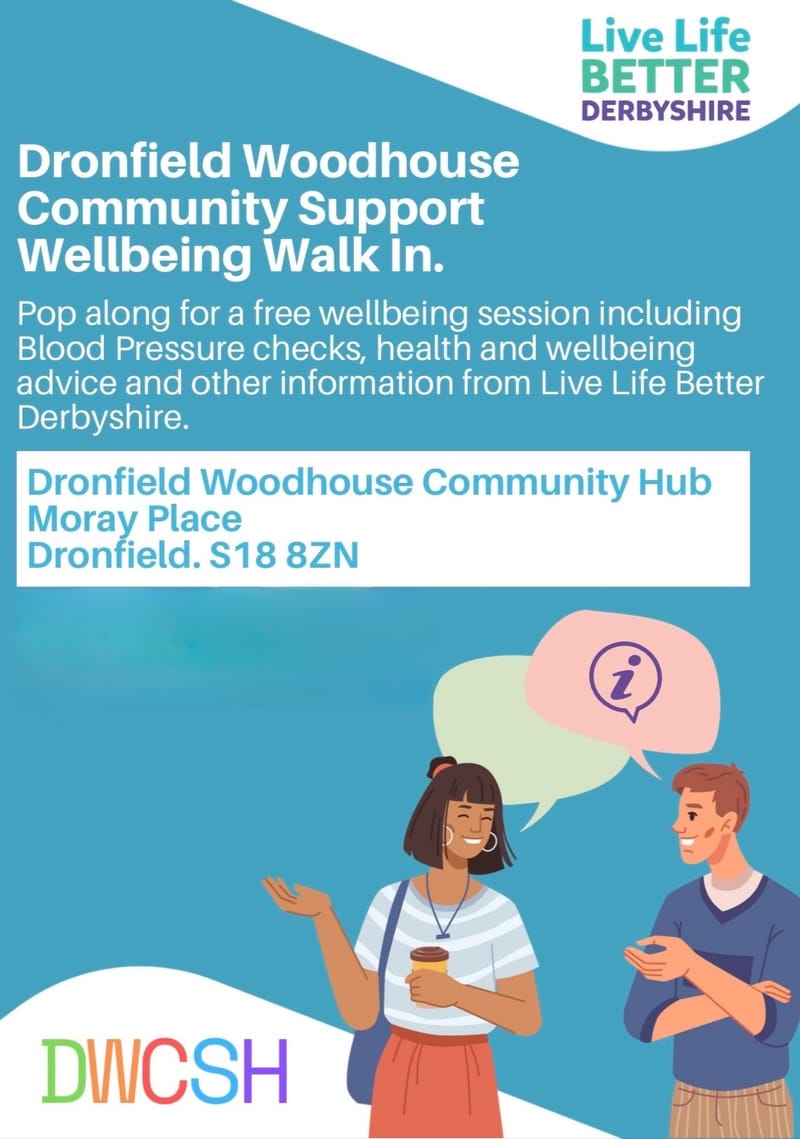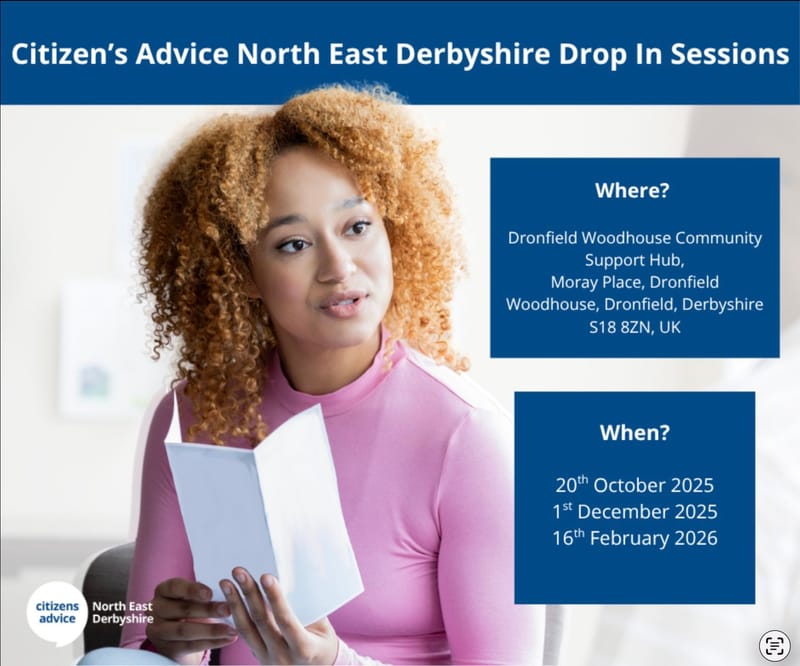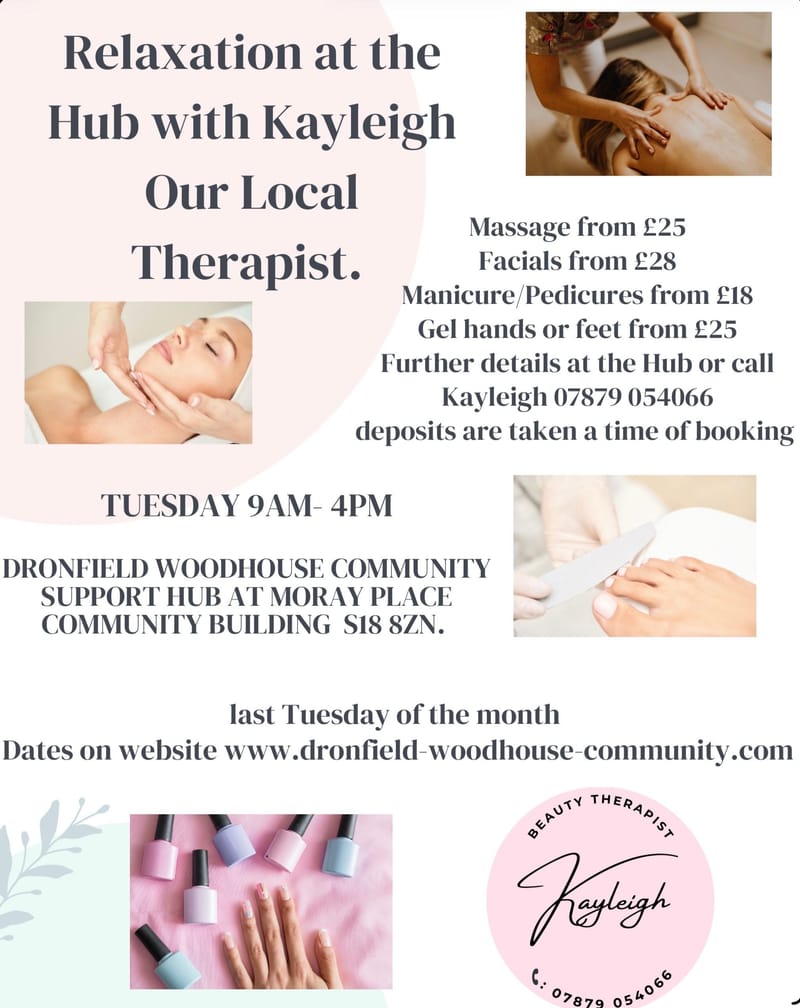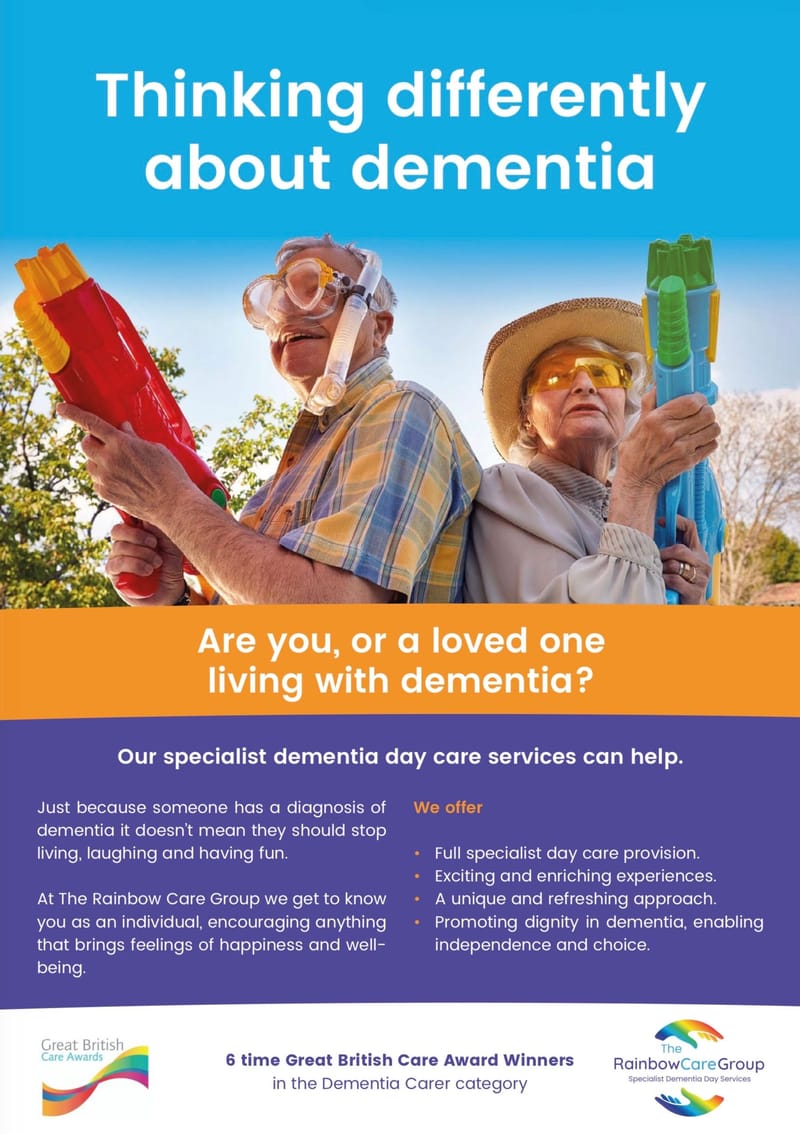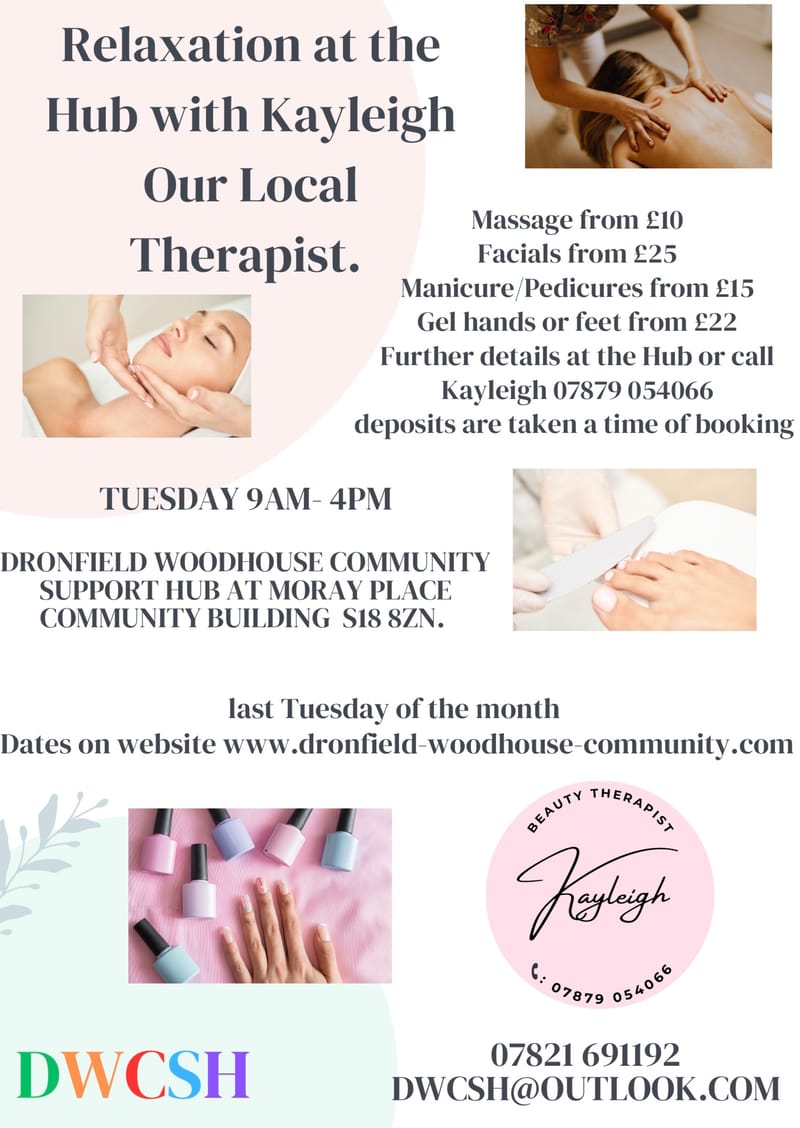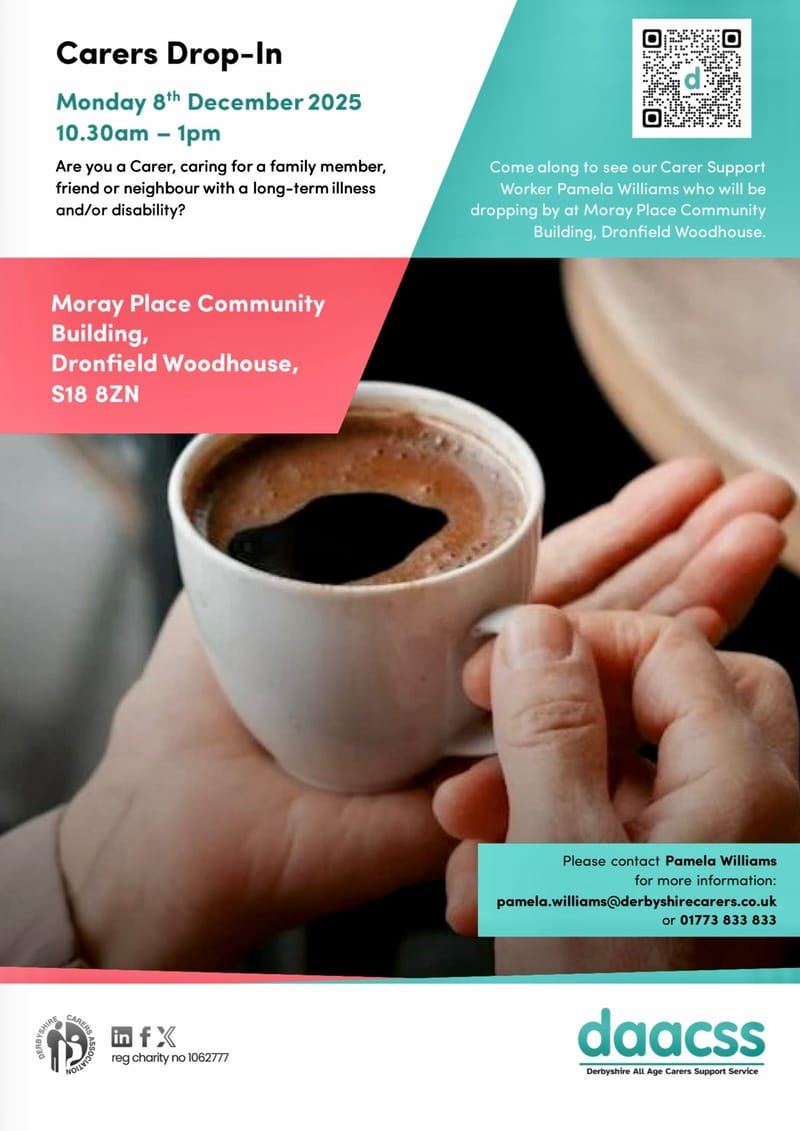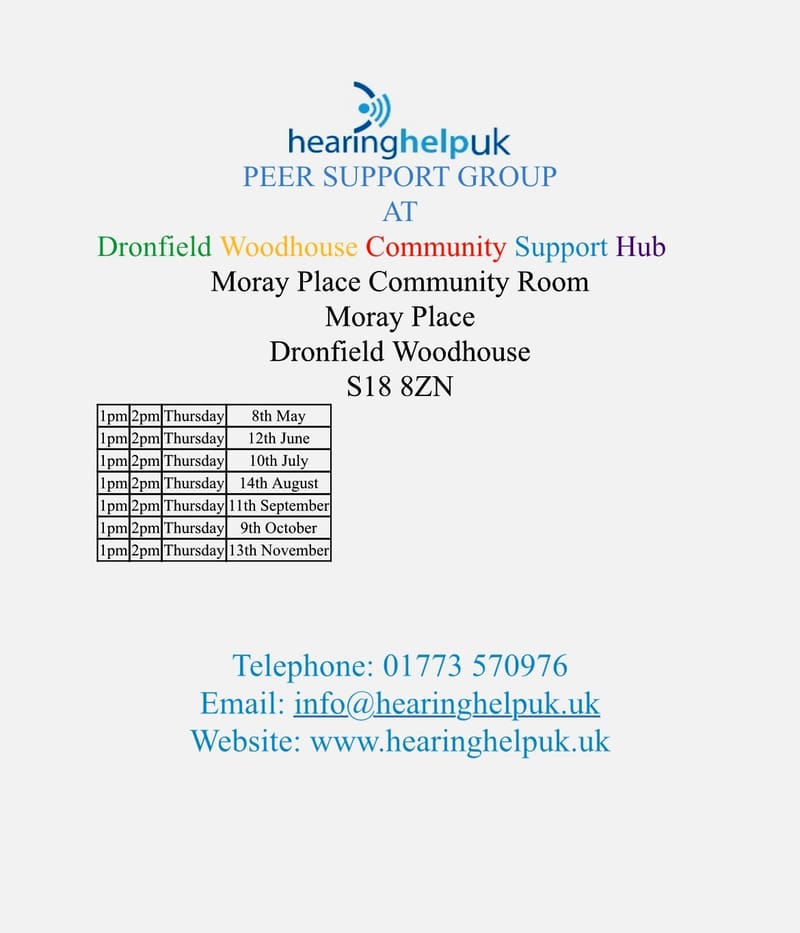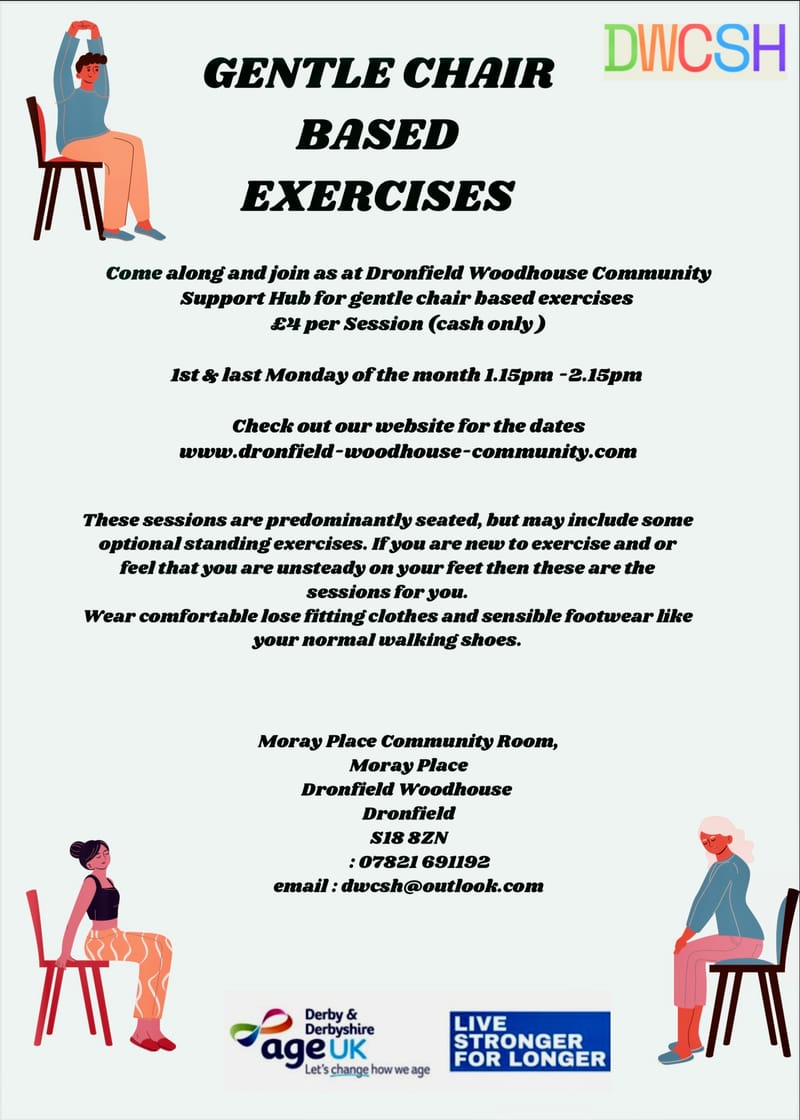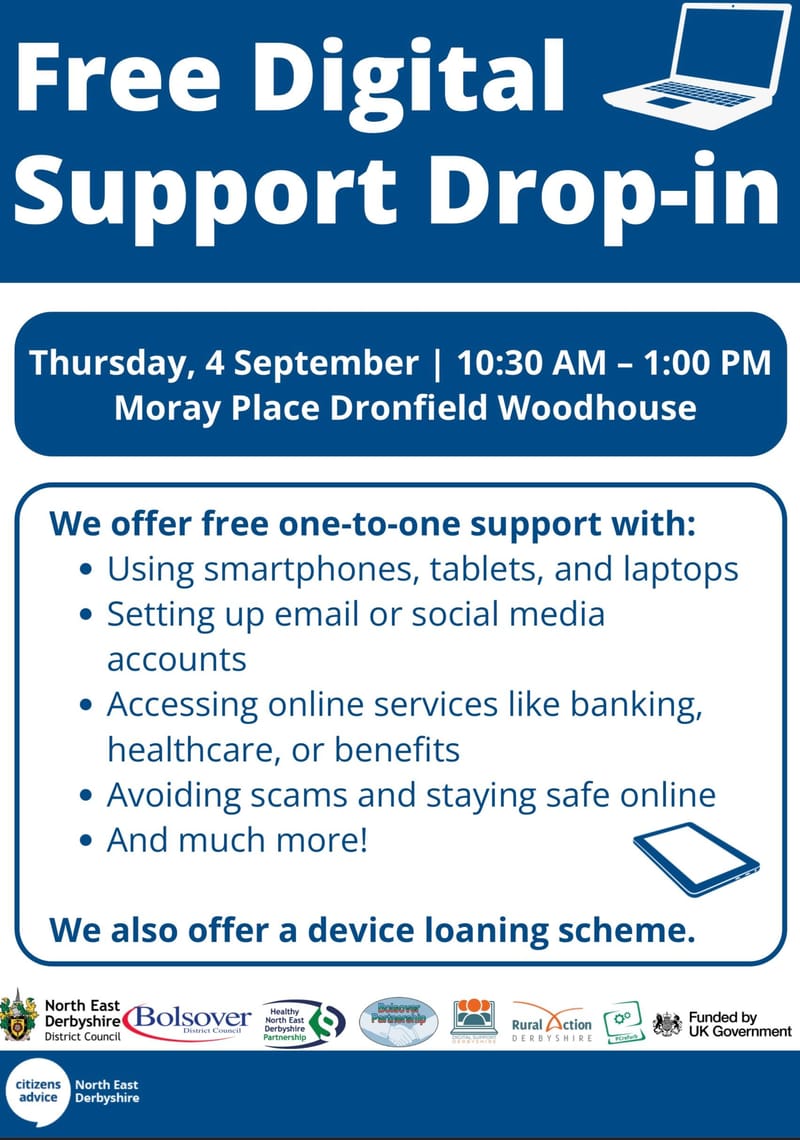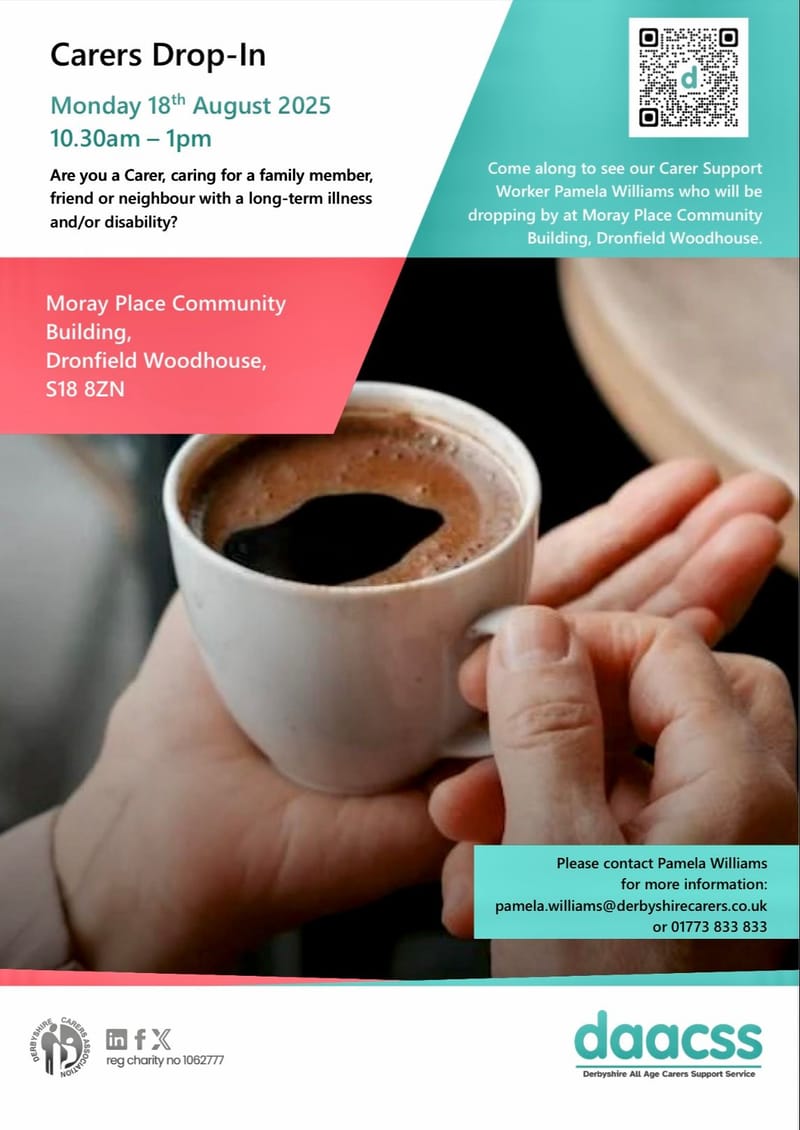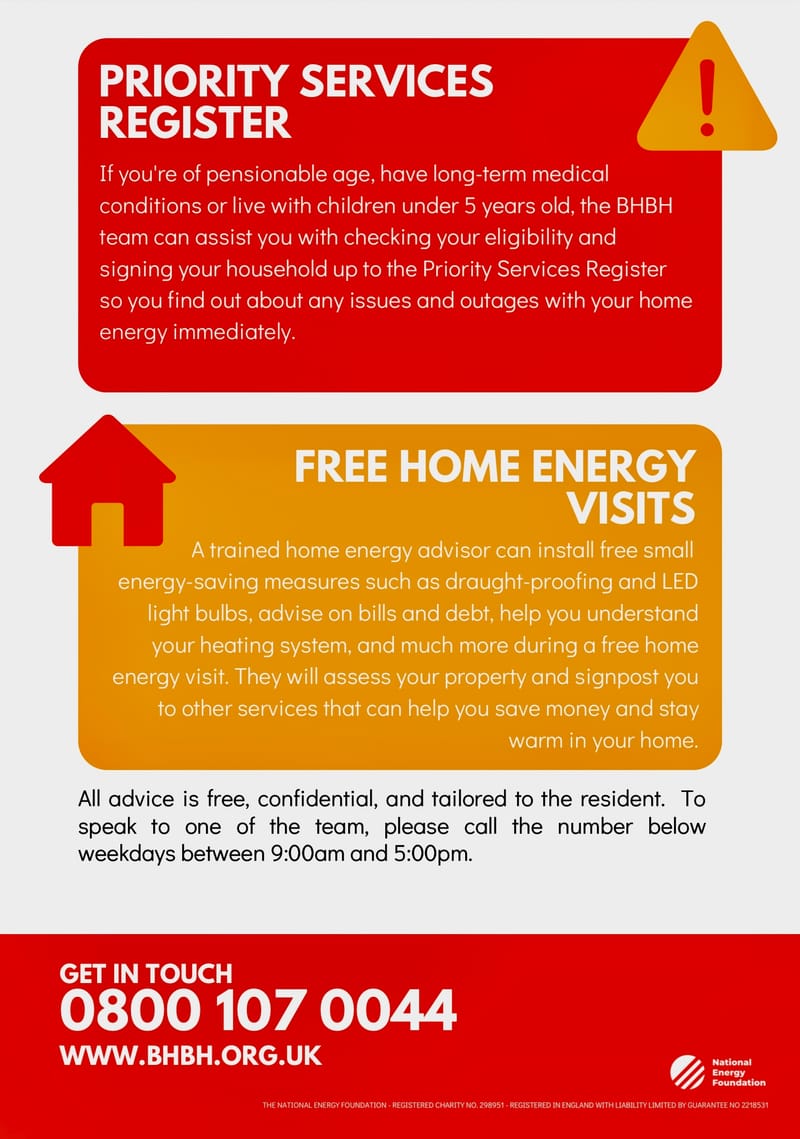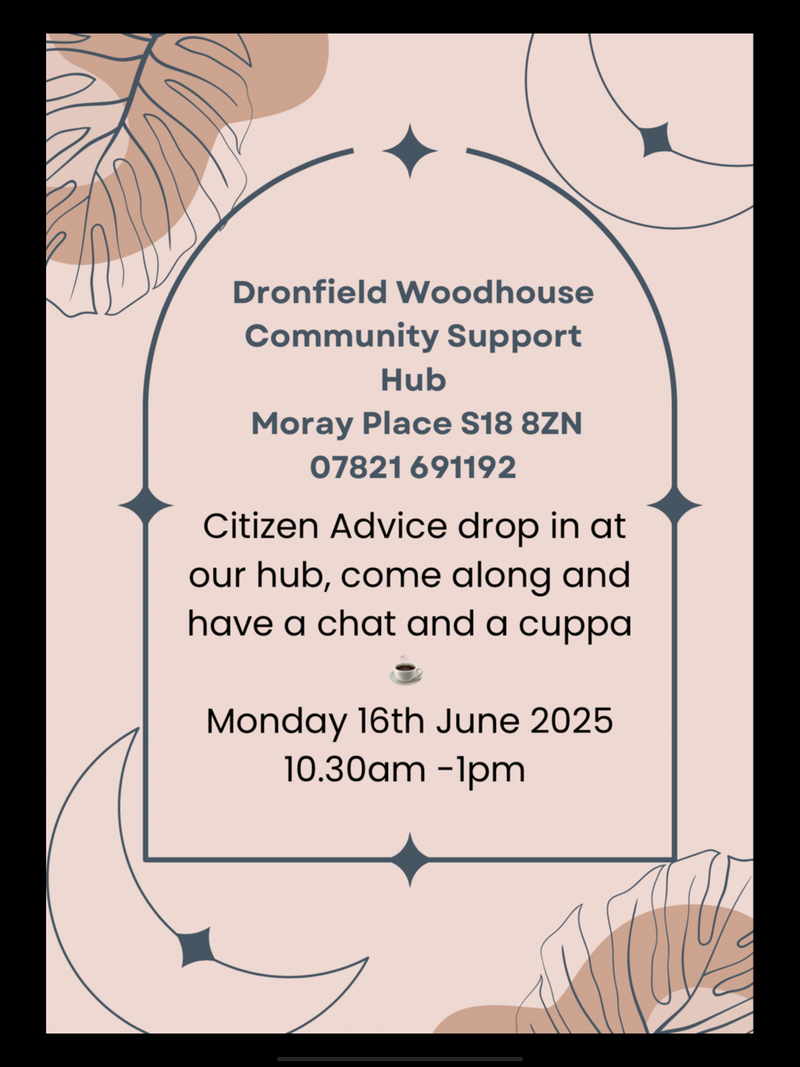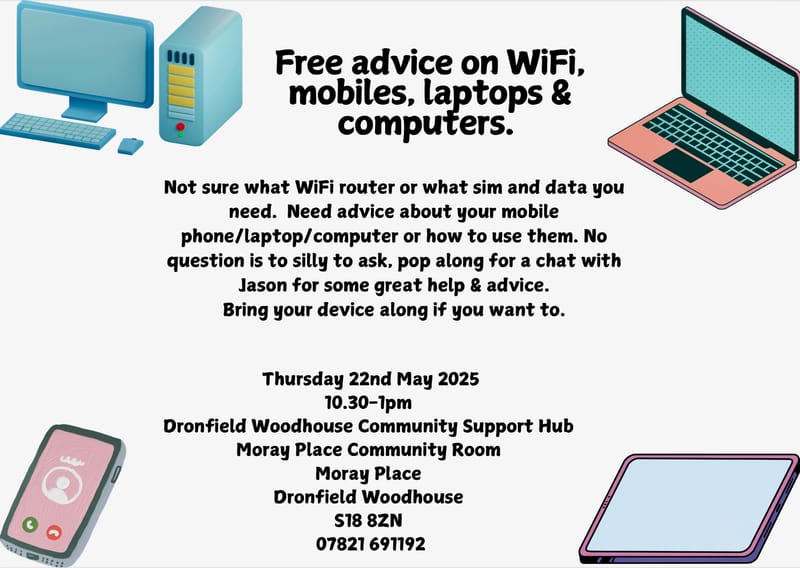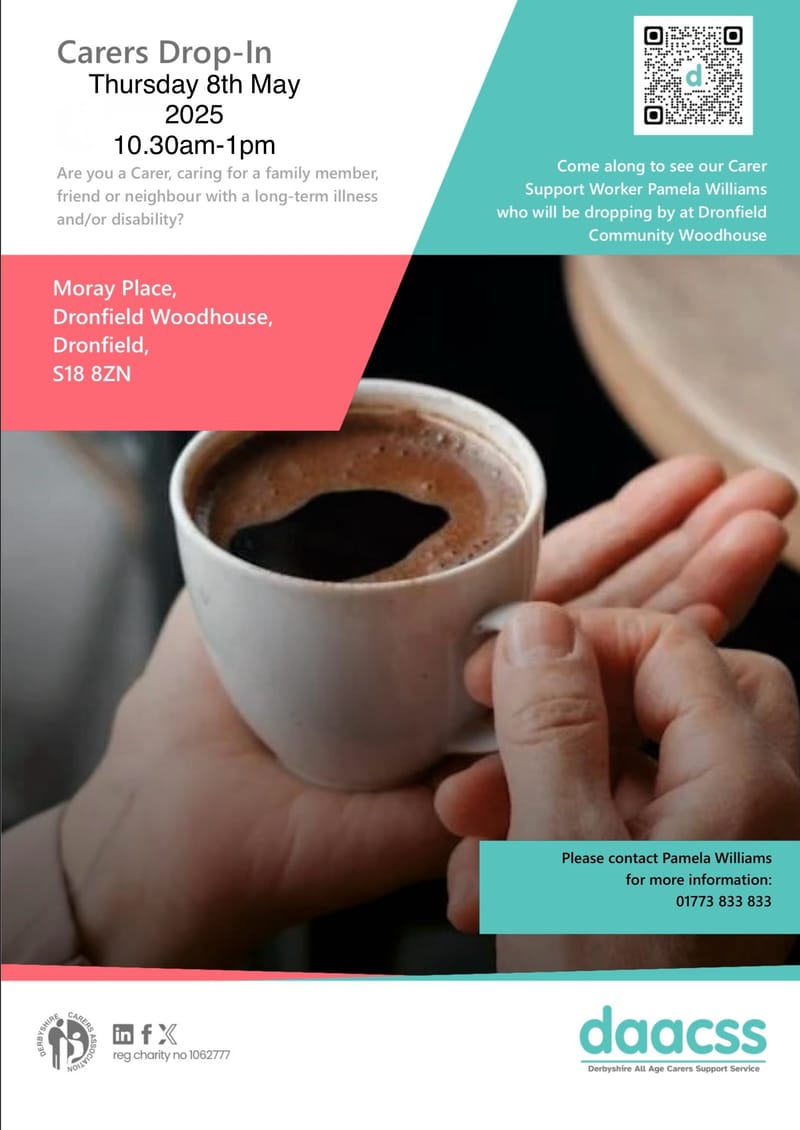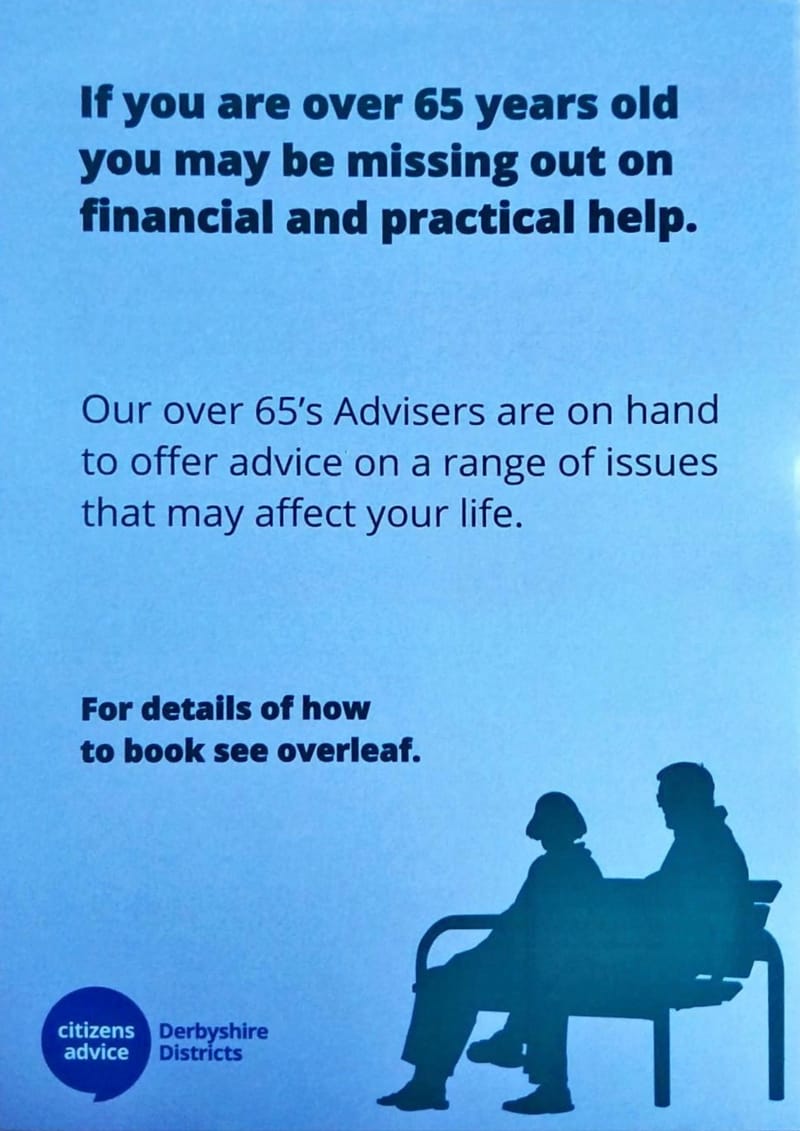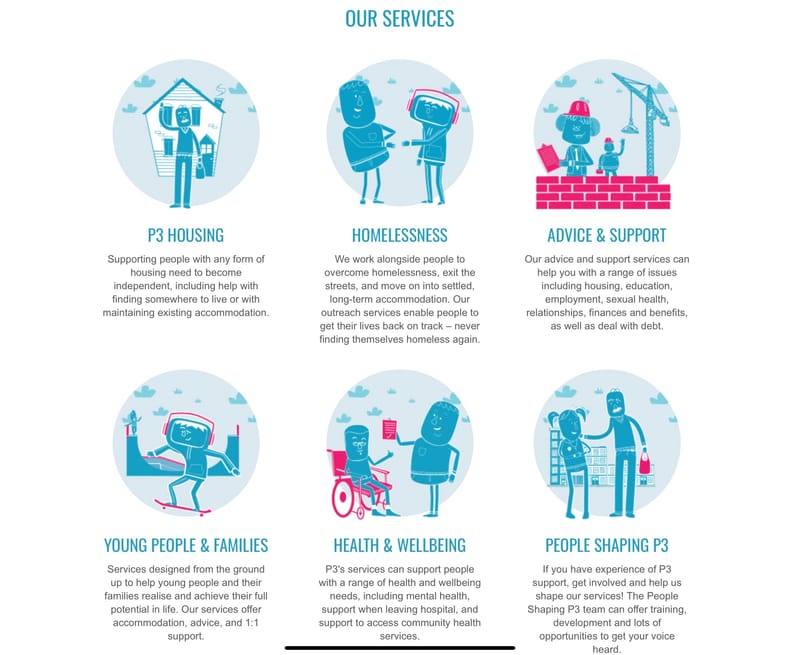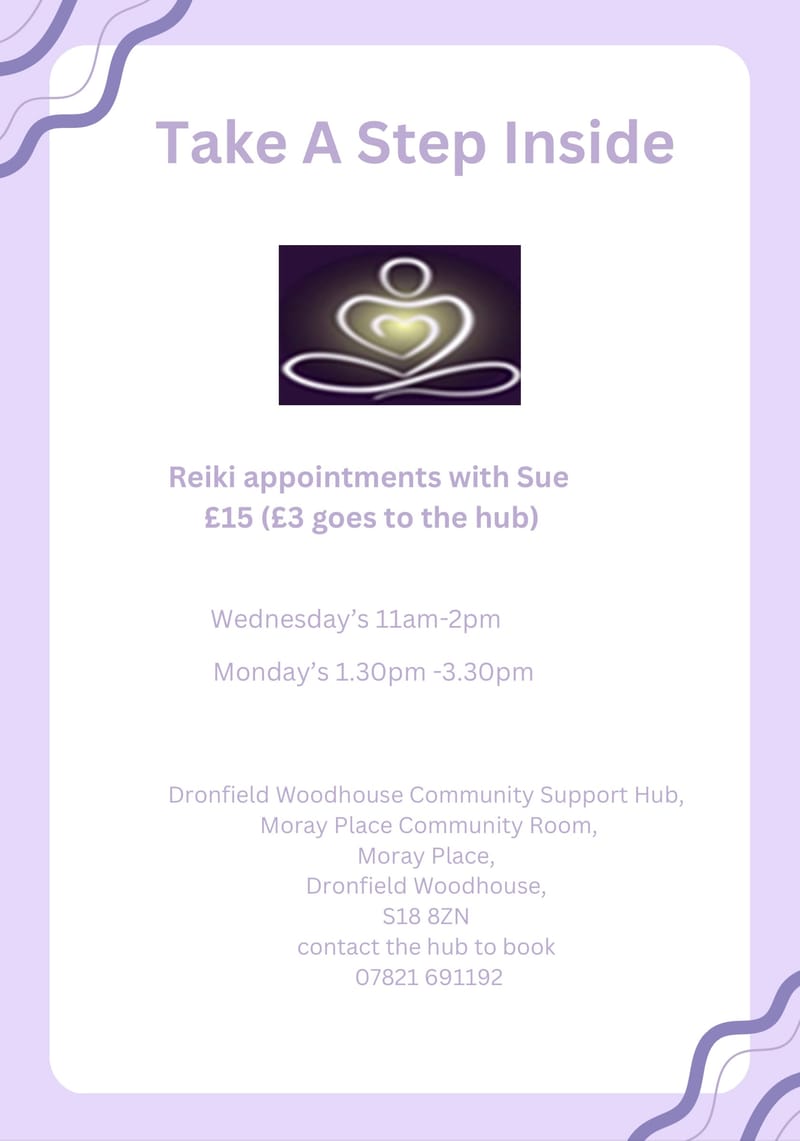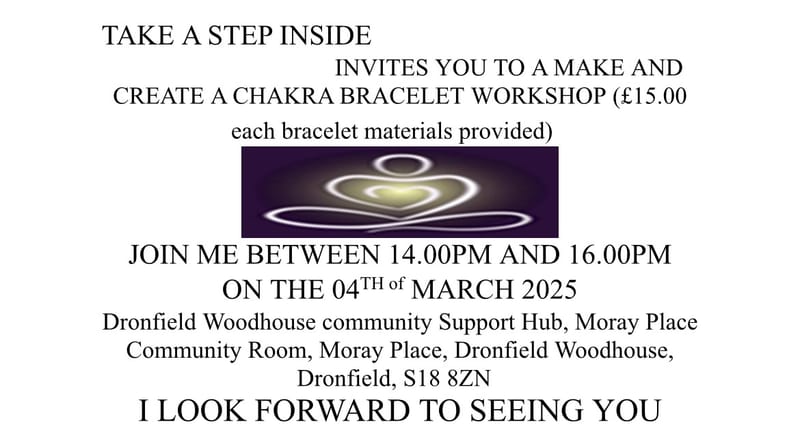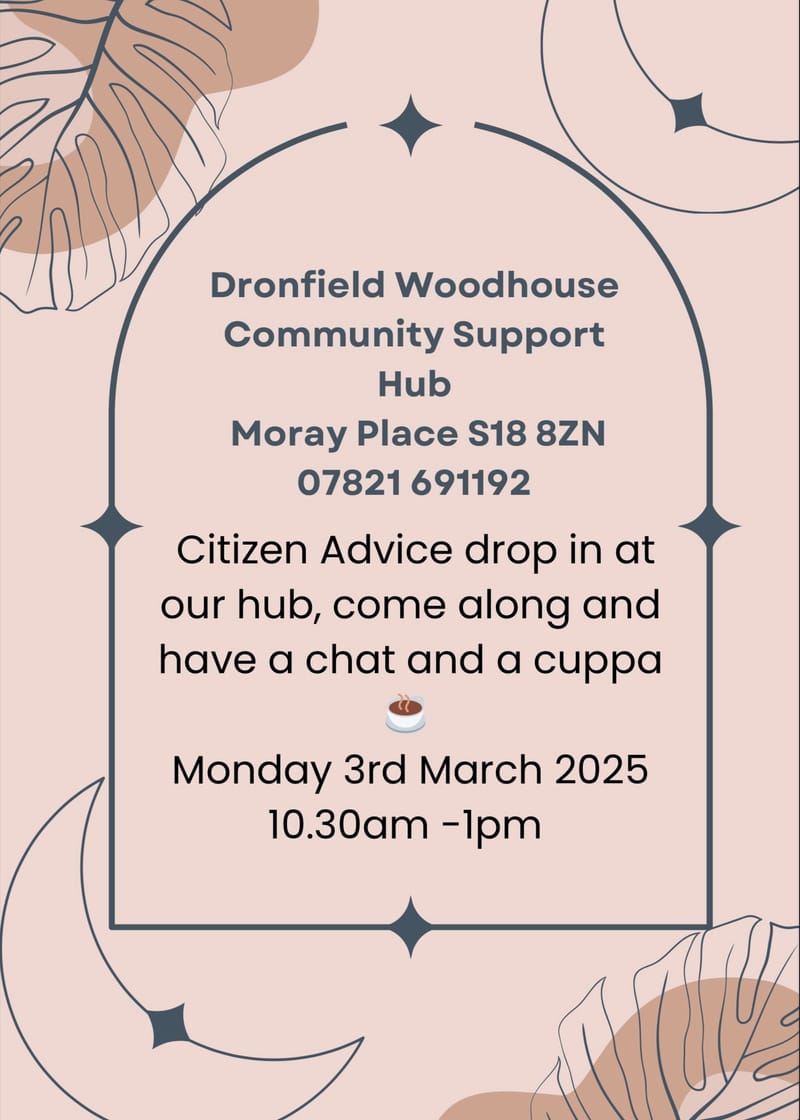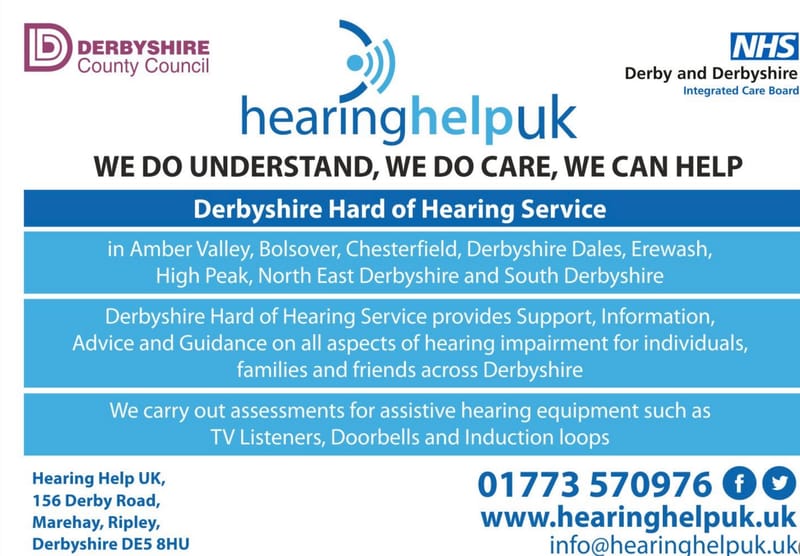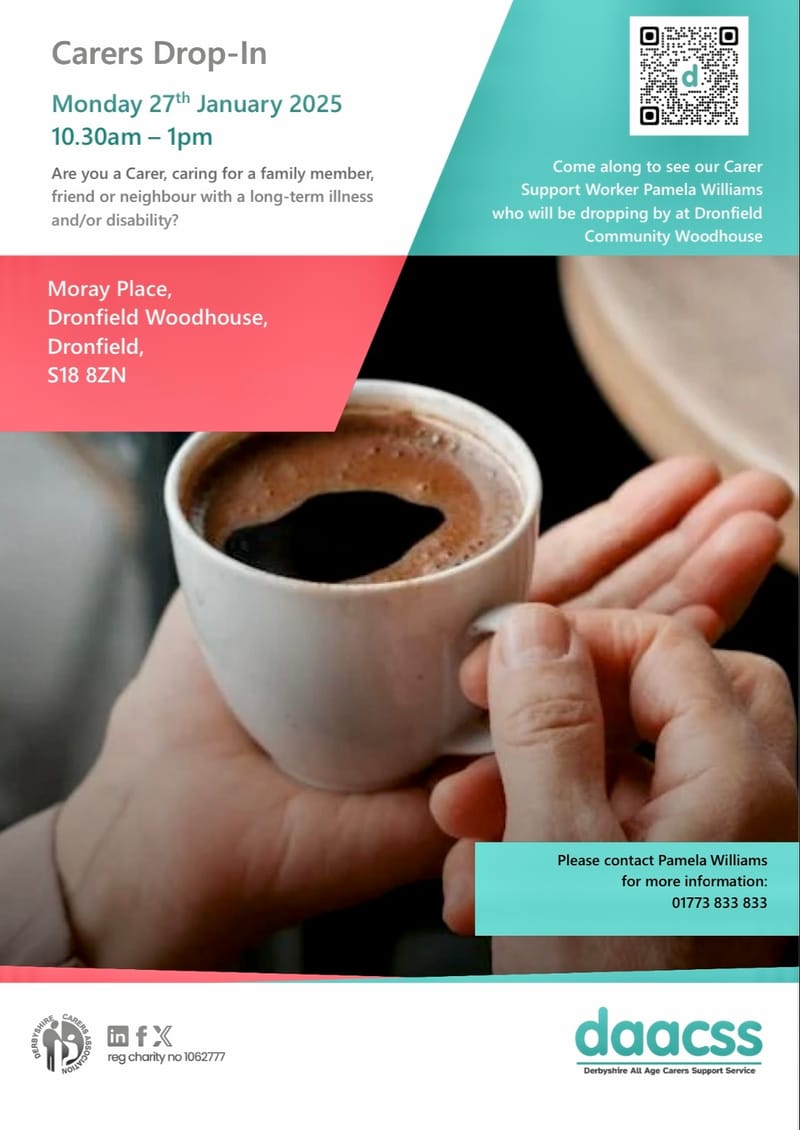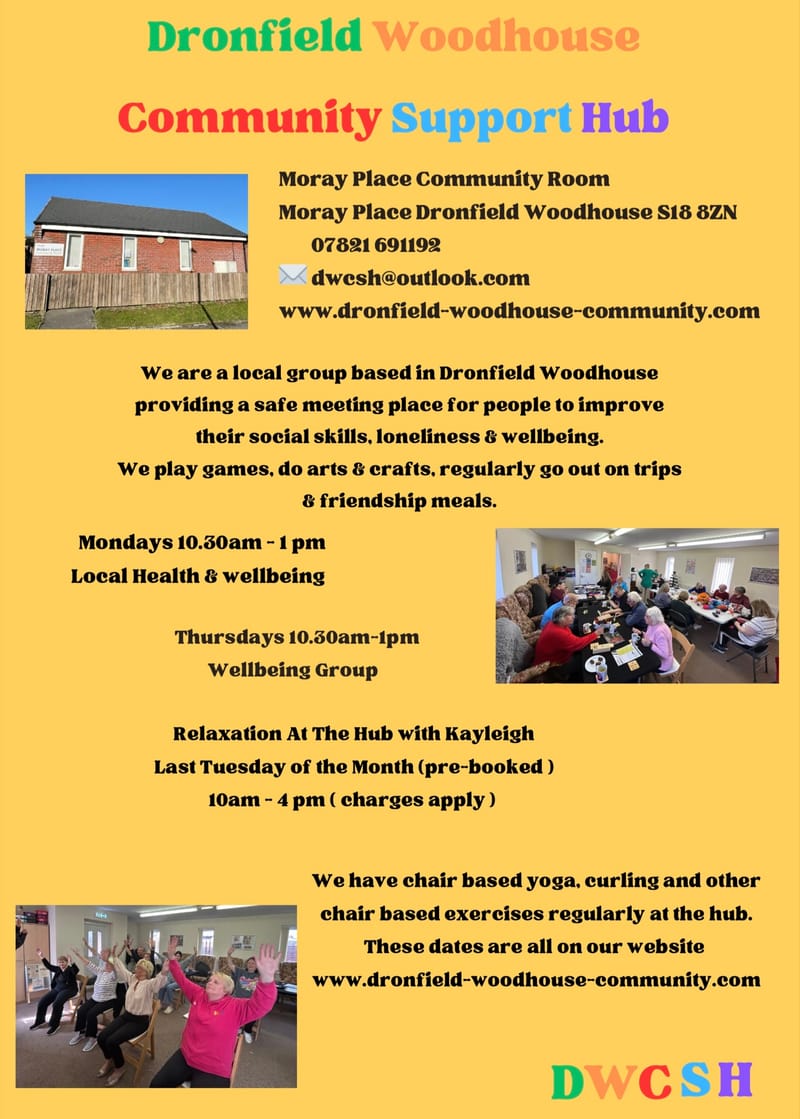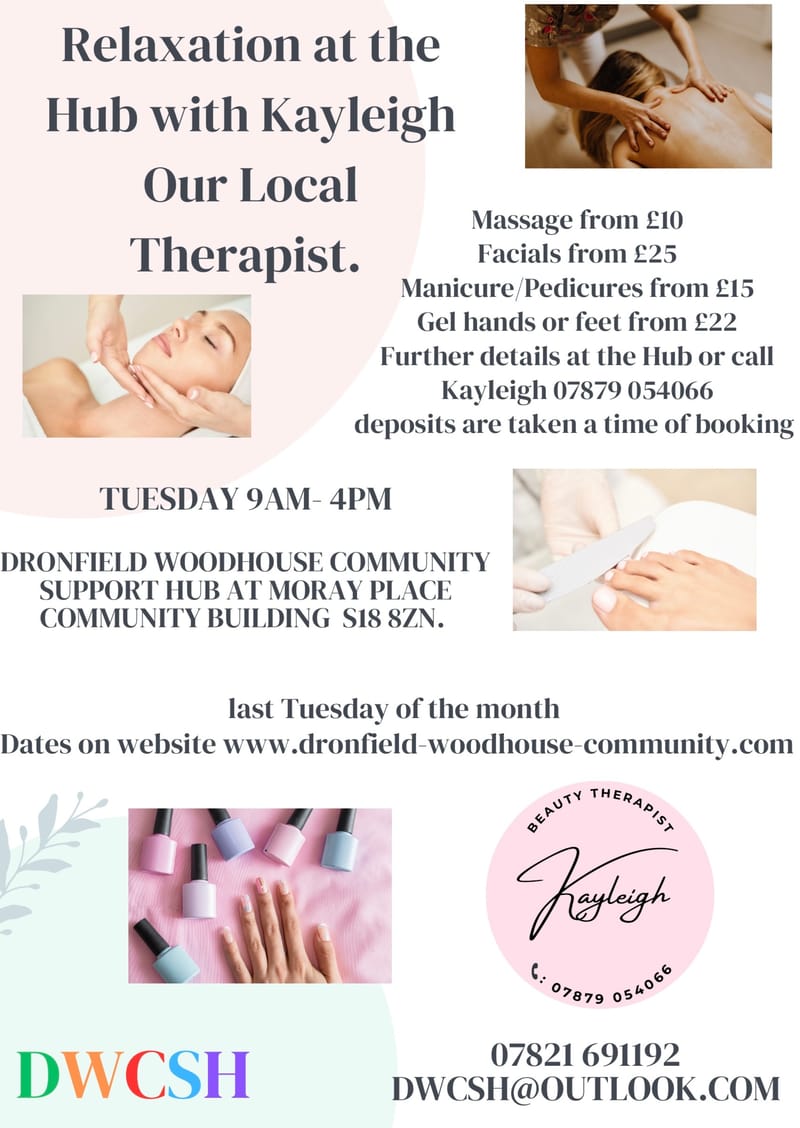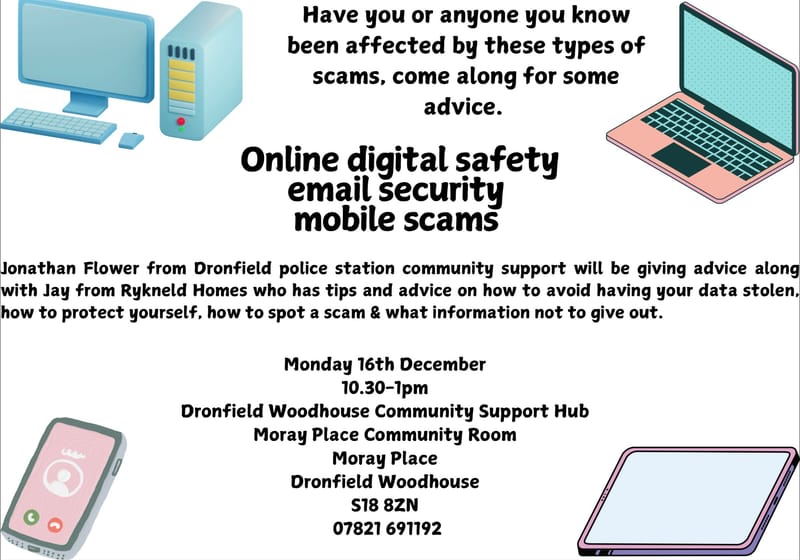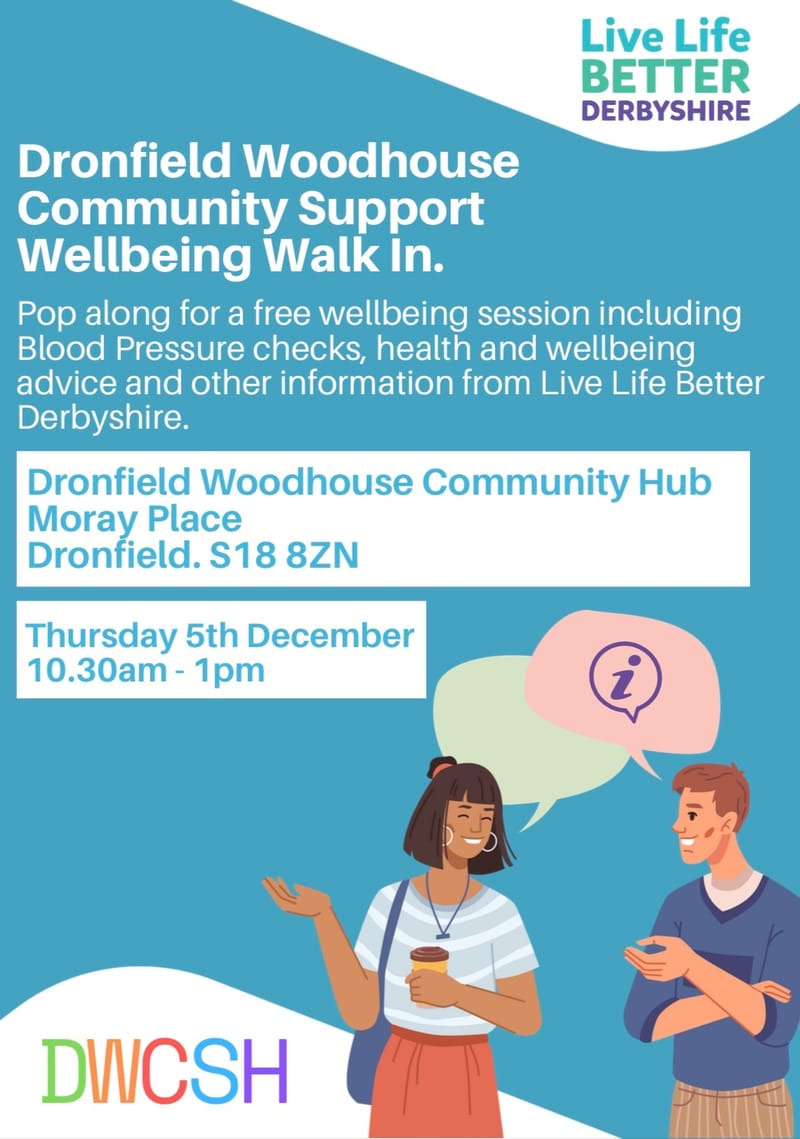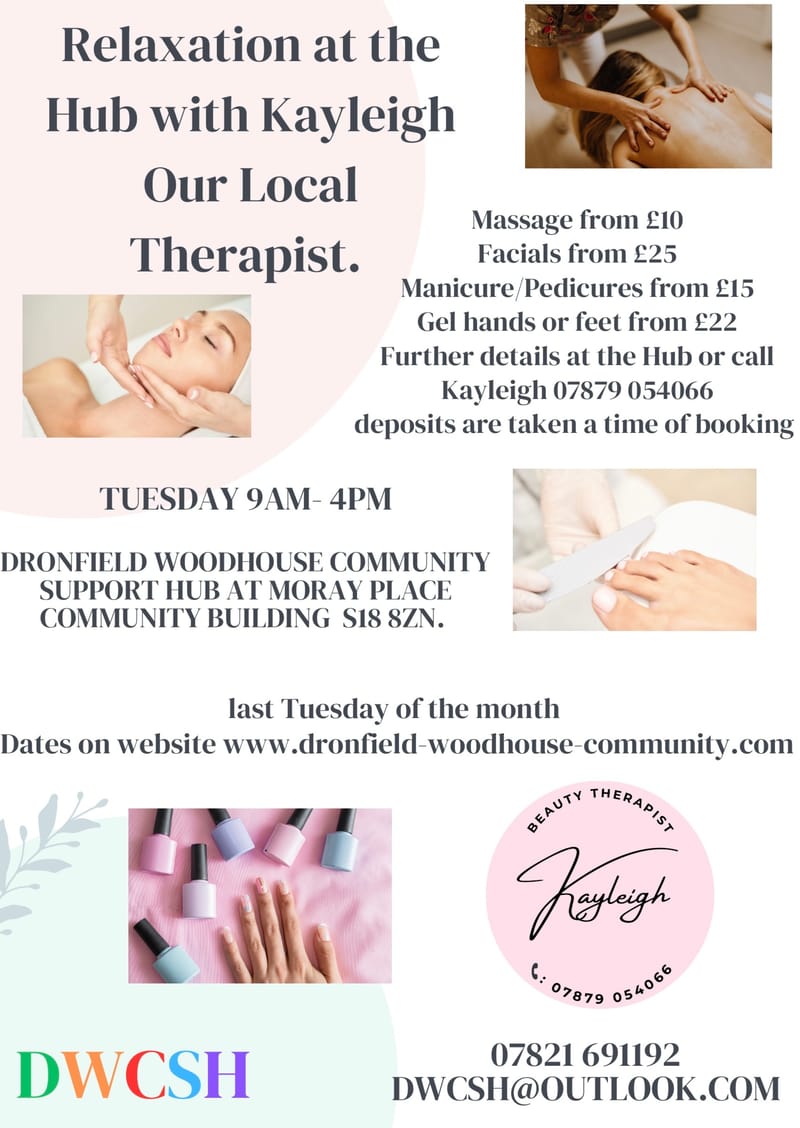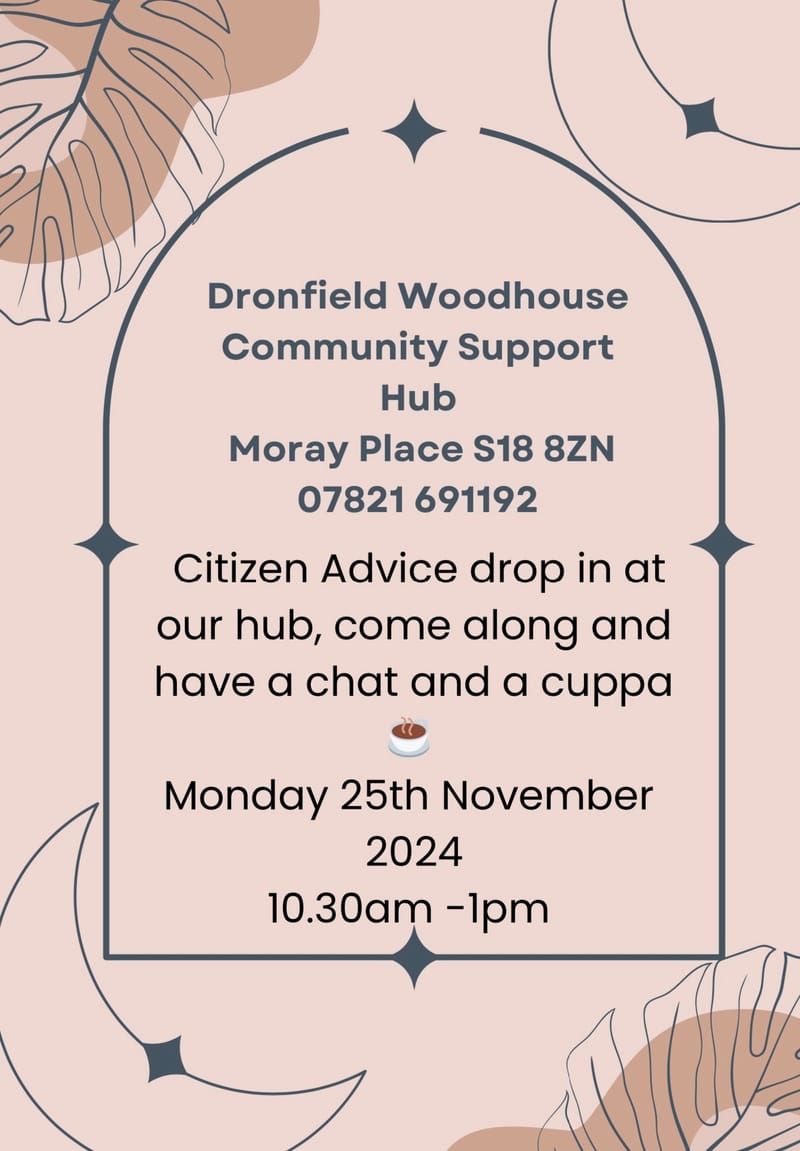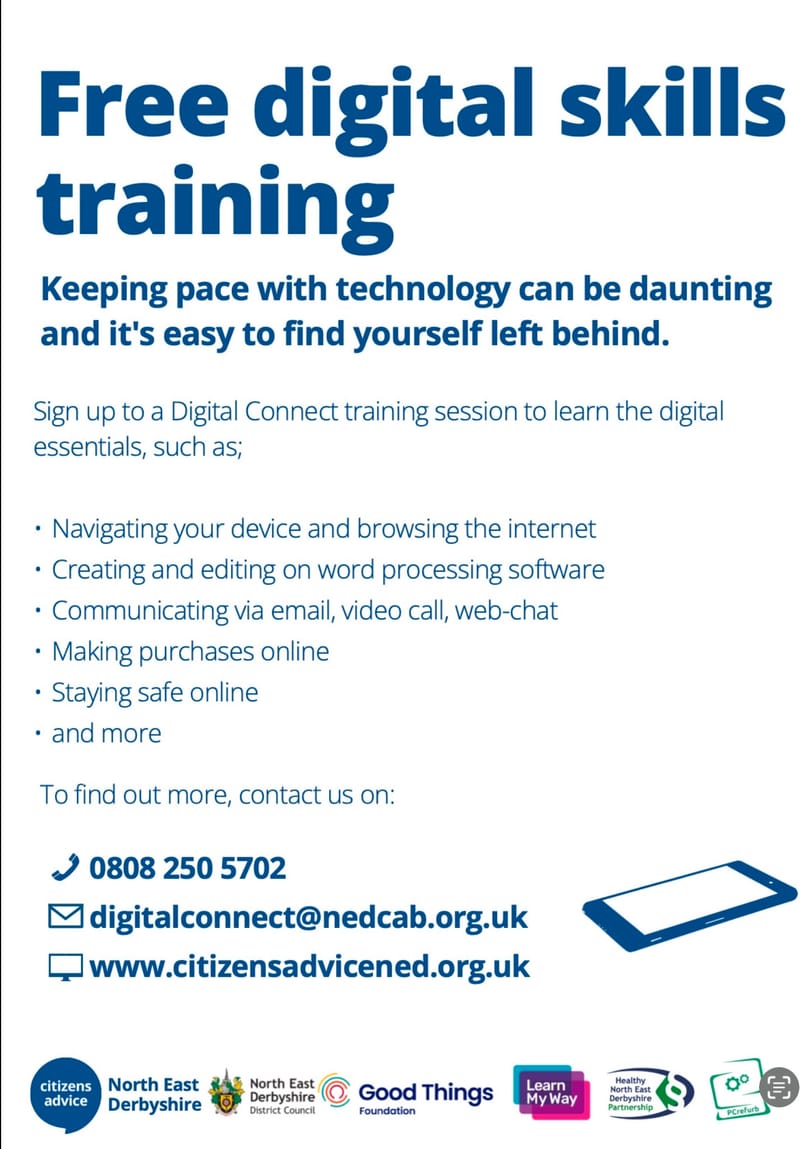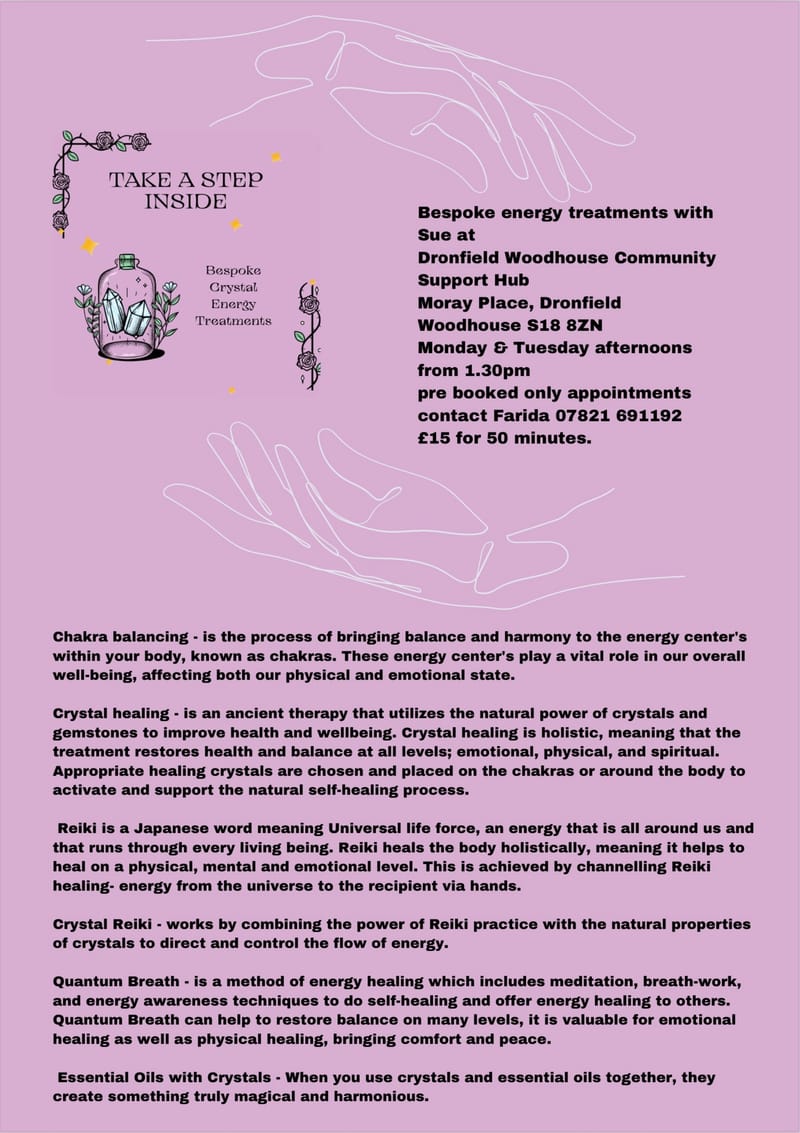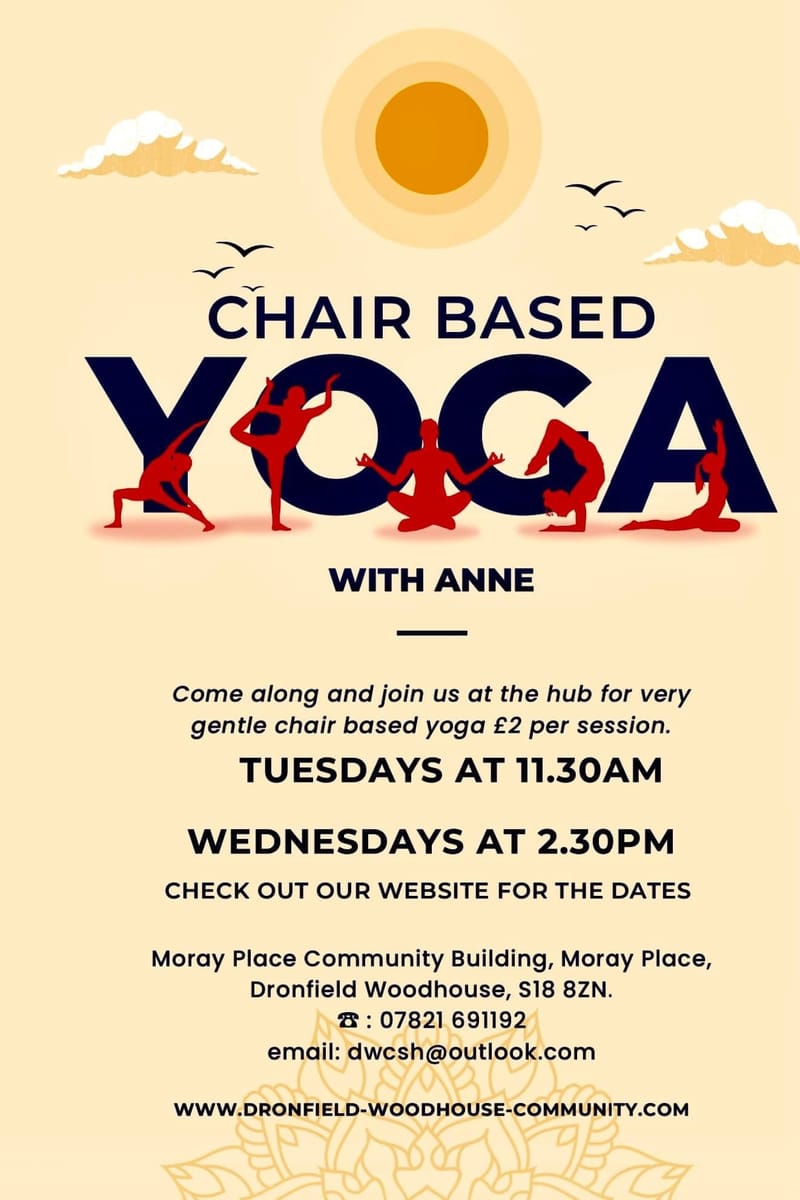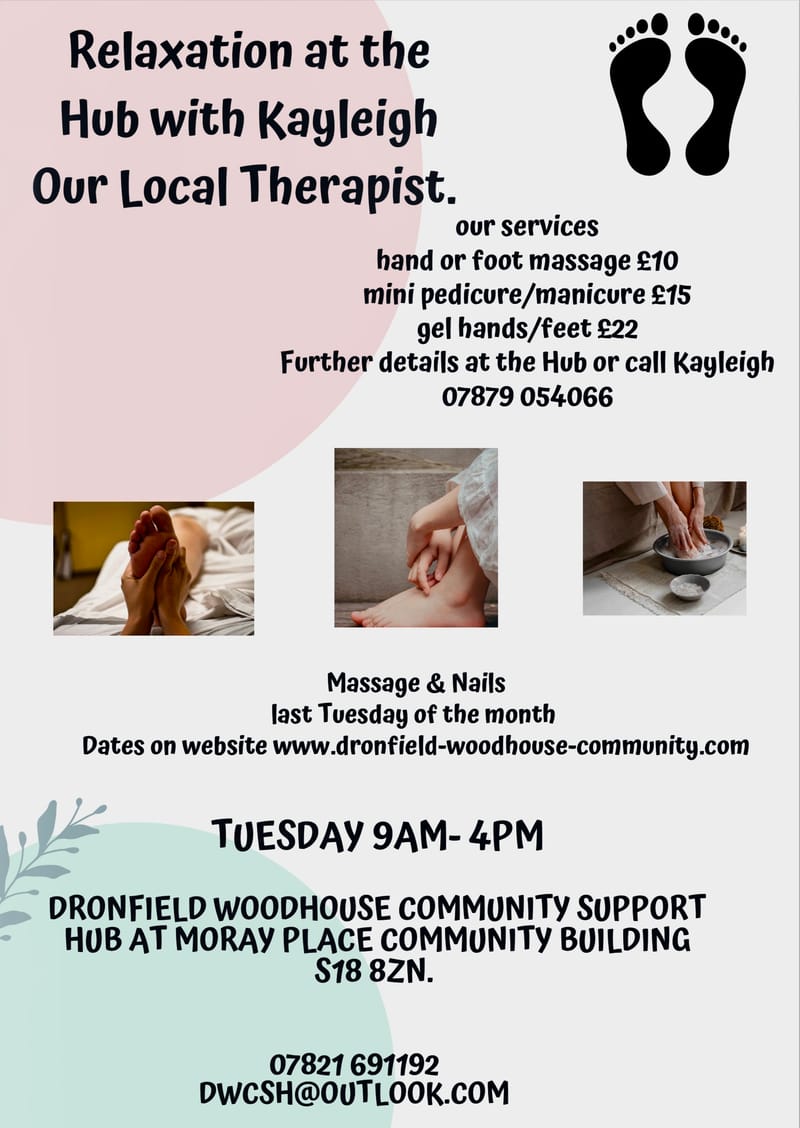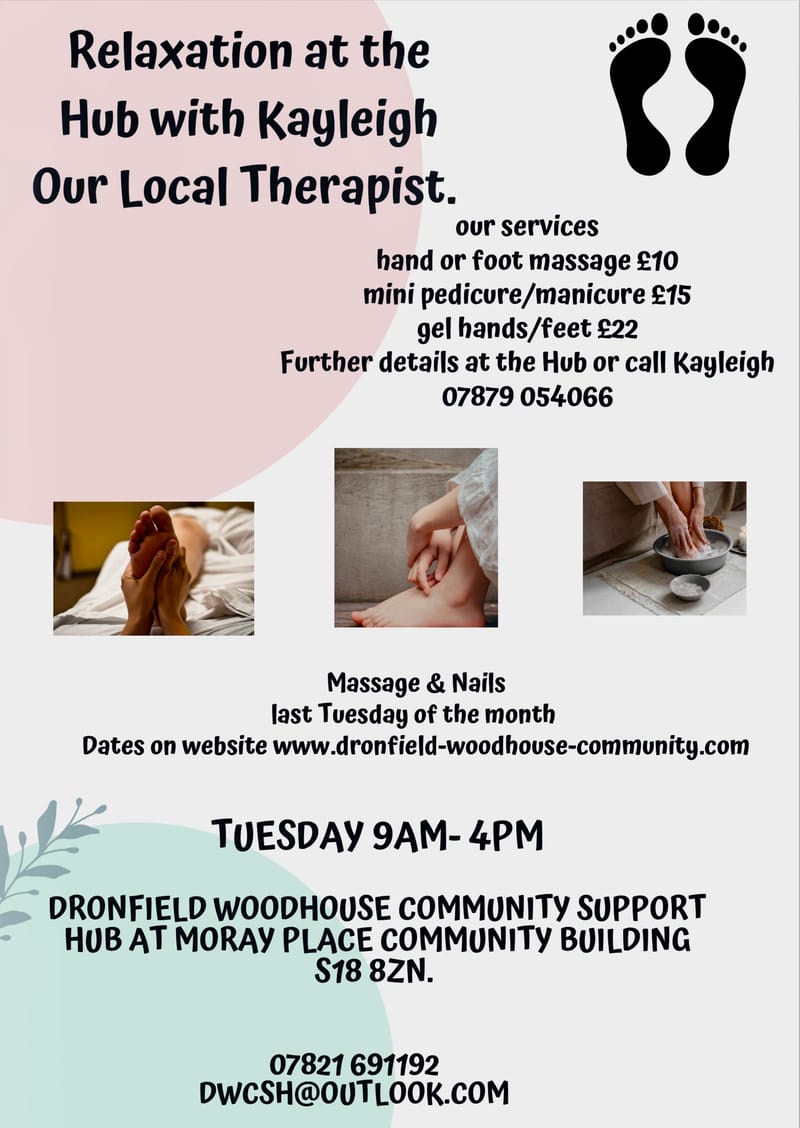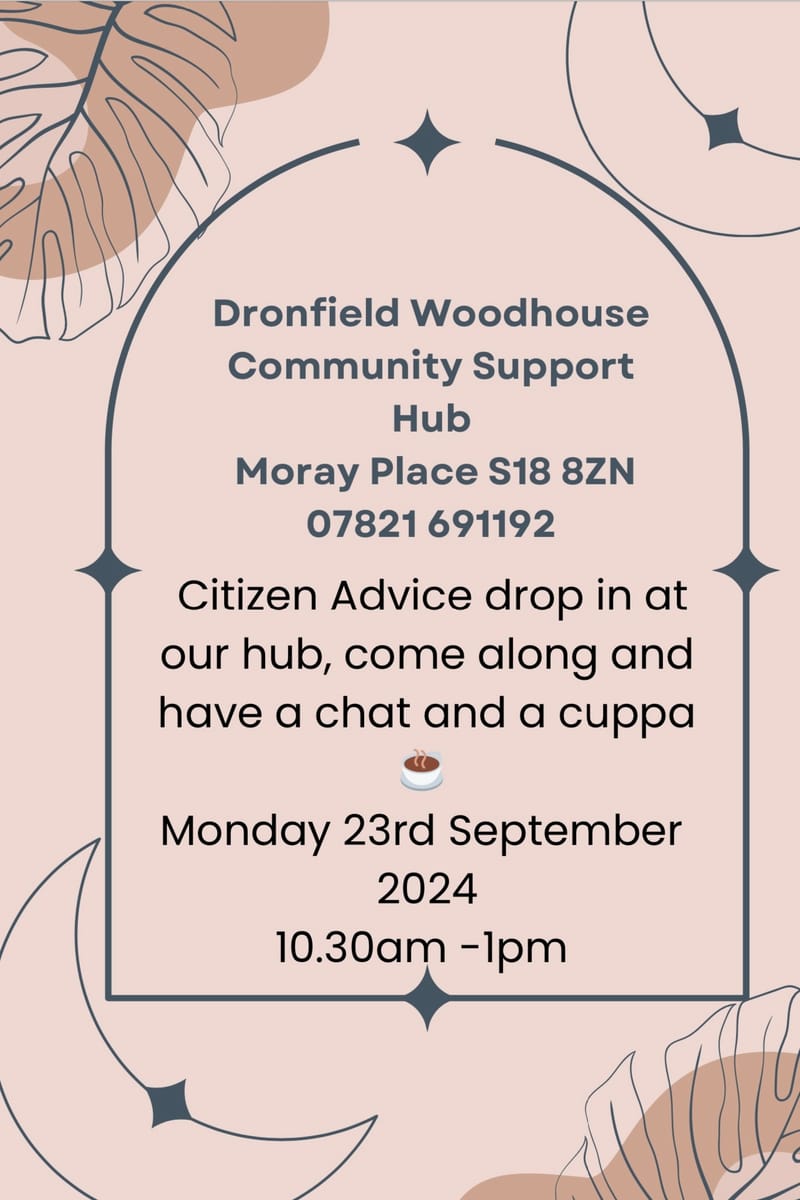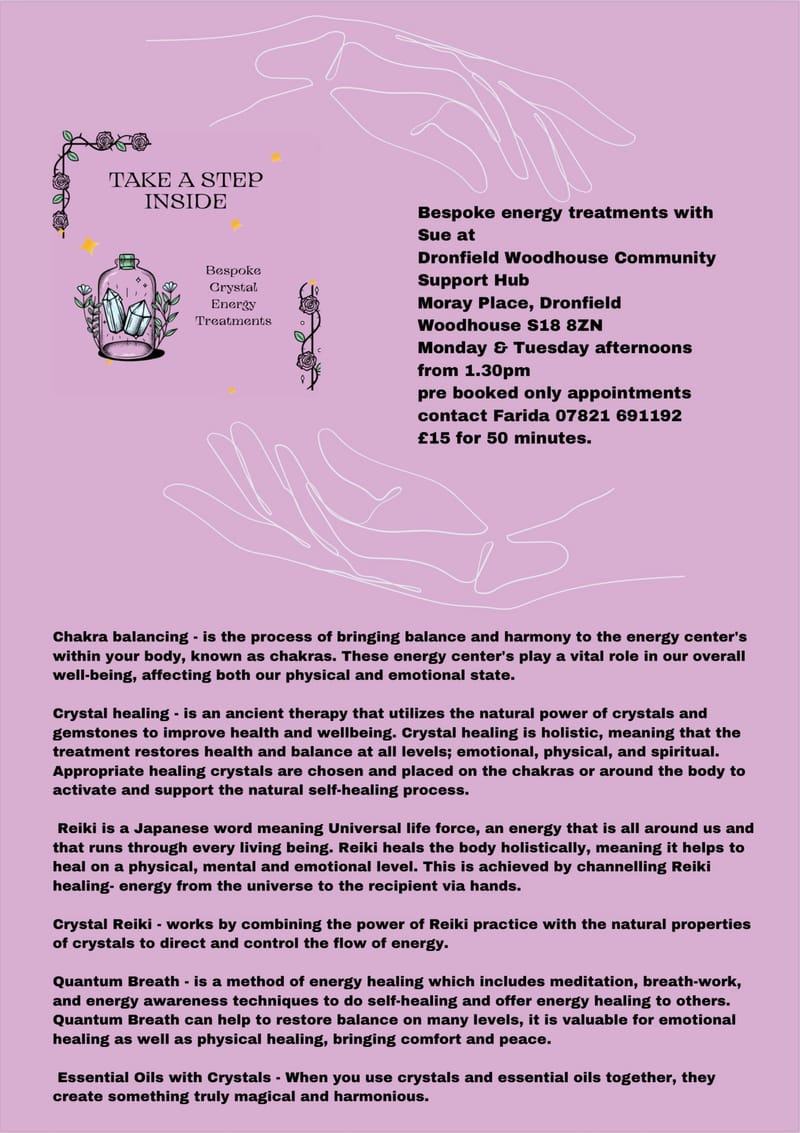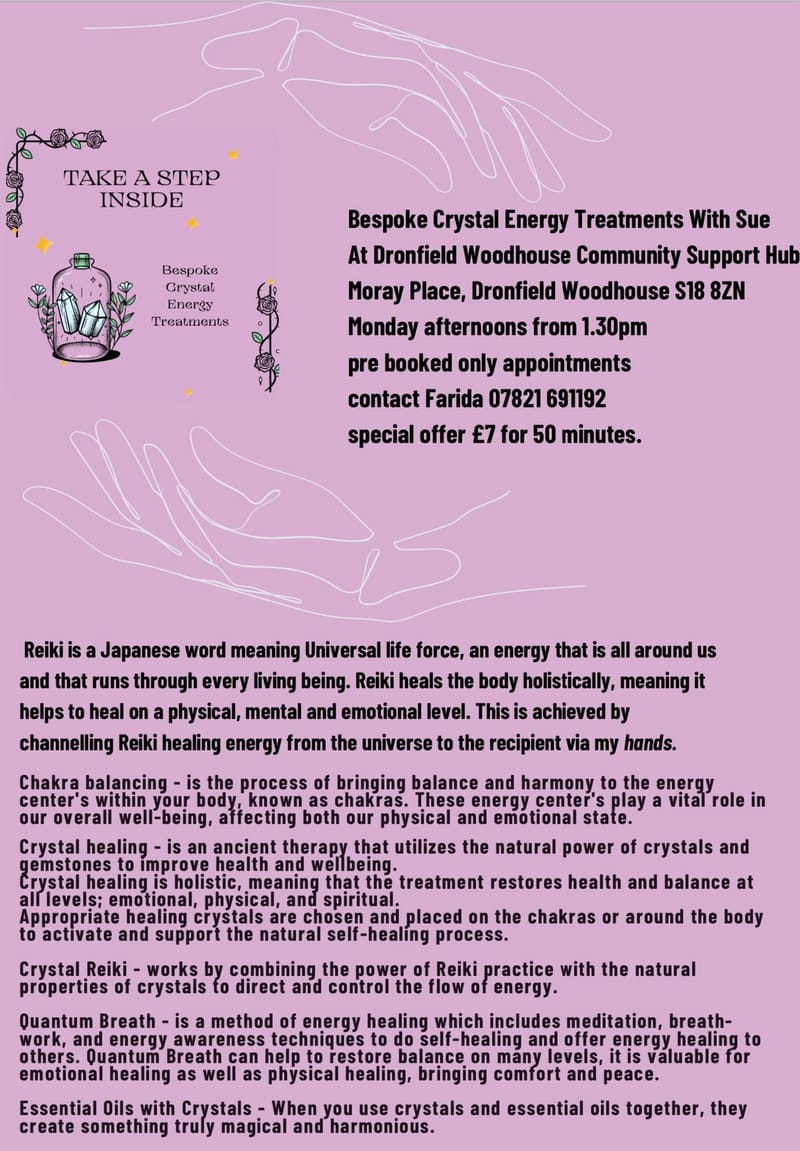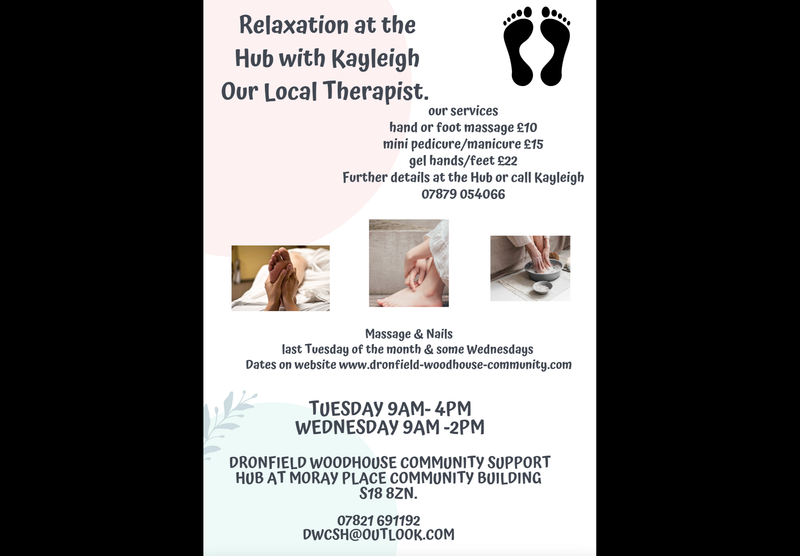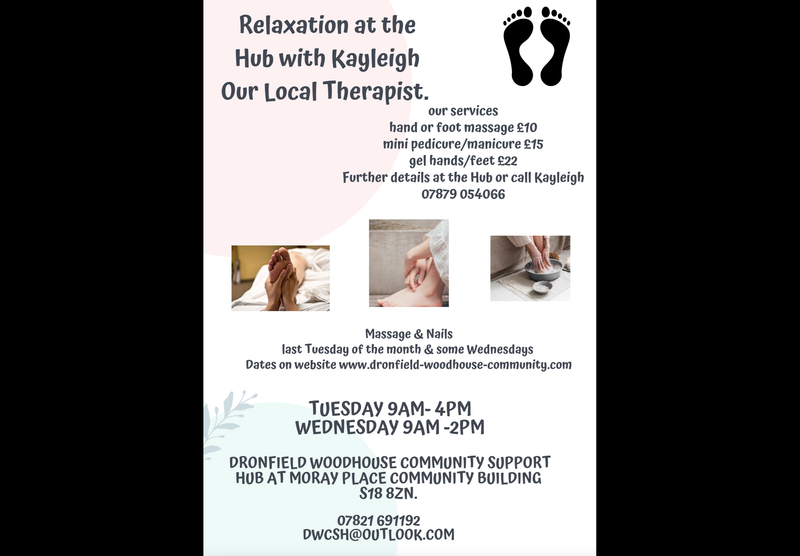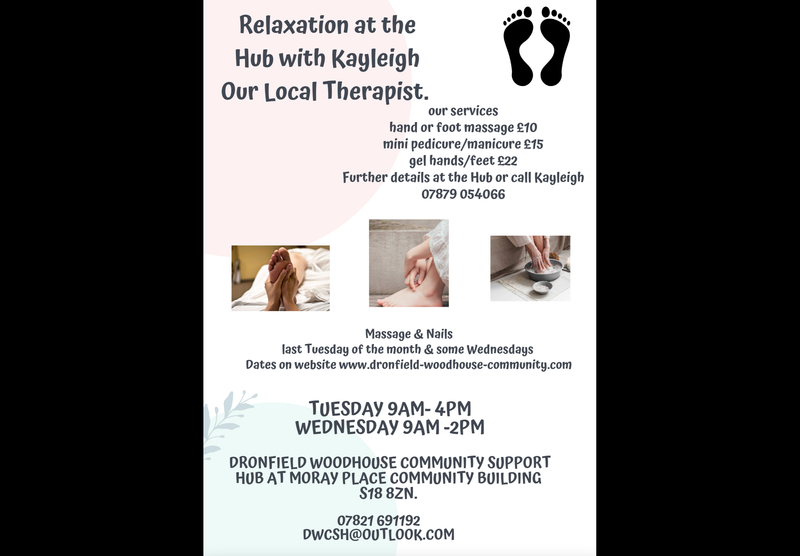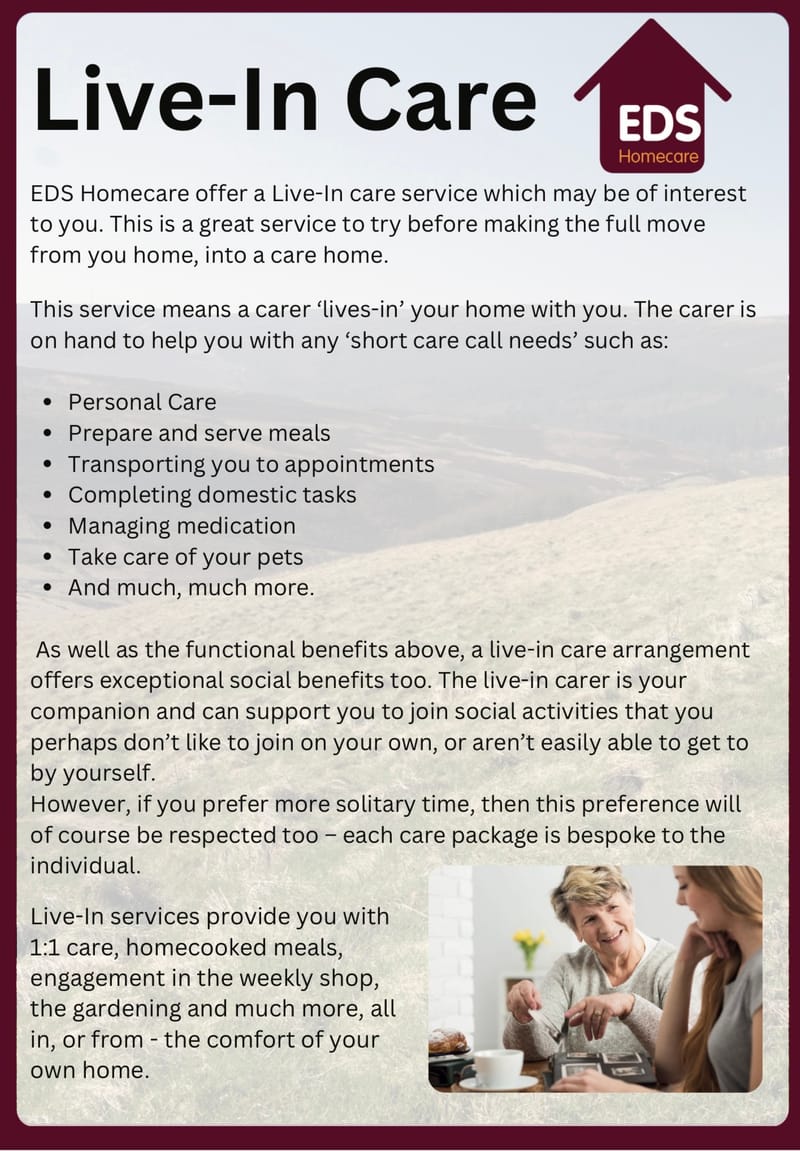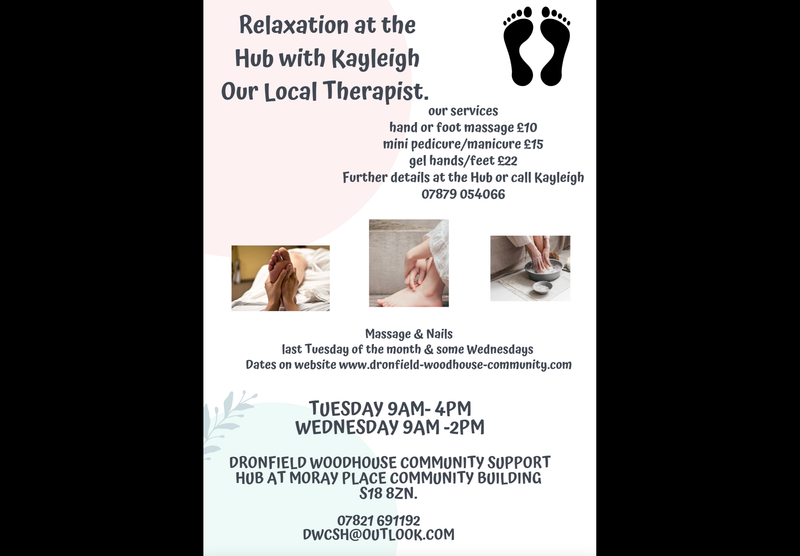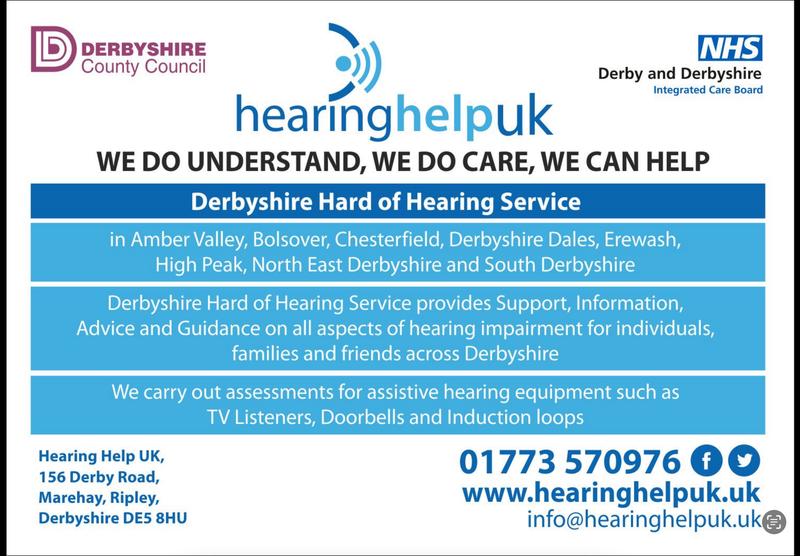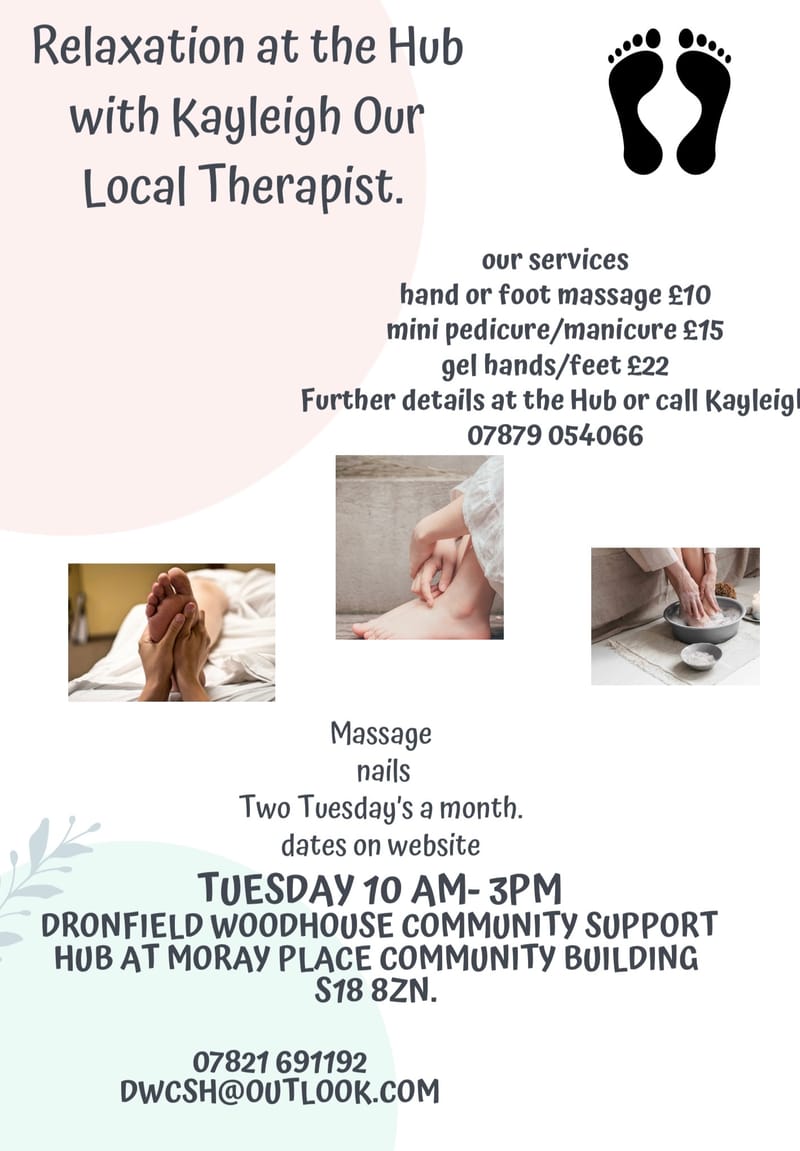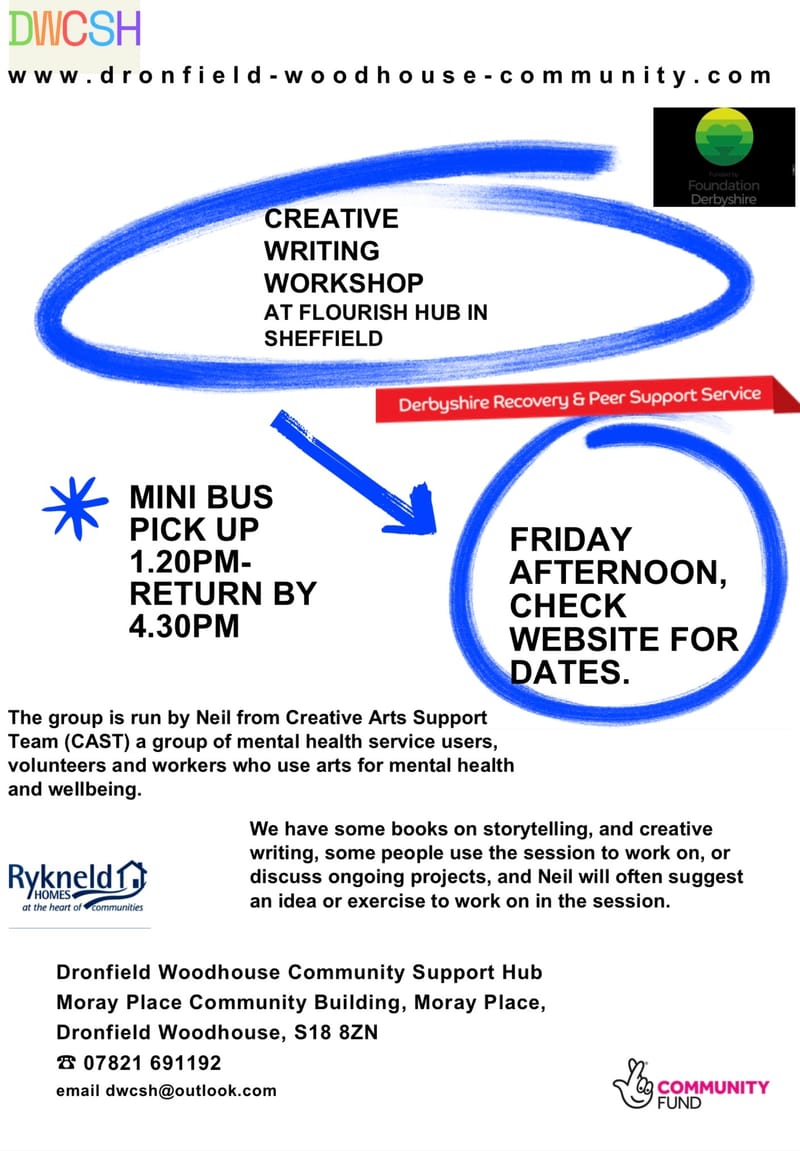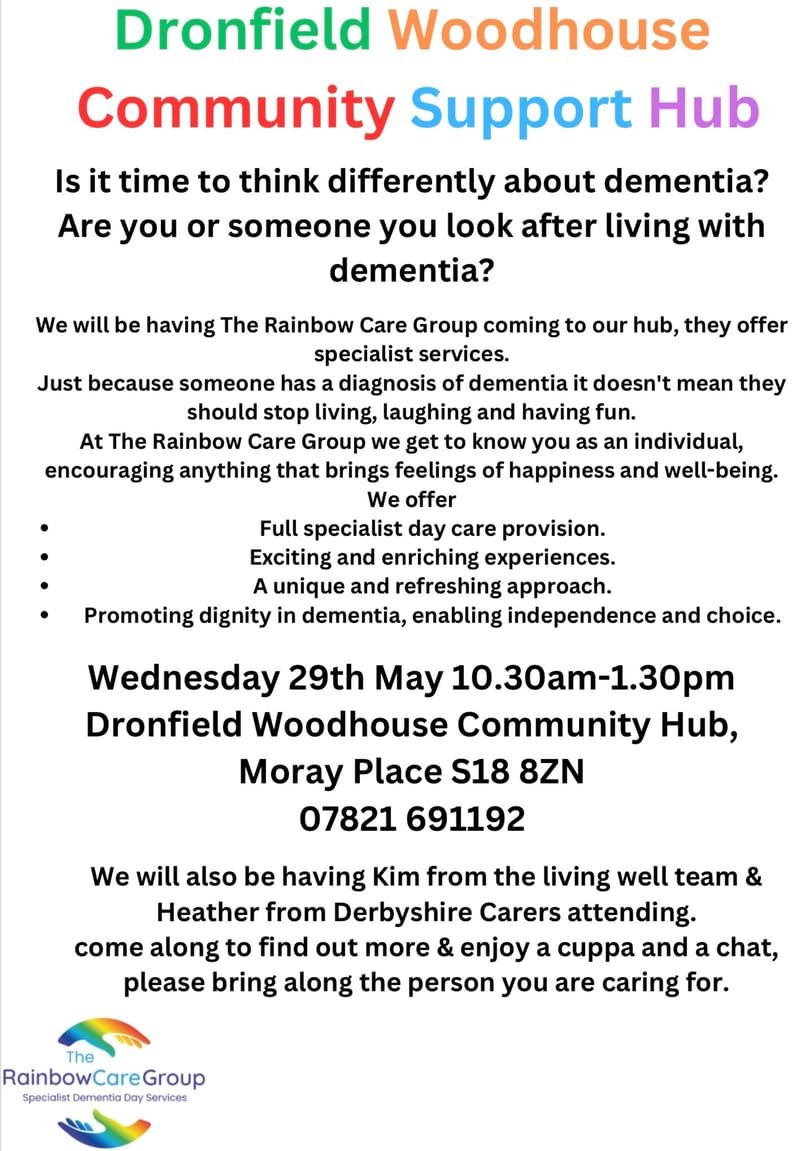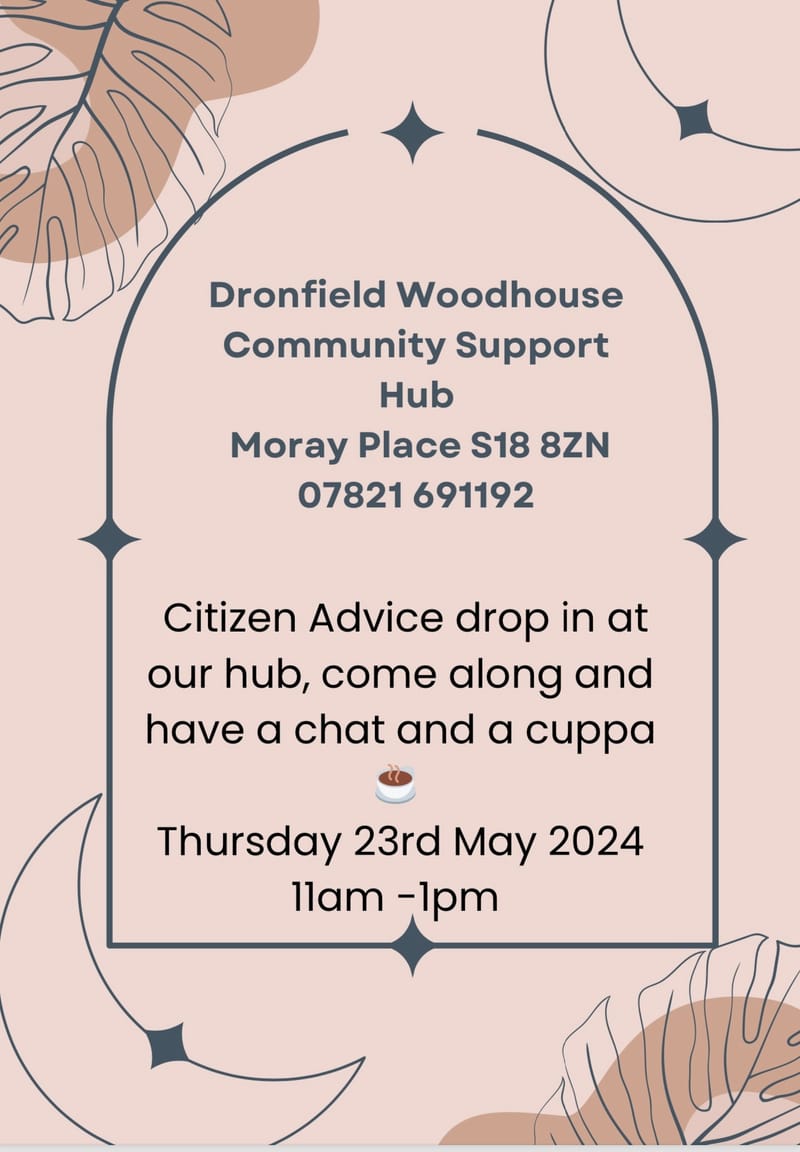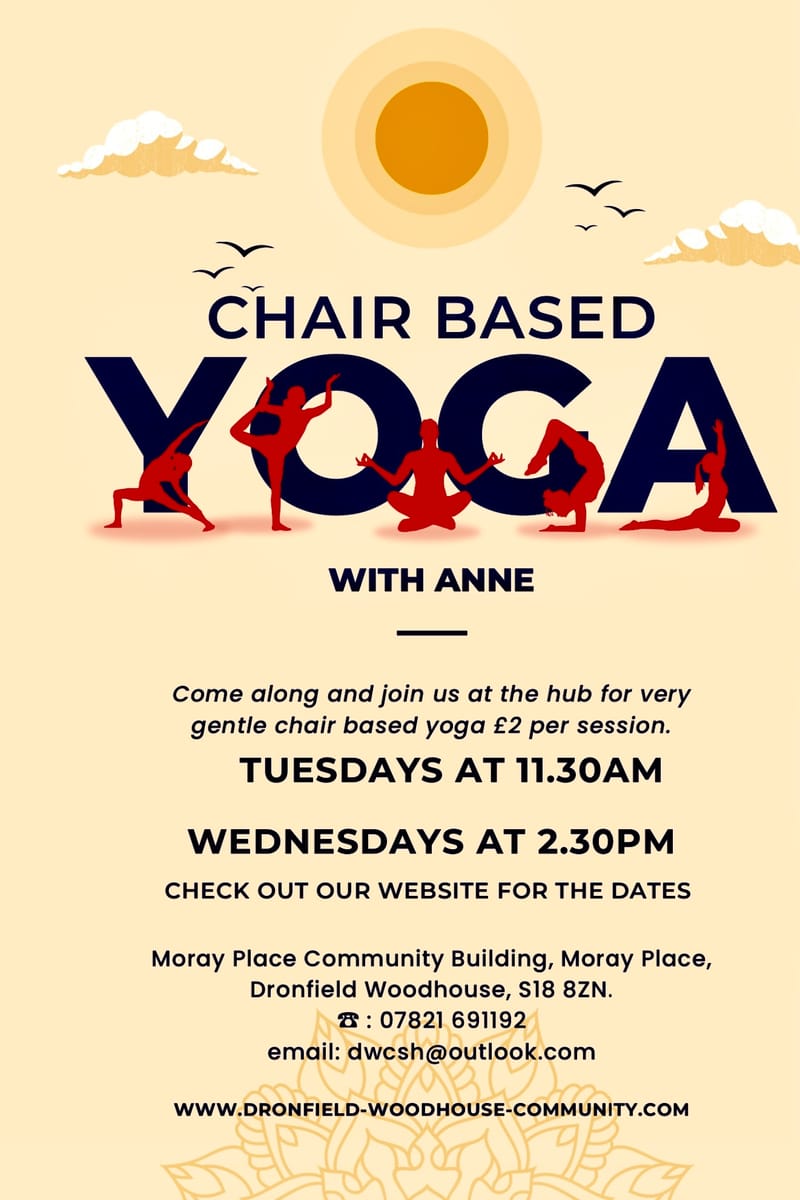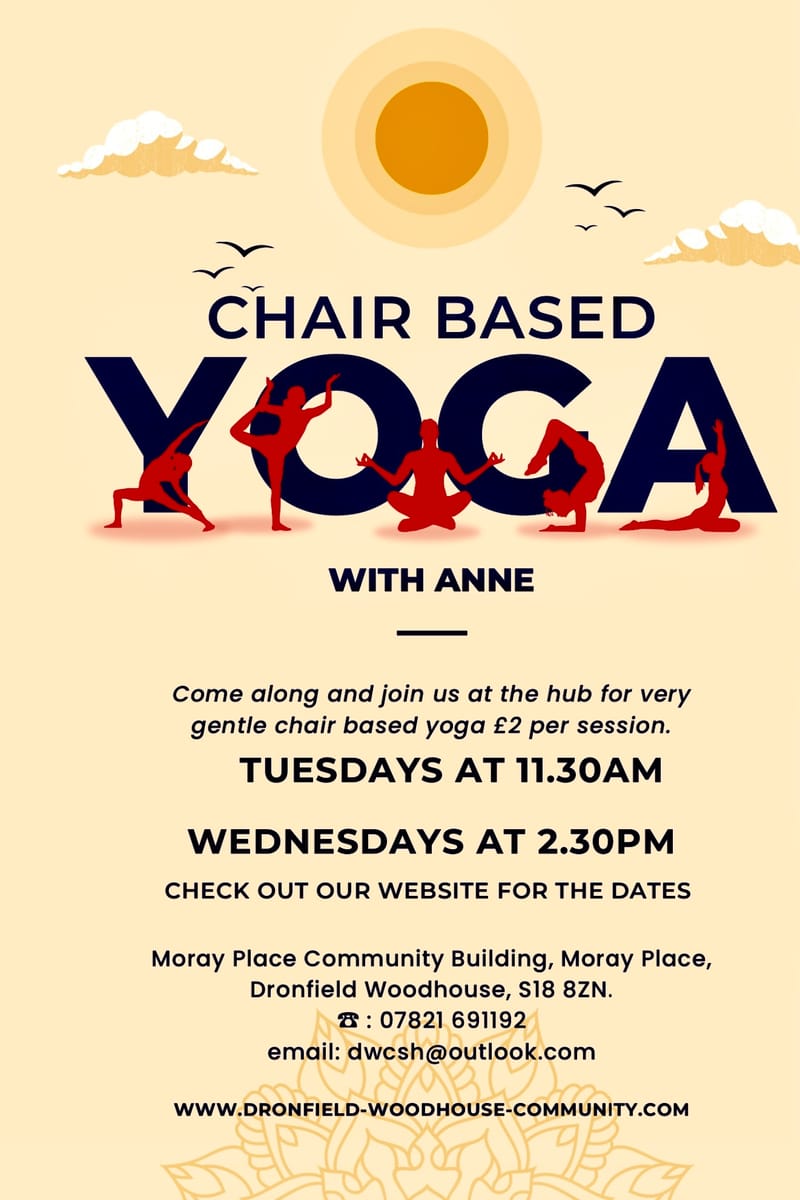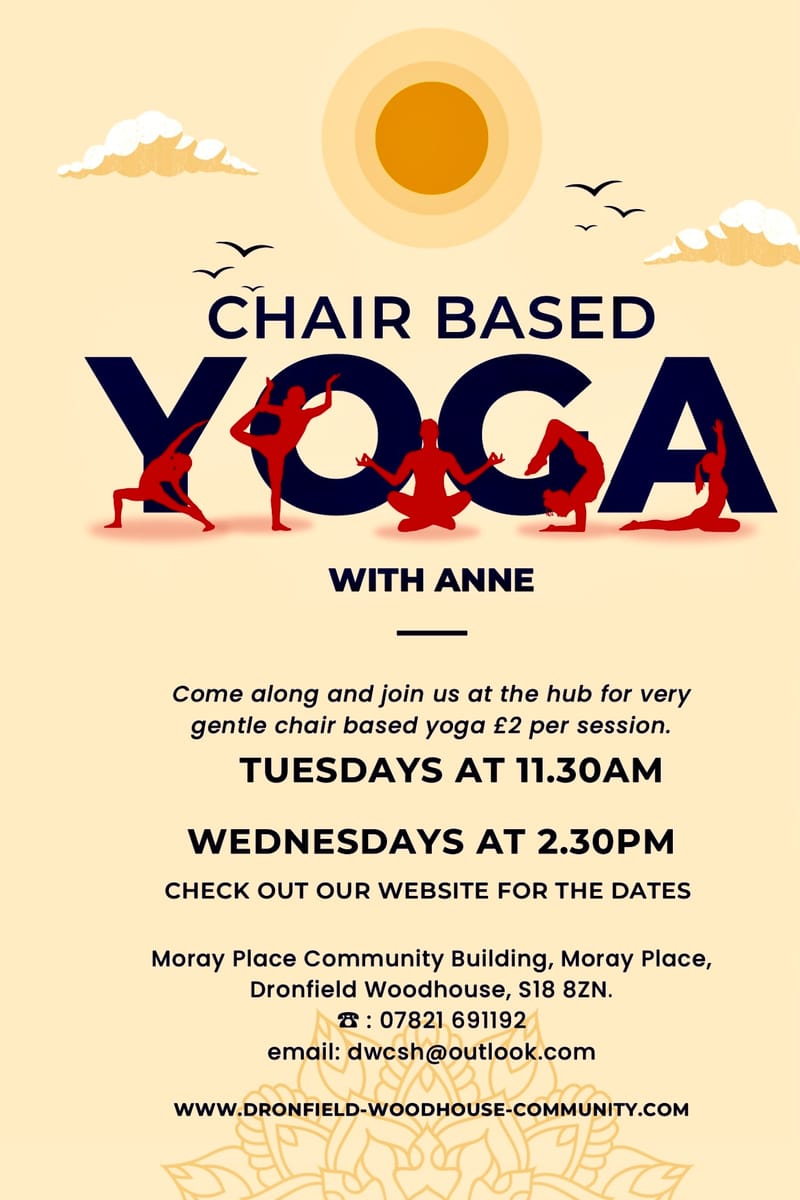My name is Farida and I need support as much as any one and recognise that in others to and have a passion to make sure people don't find themselves isolated in their own community. As a founder member and someone with lived experience of mental health I feel passionately that the group is able to support others as well as myself and other volunteers. First Signatory.
The Change Starts With You
Make A Difference In Your Community Today
Hub dates and times
Our meetings take place on the following dates:
Loneliness Well-being group
Every Monday 10:30am to 1:00pm
Wellbeing Support Group
Every Thursday 10:30am to 1:00pm
We close the hub on the last Thursday of the month and take public transport to visit markets and share a meal together.
Feel free to join our Facebook page
https://m.facebook.com/groups/509374167608128/?ref=share
Therapy treatments with Kayleigh
last Tuesday Of The Month (charges apply )
pre- booked only 9am - 4pm
Dronfield Woodhouse Rocks Facebook Page (post your pictures on this site )
https://m.facebook.com/groups/1539452257028998/?ref=share
We have a just giving page for anyone to donate to keep our hub running, thanks
https://www.justgiving.com/crowdfunding/farida-mcgann-3?utm_medium=CR&utm_source=CL
We have gentle chair based exercises 1st and last Monday of the month 1.15-2.15
Check the date below (starting May 2025)
Services Offered - Signposting, see below under Signposting for Examples.
Events
Choice Support's Public Engagement Network (PEN) is made up of charities and community groups who represent diverse communities and people with protected characteristics. Our members are located across England. We work to ensure that people at risk of experiencing health inequalities can be heard by the Care Quality Commission (CQC), England's independent health and adult social care regulator. The feedback on health and social care we receive is used to inform CQC's work, and our continuous engagement means you'll be kept up-to-date on how it has been used.
Pop along for a free wellbeing session including Blood Pressure checks, health and wellbeing advice and other information from Live Life Better Derbyshire.
Citizen Advice drop in at our hub, come along and have a chat
Massage from £25 Facials from £28 Manicure/Pedicures from £18 Gel hands or feet from £25 Further details at the Hub or call Kayleigh 07879 054066 deposits are taken a time of booking
Massage from £25 Facials from £28 Manicure/Pedicures from £18 Gel hands or feet from £25 Further details at the Hub or call Kayleigh 07879 054066 deposits are taken a time of booking
Massage from £25 Facials from £28 Manicure/Pedicures from £18 Gel hands or feet from £25 Further details at the Hub or call Kayleigh 07879 054066 deposits are taken a time of booking
Massage from £25 Facials from £28 Manicure/Pedicures from £18 Gel hands or feet from £25 Further details at the Hub or call Kayleigh 07879 054066 deposits are taken a time of booking
Massage from £25 Facials from £28 Manicure/Pedicures from £18 Gel hands or feet from £25 Further details at the Hub or call Kayleigh 07879 054066 deposits are taken a time of booking
Massage from £25 Facials from £28 Manicure/Pedicures from £18 Gel hands or feet from £25 Further details at the Hub or call Kayleigh 07879 054066 deposits are taken a time of booking
Massage from £25 Facials from £28 Manicure/Pedicures from £18 Gel hands or feet from £25 Further details at the Hub or call Kayleigh 07879 054066 deposits are taken a time of booking
Massage from £25 Facials from £28 Manicure/Pedicures from £18 Gel hands or feet from £25 Further details at the Hub or call Kayleigh 07879 054066 deposits are taken a time of booking
Massage from £25 Facials from £28 Manicure/Pedicures from £18 Gel hands or feet from £25 Further details at the Hub or call Kayleigh 07879 054066 deposits are taken a time of booking
Massage from £25 Facials from £28 Manicure/Pedicures from £18 Gel hands or feet from £25 Further details at the Hub or call Kayleigh 07879 054066 deposits are taken a time of booking
Massage from £25 Facials from £28 Manicure/Pedicures from £18 Gel hands or feet from £25 Further details at the Hub or call Kayleigh 07879 054066 deposits are taken a time of booking
Massage from £25 Facials from £28 Manicure/Pedicures from £18 Gel hands or feet from £25 Further details at the Hub or call Kayleigh 07879 054066 deposits are taken a time of booking
Pop along for a free wellbeing session including Blood Pressure checks, health and wellbeing advice and other information from Live Life Better Derbyshire.
Derbyshire Time Swap brings local people together, using their knowledge, skills, and most importantly, time, to support each other. From walking someone's dog to learning a language - the possibilities are endless. What's unique about Time Swap is that every member's time is equal: for every hour you give to help someone else, you receive an hour to spend. Time Swap is flexible as you only offer or accept swaps you want to do, when you want to do them. Then, as you earn your hours you can spend, save, or donate them to the community pot for people in need to use. IF YOU WANT TO SIGN UP OR LEARN MORE, GET IN TOUCH TODAY!
We will be meeting at the hub at 1pm and the coach will take us to Sheffield and after the pantomime the coach will pick us back up for 5.30pm and we should be back to the hub for 6pm £5 deposit is required, which will be refunded on the day when you are on the coach. The Rotary Club Of Dronfield have paid for the coach and all the tickets.
We will close at 1pm on 18th December and re-open on Monday 12th January 2026 Have a great Christmas and New Year all x
Massage from £10 Facials from £25 Manicure/Pedicures from £15 Gel hands or feet from £22 Further details at the Hub or call Kayleigh 07879 054066 deposits are taken a time of booking
Come along to see our Carer Support Worker Pamela Williams who will be dropping by at Dronfield Community Woodhouse
Come along and make you own wreath from all natural trimmings, we have limited spaces so get your name down quick £5 donation for your wreath. Fully booked
Citizen Advice drop in at our hub, come along and have a chat
Our Christmas celebration with hub members at the Angel £5 deposit, pre order food at the hub and pay the rest on the day.
The hub will be closed on the last Thursday of the month so we can go to chesterfield by bus to enjoy the local market and a meal together. Please let us know if you want to attend. ( you must be able to walk by yourself unless you bring a carer with you )
Massage from £10 Facials from £25 Manicure/Pedicures from £15 Gel hands or feet from £22 Further details at the Hub or call Kayleigh 07879 054066 deposits are taken a time of booking
Pop along for a free wellbeing session including Blood Pressure checks, health and wellbeing advice and other information from Live Life Better Derbyshire.
The hub will be closed on the last Thursday of the month so we can go to chesterfield by bus to enjoy the local market and a meal together. Please let us know if you want to attend. ( you must be able to walk by yourself unless you bring a carer with you )
Massage from £10 Facials from £25 Manicure/Pedicures from £15 Gel hands or feet from £22 Further details at the Hub or call Kayleigh 07879 054066 deposits are taken a time of booking
Citizen Advice drop in at our hub, come along and have a chat
Derbyshire Hard of Hearing Service provides Support, Information, Advice and Guidance on all aspects of hearing impairment for individuals, families and friends across Derbyshire We carry out assessments for assistive hearing equipment.
Derbyshire Time Swap brings local people together, using their knowledge, skills, and most importantly, time, to support each other. From walking someone's dog to learning a language - the possibilities are endless. What's unique about Time Swap is that every member's time is equal: for every hour you give to help someone else, you receive an hour to spend. Time Swap is flexible as you only offer or accept swaps you want to do, when you want to do them. Then, as you earn your hours you can spend, save, or donate them to the community pot for people in need to use. IF YOU WANT TO SIGN UP OR LEARN MORE, GET IN TOUCH TODAY!
These are gentle chair based exercises and stretches to strengthen your core, and to also help you if you struggle to get off the floor or up from a fall. You need to be on an our register so pop in before May if you want to take part. £4 per session - cash only
Pop along for a free wellbeing session including Blood Pressure checks, health and wellbeing advice and other information from Live Life Better Derbyshire.
Massage from £10 Facials from £25 Manicure/Pedicures from £15 Gel hands or feet from £22 Further details at the Hub or call Kayleigh 07879 054066 deposits are taken a time of booking
Alison will be giving a talk and chatting with you about utility warehouse
These are gentle chair based exercises and stretches to strengthen your core, and to also help you if you struggle to get off the floor or up from a fall. You need to be on an our register so pop in before May if you want to take part. £4 per session - cash only
The hub will be closed on the last Thursday of the month so we can go to chesterfield by bus to enjoy the local market and a meal together. Please let us know if you want to attend. ( you must be able to walk by yourself unless you bring a carer with you )
Derbyshire Hard of Hearing Service provides Support, Information, Advice and Guidance on all aspects of hearing impairment for individuals, families and friends across Derbyshire We carry out assessments for assistive hearing equipment.
Derbyshire Time Swap brings local people together, using their knowledge, skills, and most importantly, time, to support each other. From walking someone's dog to learning a language - the possibilities are endless. What's unique about Time Swap is that every member's time is equal: for every hour you give to help someone else, you receive an hour to spend. Time Swap is flexible as you only offer or accept swaps you want to do, when you want to do them. Then, as you earn your hours you can spend, save, or donate them to the community pot for people in need to use. IF YOU WANT TO SIGN UP OR LEARN MORE, GET IN TOUCH TODAY!
Choice Support's Public Engagement Network (PEN) is made up of charities and community groups who represent diverse communities and people with protected characteristics. Our members are located across England. We work to ensure that people at risk of experiencing health inequalities can be heard by the Care Quality Commission (CQC), England's independent health and adult social care regulator. The feedback on health and social care we receive is used to inform CQC's work, and our continuous engagement means you'll be kept up-to-date on how it has been used.
These are gentle chair based exercises and stretches to strengthen your core, and to also help you if you struggle to get off the floor or up from a fall. You need to be on an our register so pop in before May if you want to take part. £4 per session - cash only
The hub will be closed on the last Thursday of the month so we can go to chesterfield by bus to enjoy the local market and a meal together. Please let us know if you want to attend. ( you must be able to walk by yourself unless you bring a carer with you )
These are gentle chair based exercises and stretches to strengthen your core, and to also help you if you struggle to get off the floor or up from a fall. You need to be on an our register so pop in before May if you want to take part. £4 per session - cash only
Massage from £10 Facials from £25 Manicure/Pedicures from £15 Gel hands or feet from £22 Further details at the Hub or call Kayleigh 07879 054066 deposits are taken a time of booking
Come along to see our Carer Support Worker Pamela Williams who will be dropping by at Dronfield Community Woodhouse
Derbyshire Hard of Hearing Service provides Support, Information, Advice and Guidance on all aspects of hearing impairment for individuals, families and friends across Derbyshire We carry out assessments for assistive hearing equipment.
Pop along for a free wellbeing session including Blood Pressure checks, health and wellbeing advice and other information from Live Life Better Derbyshire.
These are gentle chair based exercises and stretches to strengthen your core, and to also help you if you struggle to get off the floor or up from a fall. You need to be on an our register so pop in before May if you want to take part. £4 per session - cash only
Come along and celebrate our 3rd year of running the hub April will be along to sing also £5 deposit to be paid upfront
The hub will be closed on the last Thursday of the month so we can go to chesterfield by bus to enjoy the local market and a meal together. Please let us know if you want to attend. ( you must be able to walk by yourself unless you bring a carer with you )
Massage from £10 Facials from £25 Manicure/Pedicures from £15 Gel hands or feet from £22 Further details at the Hub or call Kayleigh 07879 054066 deposits are taken a time of booking
These are gentle chair based exercises and stretches to strengthen your core, and to also help you if you struggle to get off the floor or up from a fall. You need to be on an our register so pop in before May if you want to take part. £4 per session - cash only
Derbyshire Time Swap brings local people together, using their knowledge, skills, and most importantly, time, to support each other. From walking someone's dog to learning a language - the possibilities are endless. What's unique about Time Swap is that every member's time is equal: for every hour you give to help someone else, you receive an hour to spend. Time Swap is flexible as you only offer or accept swaps you want to do, when you want to do them. Then, as you earn your hours you can spend, save, or donate them to the community pot for people in need to use. IF YOU WANT TO SIGN UP OR LEARN MORE, GET IN TOUCH TODAY!
Join Clinical Hypnotherapist Farah-Naz Khan for an engaging, down-to-earth talk exploring how our brains work, how stress affects sleep, and what we can do to support calm, clarity and balance in everyday life. Discover the basics of neuroscience in a clear, accessible way, with practical insights into how sleep restores the body and mind—and why it often goes wrong. Farah offers a modern, solution-focused approach using hypnotherapy and psychotherapy for adults, teens and children. Her sessions are designed to help people feel calmer, more in control, and ready to move forward—whether they’re managing anxiety, low confidence, overwhelm or just seeking more balance. Farah trained at the Clifton Practice Hypnotherapy Training School (CPHT), considered the gold standard in Clinical Hypnotherapy. She holds a Hypnotherapy Practitioner Diploma (HPD), a Diploma in Solution Focused Hypnotherapy (DSFH), and is currently pursuing her Advanced Hypnotherapy Diploma (AHD). She is a registered member of the CNHC and NCH and sees clients face-to-face in Sheffield or online across the UK. http://www.interludehypnotherapysheffield.com/ 07988 912 825
Derbyshire Hard of Hearing Service provides Support, Information, Advice and Guidance on all aspects of hearing impairment for individuals, families and friends across Derbyshire We carry out assessments for assistive hearing equipment.
So sorry for the inconvenience
The hub will be closed on the last Thursday of the month so we can go to chesterfield by bus to enjoy the local market and a meal together. Please let us know if you want to attend. ( you must be able to walk by yourself unless you bring a carer with you )
Massage from £10 Facials from £25 Manicure/Pedicures from £15 Gel hands or feet from £22 Further details at the Hub or call Kayleigh 07879 054066 deposits are taken a time of booking
charity focussing on supporting people living with fuel poverty, we understand the detrimental impacts this causes. Making front line workers aware of the advice and support we offer is instrumental in reaching as many people as possible.
Derbyshire Time Swap brings local people together, using their knowledge, skills, and most importantly, time, to support each other. From walking someone's dog to learning a language - the possibilities are endless. What's unique about Time Swap is that every member's time is equal: for every hour you give to help someone else, you receive an hour to spend. Time Swap is flexible as you only offer or accept swaps you want to do, when you want to do them. Then, as you earn your hours you can spend, save, or donate them to the community pot for people in need to use. IF YOU WANT TO SIGN UP OR LEARN MORE, GET IN TOUCH TODAY!
Citizen Advice drop in at our hub, come along and have a chat
Derbyshire Hard of Hearing Service provides Support, Information, Advice and Guidance on all aspects of hearing impairment for individuals, families and friends across Derbyshire We carry out assessments for assistive hearing equipment.
These are gentle chair based exercises and stretches to strengthen your core, and to also help you if you struggle to get off the floor or up from a fall. You need to be on an our register so pop in before May if you want to take part. £4 per session - cash only
Pop along for a free wellbeing session including Blood Pressure checks, health and wellbeing advice and other information from Live Life Better Derbyshire.
Cash only table top sale, buy cakes, jewellery, paper flowers and arrangements Worth charity, crafting2gether and beautiful made resin gifts from week’ in willows. Help raise funds for our community hub and some great local charities and small businesses.
The hub will be closed on the last Thursday of the month so we can go to chesterfield by bus to enjoy the local market and a meal together. Please let us know if you want to attend. ( you must be able to walk by yourself unless you bring a carer with you )
Massage from £10 Facials from £25 Manicure/Pedicures from £15 Gel hands or feet from £22 Further details at the Hub or call Kayleigh 07879 054066 deposits are taken a time of booking
These are gentle chair based exercises and stretches to strengthen your core, and to also help you if you struggle to get off the floor or up from a fall. You need to be on an our register so pop in before May if you want to take part. £4 per session - cash only
Come along for a chat with Jason about any advice you need about WiFi, laptops, computers, mobiles ect
Choice Support's Public Engagement Network (PEN) is made up of charities and community groups who represent diverse communities and people with protected characteristics. Our members are located across England. We work to ensure that people at risk of experiencing health inequalities can be heard by the Care Quality Commission (CQC), England's independent health and adult social care regulator. The feedback on health and social care we receive is used to inform CQC's work, and our continuous engagement means you'll be kept up-to-date on how it has been used.
Massage from £10 Facials from £25 Manicure/Pedicures from £15 Gel hands or feet from £22 Further details at the Hub or call Kayleigh 07879 054066 deposits are taken a time of booking
We will need £5 deposit asap if you want to come to the meal in May 2025. The hub will be open in the morning.
Derbyshire Hard of Hearing Service provides Support, Information, Advice and Guidance on all aspects of hearing impairment for individuals, families and friends across Derbyshire We carry out assessments for assistive hearing equipment.
Come along to see our Carer Support Worker Pamela Williams who will be dropping by at Dronfield Community Woodhouse
These are gentle chair based exercises and stretches to strengthen your core, and to also help you if you struggle to get off the floor or up from a fall. You need to be on an our register so pop in before May if you want to take part. £4 per session -cash only
Massage from £10 Facials from £25 Manicure/Pedicures from £15 Gel hands or feet from £22 Further details at the Hub or call Kayleigh 07879 054066 deposits are taken a time of booking
If you are over 65 years old you may be missing out on financial and practical help.
The hub will be closed on the last Thursday of the month so we can go to chesterfield by bus to enjoy the local market and a meal together. Please let us know if you want to attend. ( you must be able to walk by yourself unless you bring a carer with you )
Pop along for a free wellbeing session including Blood Pressure checks, health and wellbeing advice and other information from Live Life Better Derbyshire.
We’re a charity and social enterprise, made up of passionate people, who care about people. We run a variety of services all across the UK, that aim to give everyone the chance to be part of the community they live in and feel connected to society. We think that everyone is unique, and with support and confidence can unlock their inner potential, opening up a world of possibilities. Oh, and did we mention that we love people?
Pre-booked only massage taster session with Kayleigh
Derbyshire Time Swap brings local people together, using their knowledge, skills, and most importantly, time, to support each other. From walking someone's dog to learning a language - the possibilities are endless. What's unique about Time Swap is that every member's time is equal: for every hour you give to help someone else, you receive an hour to spend. Time Swap is flexible as you only offer or accept swaps you want to do, when you want to do them. Then, as you earn your hours you can spend, save, or donate them to the community pot for people in need to use. IF YOU WANT TO SIGN UP OR LEARN MORE, GET IN TOUCH TODAY!
Pop along for a free wellbeing session including Blood Pressure checks, health and wellbeing advice and other information from Live Life Better Derbyshire.
The hub will be closed on the last Thursday of the month so we can go to chesterfield by bus to enjoy the local market and a meal together. Please let us know if you want to attend. ( you must be able to walk by yourself unless you bring a carer with you )
Massage from £10 Facials from £25 Manicure/Pedicures from £15 Gel hands or feet from £22 Further details at the Hub or call Kayleigh 07879 054066 deposits are taken a time of booking
We’re a charity and social enterprise, made up of passionate people, who care about people. We run a variety of services all across the UK, that aim to give everyone the chance to be part of the community they live in and feel connected to society. We think that everyone is unique, and with support and confidence can unlock their inner potential, opening up a world of possibilities. Oh, and did we mention that we love people?
(£15.00 each bracelet materials provided) Deposit required at time of booking
Citizen Advice drop in at our hub, come along and have a chat
The hub will be closed on the last Thursday of the month so we can go to chesterfield by bus to enjoy the local market and a meal together. Please let us know if you want to attend. ( you must be able to walk by yourself unless you bring a carer with you )
Massage from £10 Facials from £25 Manicure/Pedicures from £15 Gel hands or feet from £22 Further details at the Hub or call Kayleigh 07879 054066 deposits are taken a time of booking
If you are over 65 years old you may be missing out on financial and practical help.
Please let me know if you want attend, non refundable deposits will be taken and all meal must be paid for when you attend.
We carry out assessments for assistive hearing equipment such as TV Listeners, Doorbells and Induction loops
Choice Support's Public Engagement Network (PEN) is made up of charities and community groups who represent diverse communities and people with protected characteristics. Our members are located across England. We work to ensure that people at risk of experiencing health inequalities can be heard by the Care Quality Commission (CQC), England's independent health and adult social care regulator. The feedback on health and social care we receive is used to inform CQC's work, and our continuous engagement means you'll be kept up-to-date on how it has been used.
Come along for a 20 minute taster session with Kayleigh Pre booked only
Derbyshire Time Swap brings local people together, using their knowledge, skills, and most importantly, time, to support each other. From walking someone's dog to learning a language - the possibilities are endless. What's unique about Time Swap is that every member's time is equal: for every hour you give to help someone else, you receive an hour to spend. Time Swap is flexible as you only offer or accept swaps you want to do, when you want to do them. Then, as you earn your hours you can spend, save, or donate them to the community pot for people in need to use. IF YOU WANT TO SIGN UP OR LEARN MORE, GET IN TOUCH TODAY!
The hub will be closed on the last Thursday of the month so we can go to chesterfield by bus to enjoy the local market and a meal together. Please let us know if you want to attend. ( you must be able to walk by yourself unless you bring a carer with you )
Massage from £10 Facials from £25 Manicure/Pedicures from £15 Gel hands or feet from £22 Further details at the Hub or call Kayleigh 07879 054066 deposits are taken a time of booking
Come along to see our Carer Support Worker Pamela Williams who will be dropping by at Dronfield Community Woodhouse
Crafts to cheer up the winter blues. Join Multiply to have a go at upcycling old items to create something beautiful while working on your maths skills. Keep anything you make and earn a gift card for taking part. This event is FREE to take part in.
Pop along for a free wellbeing session including Blood Pressure checks, health and wellbeing advice and other information from Live Life Better Derbyshire.
Please note that we open at 10.30am, so please try not to arrive before then, we close at 1pm
We have to many people to do a party at the hub now We will still have our singer April and will still play bingo at the miners arms The food will have to pre ordered and £5 deposit paid FULLY BOOKED Meeting at the pub at 12 and not eating until 1pm then staying after for bingo and raffle and music Again if you can’t make this event please let us know in advance
If you want to attend the theatre please call or email me FULLY BOOKED NOW We are meeting at the theatre for 1.40pm out side the winding wheel If your circumstances have changed and you can’t make it can you please let me know asap.
We are having a longer break this year. We will still be meeting at the winding wheel for Cinderella on 20th and at the miners arms on 23rd. Have a fantastic, safe and enjoyable Christmas 🎄 And a merry new year 🥳 Xx
Relaxation at the Hub with Kayleigh Our Local Therapist. our services hand or foot massage £10 mini pedicure/manicure £15 gel hands/feet £22 Pre-booked appointments only
Please come long and chat with PC flower and Jay from Rykneld as there have been many new ways that people are using to get hold of any bank details and any other details they can use to take money from you.
Please arrive at the coach station in Chesterfield by 8.15 am We will be visiting the Christmas market using Gee Vee travel Tickets are £20 per person and are non- refundable The tickets must be paid for by August 26th as this trip will get booked up very quickly. FULLY BOOKED
There are limited spaces for the event, so get your name down asap FULLY BOOKED NOW £5 Charge
Meet at the hub at 11.25 am. Bring lunch
The hub will be closed as we are out and about visiting the flea market and having lunch together.
Relaxation at the Hub with Kayleigh Our Local Therapist. our services hand or foot massage £10 mini pedicure/manicure £15 gel hands/feet £22 Pre-booked appointments only
Come along and chat with Phoebe and have a cuppa too .
This chair based exercise has a musical theme, come along and learn all the moves with Emma & Becky from Enriching Communities CIC. £2 per session.
Reiki is a Japanese word meaning Universal life force, an energy that is all around us and that runs through every living being. Reiki heals the body holistically, meaning it helps to heal on a physical, mental and emotional level. This is achieved by channelling Reiki healing energy from the universe to the recipient via my hands, Sue.
Please arrive at 11.15 am £2 donation please
Reiki is a Japanese word meaning Universal life force, an energy that is all around us and that runs through every living being. Reiki heals the body holistically, meaning it helps to heal on a physical, mental and emotional level. This is achieved by channelling Reiki healing energy from the universe to the recipient via my hands, Sue.
This chair based exercise has a musical theme, come along and learn all the moves with Emma & Becky from Enriching Communities CIC. £2 per session.
Please arrive at 2.15 pm £2 donation please
Reiki is a Japanese word meaning Universal life force, an energy that is all around us and that runs through every living being. Reiki heals the body holistically, meaning it helps to heal on a physical, mental and emotional level. This is achieved by channelling Reiki healing energy from the universe to the recipient via my hands, Sue.
The hub will be closed as we are out and about visiting the flea market and having lunch together.
Relaxation at the Hub with Kayleigh Our Local Therapist. our services hand or foot massage £10 mini pedicure/manicure £15 gel hands/feet £22 Pre-booked appointments only
Please arrive at 2.15 pm £2 donation please
This chair based exercise has a musical theme, come along and learn all the moves with Emma & Becky from Enriching Communities CIC. £2 per session.
Reiki is a Japanese word meaning Universal life force, an energy that is all around us and that runs through every living being. Reiki heals the body holistically, meaning it helps to heal on a physical, mental and emotional level. This is achieved by channelling Reiki healing energy from the universe to the recipient via my hands, Sue.
Please arrive at 11.15 am £2 donation please
If you want to join us on the hub meal you need to email or call me as your name needs to be on the list so we can manage the booking
Reiki is a Japanese word meaning Universal life force, an energy that is all around us and that runs through every living being. Reiki heals the body holistically, meaning it helps to heal on a physical, mental and emotional level. This is achieved by channelling Reiki healing energy from the universe to the recipient via my hands, Sue.
Please arrive at 11.15 am £2 donation please
Reiki is a Japanese word meaning Universal life force, an energy that is all around us and that runs through every living being. Reiki heals the body holistically, meaning it helps to heal on a physical, mental and emotional level. This is achieved by channelling Reiki healing energy from the universe to the recipient via my hands, Sue.
Reiki is a Japanese word meaning Universal life force, an energy that is all around us and that runs through every living being. Reiki heals the body holistically, meaning it helps to heal on a physical, mental and emotional level. This is achieved by channelling Reiki healing energy from the universe to the recipient via my hands, Sue.
The hub will be closed as we are out and about visiting the flea market and having lunch together.
Please arrive at 2.15 pm £2 donation please
Relaxation at the Hub with Kayleigh Our Local Therapist. our services hand or foot massage £10 mini pedicure/manicure £15 gel hands/feet £22 Pre-booked appointments only
Come along and chat with Phoebe for any type of advice
This chair based exercise has a musical theme, come along and learn all the moves with Emma & Becky from Enriching Communities CIC. £2 per session.
Reiki is a Japanese word meaning Universal life force, an energy that is all around us and that runs through every living being. Reiki heals the body holistically, meaning it helps to heal on a physical, mental and emotional level. This is achieved by channelling Reiki healing energy from the universe to the recipient via my hands, Sue.
Please arrive at 11.15 am £2 donation please
Reiki is a Japanese word meaning Universal life force, an energy that is all around us and that runs through every living being. Reiki heals the body holistically, meaning it helps to heal on a physical, mental and emotional level. This is achieved by channelling Reiki healing energy from the universe to the recipient via my hands, Sue.
Please arrive at 11.15 am £2 donation please
Reiki is a Japanese word meaning Universal life force, an energy that is all around us and that runs through every living being. Reiki heals the body holistically, meaning it helps to heal on a physical, mental and emotional level. This is achieved by channelling Reiki healing energy from the universe to the recipient via my hands, Sue.
This meeting is all about time swap and how it works, come along and see if you can join or want some help
Reiki is a Japanese word meaning Universal life force, an energy that is all around us and that runs through every living being. Reiki heals the body holistically, meaning it helps to heal on a physical, mental and emotional level. This is achieved by channelling Reiki healing energy from the universe to the recipient via my hands, Sue.
The hub will be closed as we are out and about at the seaside
Relaxation at the Hub with Kayleigh Our Local Therapist. our services hand or foot massage £10 mini pedicure/manicure £15 gel hands/feet £22 Pre-booked appointments only
Reiki is a Japanese word meaning Universal life force, an energy that is all around us and that runs through every living being. Reiki heals the body holistically, meaning it helps to heal on a physical, mental and emotional level. This is achieved by channelling Reiki healing energy from the universe to the recipient via my hands, Sue.
Relaxation at the Hub with Kayleigh Our Local Therapist. our services hand or foot massage £10 mini pedicure/manicure £15 gel hands/feet £22 Pre-booked appointments only
Reiki is a Japanese word meaning Universal life force, an energy that is all around us and that runs through every living being. Reiki heals the body holistically, meaning it helps to heal on a physical, mental and emotional level. This is achieved by channelling Reiki healing energy from the universe to the recipient via my hands, Sue.
Reiki is a Japanese word meaning Universal life force, an energy that is all around us and that runs through every living being. Reiki heals the body holistically, meaning it helps to heal on a physical, mental and emotional level. This is achieved by channelling Reiki healing energy from the universe to the recipient via my hands, Sue.
We will be at this event advertising our community hub, come along and support us for a fun day out.
Please arrive at 11.15 am £2 donation please
Reiki is a Japanese word meaning Universal life force, an energy that is all around us and that runs through every living being. Reiki heals the body holistically, meaning it helps to heal on a physical, mental and emotional level. This is achieved by channelling Reiki healing energy from the universe to the recipient via my hands, Sue.
You need to call or email me to book for the meal as we need to know how many are coming This meal is a celebration of our two year of the hub running, as we are not having a party to celebrate this year, so it would be lovely to see you all there Farida
Relaxation at the Hub with Kayleigh Our Local Therapist. our services hand or foot massage £10 mini pedicure/manicure £15 gel hands/feet £22 Pre-booked appointments only
Reiki is a Japanese word meaning Universal life force, an energy that is all around us and that runs through every living being. Reiki heals the body holistically, meaning it helps to heal on a physical, mental and emotional level. This is achieved by channelling Reiki healing energy from the universe to the recipient via my hands, Sue.
The hub will be closed as we are out and about visiting the flea market and having lunch together.
Relaxation at the Hub with Kayleigh Our Local Therapist. our services hand or foot massage £10 mini pedicure/manicure £15 gel hands/feet £22 Pre-booked appointments only
Reiki is a Japanese word meaning Universal life force, an energy that is all around us and that runs through every living being. Reiki heals the body holistically, meaning it helps to heal on a physical, mental and emotional level. This is achieved by channelling Reiki healing energy from the universe to the recipient via my hands, Sue.
Come along and see what help and devices are available from hearing help uk
Please arrive at 11.15 am £2 donation please
This chair based exercise has a musical theme, come along and learn all the moves with Emma & Becky from Enriching Communities CIC. £2 per session.
This meeting is all about time swap and how it works, come along and see if you can join or want some help
The mini bus will pick us up at our hub at 11am and should return by 2.50 back to our hub, we will have plenty of time to look round the flea market and then go into Low Pavement Hub for 12.30, where we can eat our lunch and meet new people for a chat and warm drink.
Please arrive at 2.15 pm £2 donation please
Relaxation at the Hub with Kayleigh Our Local Therapist. our services hand or foot massage £10 mini pedicure/manicure £15 gel hands/feet £22 Pre-booked appointments only
This chair based exercise has a musical theme, come along and learn all the moves with Emma & Becky from Enriching Communities CIC. £2 per session.
The mini bus will be at our hub for 1.15 and the bus will bring us back for 4.30pm approximately. The group is run by Neil from Creative Arts Support Team (CAST) a group of mental health service users, volunteers and workers who use arts for mental health and wellbeing. We have some books on storytelling, and creative writing, some people use the session to work on, or discuss ongoing projects, and Neil will often suggest an idea or exercise to work on in the session.
Please arrive at 11.15am £2 donation please
Please arrive at 2.15 pm £2 donation please
Relaxation at the Hub with Kayleigh Our Local Therapist. our services hand or foot massage £10 mini pedicure/manicure £15 gel hands/feet £22 Pre-booked appointments only
A monthly visit to the inside market at Sheffield, with time for a cuppa and cake. We will be back to our hub around 1.30pm
You need to let us know if you want to attend the meal as it needs to be booked Call or email if you want to attend
This chair based exercise has a musical theme, come along and learn all the moves with Emma & Becky from Enriching Communities CIC. £2 per session.
This meeting is all about time swap and how it works, come along and see if you can join or want some help
The mini bus will pick us up at our hub at 11am and should return by 2.50 back to our hub, we will have plenty of time to look round the flea market and then go into Low Pavement Hub for 12.30, where we can eat our lunch and meet new people for a chat and warm drink.
Relaxation at the Hub with Kayleigh Our Local Therapist. our services hand or foot massage £10 mini pedicure/manicure £15 gel hands/feet £22 Pre-booked appointments only
Come along and chat with Phoebe for any type of advice
The mini bus will be at our hub for 1.15 and the bus will bring us back for 4.30pm approximately. The group is run by Neil from Creative Arts Support Team (CAST) a group of mental health service users, volunteers and workers who use arts for mental health and wellbeing. We have some books on storytelling, and creative writing, some people use the session to work on, or discuss ongoing projects, and Neil will often suggest an idea or exercise to work on in the session.
Please arrive at 11.15am £2 donation please
This chair based exercise has a musical theme, come along and learn all the moves with Emma & Becky from Enriching Communities CIC. £2 per session.
A monthly visit to the inside market at Sheffield, with time for a cuppa and cake. We will be back to our hub around 1.30pm
The mini bus will be at our hub for 1.15 and the bus will bring us back for 4.30pm approximately. The group is run by Neil from Creative Arts Support Team (CAST) a group of mental health service users, volunteers and workers who use arts for mental health and wellbeing. We have some books on storytelling, and creative writing, some people use the session to work on, or discuss ongoing projects, and Neil will often suggest an idea or exercise to work on in the session.
This meeting is all about time swap and how it works, come along and see if you can join or want some help
This chair based exercise has a musical theme, come along and learn all the moves with Emma & Becky from Enriching Communities CIC. £2 per session.
Please arrive at 2.15 pm £2 donation please
Relaxation at the Hub with Kayleigh Our Local Therapist. our services hand or foot massage £10 mini pedicure/manicure £15 gel hands/feet £22 Pre-booked appointments only
The mini bus will pick us up at our hub at 11am and should return by 2.50 back to our hub, we will have plenty of time to look round the flea market and then go into Low Pavement Hub for 12.30, where we can eat our lunch and meet new people for a chat and warm drink.
The mini bus will be at our hub for 1.15 and the bus will bring us back for 4.30pm approximately. The group is run by Neil from Creative Arts Support Team (CAST) a group of mental health service users, volunteers and workers who use arts for mental health and wellbeing. We have some books on storytelling, and creative writing, some people use the session to work on, or discuss ongoing projects, and Neil will often suggest an idea or exercise to work on in the session.
Please arrive at 11.15am £2 donation please
This chair based exercise has a musical theme, come along and learn all the moves with Emma & Becky from Enriching Communities CIC. £2 per session.
This meeting is all about time swap and how it works, come along and see if you can join or want some help
The mini bus will be at our hub for 1.15 and the bus will bring us back for 4.30pm approximately. The group is run by Neil from Creative Arts Support Team (CAST) a group of mental health service users, volunteers and workers who use arts for mental health and wellbeing. We have some books on storytelling, and creative writing, some people use the session to work on, or discuss ongoing projects, and Neil will often suggest an idea or exercise to work on in the session.
A monthly visit to the inside market at Sheffield, with time for a cuppa and cake. We will be back to our hub around 1.30pm
The mini bus will pick us up at our hub at 11am and should return by 2.50 back to our hub, we will have plenty of time to look round the flea market and then go into Low Pavement Hub for 12.30, where we can eat our lunch and meet new people for a chat and warm drink.
The mini bus will be at our hub for 1.15 and the bus will bring us back for 4.30pm approximately. The group is run by Neil from Creative Arts Support Team (CAST) a group of mental health service users, volunteers and workers who use arts for mental health and wellbeing. We have some books on storytelling, and creative writing, some people use the session to work on, or discuss ongoing projects, and Neil will often suggest an idea or exercise to work on in the session.
Relaxation at the Hub with Kayleigh Our Local Therapist. our services hand or foot massage £10 mini pedicure/manicure £15 gel hands/feet £22 Pre-booked appointments only
This chair based exercise has a musical theme, come along and learn all the moves with Emma & Becky from Enriching Communities CIC. £2 per session.
The mini bus will be at our hub for 1.15 and the bus will bring us back for 4.30pm approximately. The group is run by Neil from Creative Arts Support Team (CAST) a group of mental health service users, volunteers and workers who use arts for mental health and wellbeing. We have some books on storytelling, and creative writing, some people use the session to work on, or discuss ongoing projects, and Neil will often suggest an idea or exercise to work on in the session.
A monthly visit to the inside market at Sheffield, with time for a cuppa and cake. We will be back to our hub around 1.30pm
This chair based exercise has a musical theme, come along and learn all the moves with Emma & Becky from Enriching Communities CIC. £2 per session.
This meeting is all about time swap and how it works, come along and see if you can join or want some help
The mini bus will pick us up at our hub at 11am and should return by 2.50 back to our hub, we will have plenty of time to look round the flea market and then go into Low Pavement Hub for 12.30, where we can eat our lunch and meet new people for a chat and warm drink.
Relaxation at the Hub with Kayleigh Our Local Therapist. our services hand or foot massage £10 mini pedicure/manicure £15 gel hands/feet £22 Pre-booked appointments only
The mini bus will be at our hub for 1.15 and the bus will bring us back for 4.30pm approximately. The group is run by Neil from Creative Arts Support Team (CAST) a group of mental health service users, volunteers and workers who use arts for mental health and wellbeing. We have some books on storytelling, and creative writing, some people use the session to work on, or discuss ongoing projects, and Neil will often suggest an idea or exercise to work on in the session.
A monthly visit to the inside market at Sheffield, with time for a cuppa and cake. We will be back to our hub around 1.30pm
This meeting is all about time swap and how it works, come along and see if you can join or want some help
This chair based exercise has a musical theme, come along and learn all the moves with Emma & Becky from Enriching Communities CIC. £2 per session.
The mini bus will be at our hub for 1.15 and the bus will bring us back for 4.30pm approximately. The group is run by Neil from Creative Arts Support Team (CAST) a group of mental health service users, volunteers and workers who use arts for mental health and wellbeing. We have some books on storytelling, and creative writing, some people use the session to work on, or discuss ongoing projects, and Neil will often suggest an idea or exercise to work on in the session.
Relaxation at the Hub with Kayleigh Our Local Therapist. our services hand or foot massage £10 mini pedicure/manicure £15 gel hands/feet £22 Pre-booked appointments only
The mini bus will pick us up at our hub at 11am and should return by 2.50 back to our hub, we will have plenty of time to look round the flea market and then go into Low Pavement Hub for 12.30, where we can eat our lunch and meet new people for a chat and warm drink.
This chair based exercise has a musical theme, come along and learn all the moves with Emma & Becky from Enriching Communities CIC. £2 per session.
The mini bus will be at our hub for 1.15 and the bus will bring us back for 4.30pm approximately. The group is run by Neil from Creative Arts Support Team (CAST) a group of mental health service users, volunteers and workers who use arts for mental health and wellbeing. We have some books on storytelling, and creative writing, some people use the session to work on, or discuss ongoing projects, and Neil will often suggest an idea or exercise to work on in the session.
Join us for our Christmas meal at Toby’s
Relaxation at the Hub with Kayleigh Our Local Therapist. our services hand or foot massage £10 mini pedicure/manicure £15 gel hands/feet £22 Pre-booked appointments only
This chair based exercise has a musical theme, come along and learn all the moves with Emma & Becky from Enriching Communities CIC. £2 per session.
The mini bus will be at our hub for 1.15 and the bus will bring us back for 4.30pm approximately. The group is run by Neil from Creative Arts Support Team (CAST) a group of mental health service users, volunteers and workers who use arts for mental health and wellbeing. We have some books on storytelling, and creative writing, some people use the session to work on, or discuss ongoing projects, and Neil will often suggest an idea or exercise to work on in the session.
Come along and join us for chair based yoga with Anne, please arrive at 2.20pm £2 per session.
We will be leaving by minibus at 11.30am, so please arrive at 11.20am and we should be back for 1.45pm approximately Some of the stall holders only take cash.
This is now fully booked We will be seeing Christmas Carol at the Old Vic Theatre in London, those who are coming need to bring a packed lunch.
This meeting is all about time swap and how it works, come along and see if you can join or want some help
Come along and join us for our wreath making with Mel Please donate £2
The mini bus will pick us up at our hub at 11am and should return by 2.50 back to our hub, we will have plenty of time to look round the flea market and then go into Low Pavement Hub for 12.30, where we can eat our lunch and meet new people for a chat and warm drink.
The mini bus will be at our hub for 1.15 and the bus will bring us back for 4.30pm approximately. The group is run by Neil from Creative Arts Support Team (CAST) a group of mental health service users, volunteers and workers who use arts for mental health and wellbeing. We have some books on storytelling, and creative writing, some people use the session to work on, or discuss ongoing projects, and Neil will often suggest an idea or exercise to work on in the session.
Relaxation at the Hub with Kayleigh Our Local Therapist. our services hand or foot massage £10 mini pedicure/manicure £15 gel hands/feet £22 Pre-booked appointments only
Come along and join us for chair based yoga with Anne, please arrive at 2.20pm £2 per session.
The mini bus will be at our hub for 1.15 and the bus will bring us back for 4.30pm approximately. The group is run by Neil from Creative Arts Support Team (CAST) a group of mental health service users, volunteers and workers who use arts for mental health and wellbeing. We have some books on storytelling, and creative writing, some people use the session to work on, or discuss ongoing projects, and Neil will often suggest an idea or exercise to work on in the session.
Come along and join us for chair based yoga with Anne, please arrive at 11.20 am £2 per session.
We will be leaving by minibus at 11.30am, so please arrive at 11.20am and we should be back for 1.45pm approximately Some of the stall holders only take cash.
This chair based exercise has a musical theme, come along and learn all the moves with Emma & Becky from Enriching Communities CIC. £2 per session.
Come along and join us for chair based yoga with Anne, please arrive at 2.20pm £2 per session.
This meeting is all about time swap and how it works, come along and see if you can join or want some help
Relaxation at the Hub with Kayleigh Our Local Therapist. our services hand or foot massage £10 mini pedicure/manicure £15 gel hands/feet £22 Pre-booked appointments only
Come along and join us for chair based yoga with Anne, please arrive at 2.20pm £2 per session.
The mini bus will be at our hub for 1.15 and the bus will bring us back for 4.30pm approximately. The group is run by Neil from Creative Arts Support Team (CAST) a group of mental health service users, volunteers and workers who use arts for mental health and wellbeing. We have some books on storytelling, and creative writing, some people use the session to work on, or discuss ongoing projects, and Neil will often suggest an idea or exercise to work on in the session.
Come along and join us for chair based yoga with Anne, please arrive at 2.20pm £2 per session.
We will be leaving by minibus at 11.30am, so please arrive at 11.20am and we should be back for 1.45pm approximately Some of the stall holders only take cash.
This chair based exercise has a musical theme, come along and learn all the moves with Emma & Becky from Enriching Communities CIC. £2 per session.
The mini bus will be at our hub for 1.15 and the bus will bring us back for 4.30pm approximately. The group is run by Neil from Creative Arts Support Team (CAST) a group of mental health service users, volunteers and workers who use arts for mental health and wellbeing. We have some books on storytelling, and creative writing, some people use the session to work on, or discuss ongoing projects, and Neil will often suggest an idea or exercise to work on in the session.
This meeting is all about time swap and how it works, come along and see if you can join or want some help
Why is our talk free? Our Purpose of ‘Championing a better way of doing business for you and your communities’ encourages us to think of ways we can help members of our local community, and we’ve found providing information and advice on later life issues by talking to groups like yours has been extremely well received. Whilst our message is serious, our delivery is informal, humorous and delivered in plain English, and so we don’t charge a fee for our talk. Oliver Protecting your family’s nest egg Inheritance tax Stopping ‘sideways disinheritance‘ Lasting Powers of Attorney
The mini bus will pick us up at our hub at 11am and should return by 2.50 back to our hub, we will have plenty of time to look round the flea market and then go into Low Pavement Hub for 12.30, where we can eat our lunch and meet new people for a chat and warm drink.
Relaxation at the Hub with Kayleigh Our Local Therapist. our services hand or foot massage £10 mini pedicure/manicure £15 gel hands/feet £22 Pre-booked appointments only
The mini bus will be at our hub for 1.15 and the bus will bring us back for 4.30pm approximately. The group is run by Neil from Creative Arts Support Team (CAST) a group of mental health service users, volunteers and workers who use arts for mental health and wellbeing. We have some books on storytelling, and creative writing, some people use the session to work on, or discuss ongoing projects, and Neil will often suggest an idea or exercise to work on in the session.
Come along and join us for chair based yoga with Anne, please arrive at 11.20 am £2 per session.
Chair based yoga with Anne Please arrive at 2.20 pm £2 per session
This meeting is all about time swap and how it works, come along and see if you can join or want some help
We will be meeting at the donkey derby pub for a meal and drinks for 1 pm, please email me if you want to come so we can add you to the booking
Relaxation at the Hub with Kayleigh Our Local Therapist. our services hand or foot massage £10 mini pedicure/manicure £15 gel hands/feet £22 Pre-booked appointments only
An informal get-together, and a relaxed way to meet other folks who are active in their community or neighbourhood. A chance to encourage, support and inspire each other. If you are volunteering, running a group or just looking for ways to get involved where you live, come along and talk to others with the same passion for connectedness.
Come along and join in our chair based yoga with Anne, A small charge £2 per session, please arrive 10 mins before if possible
Come along and join in our chair based yoga with Anne, A small charge £2 per session, please arrive 10 mins before if possible
Come along and join in our chair based yoga with Anne, A small charge £2 per session, please arrive 10 mins before if possible
This meeting is all about time swap and how it works, come along and see if you can join or want some help
Coming and join us and celebrate our 1st Year at the hub.
Relaxation at the Hub with Kayleigh Our Local Therapist. our services hand or foot massage £10 mini pedicure/manicure £15 gel hands/feet £22 Pre-booked appointments only
This trip is pre booked only Leaving the hub at 9.45 am, travelling by bus to Sheffield and visiting the Millennium Galley, the peace garden to enjoy our lunch( which is provided) and then on to visit the Cathedral, we should arrive back at the hub for around 4.30 pm.
Come along and join in our chair based yoga with Anne, A small charge £2 per session
Come along to speak to Jay about any questions or any help you need with you smart phones and laptops.
This is the last chair based with Emma and it will be themed the Jackson’s.
Come along and join in our chair based yoga with Anne, A small charge £2 per session
This meeting is all about time swap and how it works, come along and see if you can join or want some help
Just drop in to our Carers dinic and have a chat with Derbyshire Carers Association about the support available to you as a Carer.
Come along and join in our chair based yoga with Anne, A small charge £2 per session
Relaxation at the Hub with Kayleigh Our Local Therapist. our services hand or foot massage £10 mini pedicure/manicure £15 gel hands/feet £22 Pre-booked appointments only
Themed chair based activities with Emma Small Donation £1
Come along and join in our chair based yoga with Anne, A small charge £2 per session
Come along and ask Jay about your devices and how to use them better
Come along for some light exercise playing the game of Botcha. Looking forward to seeing you all.
Come along and join in our chair based yoga with Anne, A small charge £2 per session
This meeting is all about time swap and how it works, come along and see if you can join or want some help
Come along and join in our chair based yoga with Anne, A small charge £2 per session
Relaxation at the Hub with Kayleigh Our Local Therapist. our services hand or foot massage £10 mini pedicure/manicure £15 gel hands/feet £22 Pre-booked appointments only
Another taster session of chair based activities with Jo
If you're unsure of where to turn, what service you need, or who to talk to, a good start would be to Moray Place Community Bldg, come and see us. Dronfield Woodhouse, Derbyshire, S18 8ZN Come any time between 11.00am and 1.00pm Derbyshire Recovery and Peer Support Service can offer you guidance, information, practical support, referrals, signposting or peer support. Loss Isolation Our worker will listen to you, and you can talk through your options together. You can be in control of making positive changes in your life.
Come along and join in the Bee Gees themed chair based activities Emma
Come along this morning to join Anne in chair based Yoga, see you all at 10.30am
Come along and enjoy some buffet food while celebrating the Kings Coronation and enjoy a game or 2 of Curling 🥌 See you all for fun and games
Come along and chat with Jay about anything you need help with on your laptop or smart phone, and have a cuppa and a chat while you’re here. Phil will also be here to lend a hand with more android based phones.
This meeting is all about time swap and how it works, come along and see if you can join or want some help
Relaxation at the Hub with Kayleigh Our Local Therapist. our services hand or foot massage £10 mini pedicure/manicure £15 gel hands/feet £22 Pre-booked appointments only
Come along and enjoy some chair based exercise with Emma (it’s ABBA themed )
If you're unsure of where to turn, what service you need, or who to talk to, a good start would be to Moray Place Community Bldg, come and see us. Dronfield Woodhouse, Derbyshire, S18 8ZN Come any time between 11.00am and 1.00pm Derbyshire Recovery and Peer Support Service can offer you guidance, information, practical support, referrals, signposting or peer support. Loss Isolation Our worker will listen to you, and you can talk through your options together. You can be in control of making positive changes in your life.
This meeting is all about time swap and how it works, come along and see if you can join or want some help
Relaxation at the Hub with Kayleigh Our Local Therapist. our services hand or foot massage £10 mini pedicure/manicure £15 gel hands/feet £22 Pre-booked appointments only
Jay will be coming along today to help you understand a little bit more about your smart phones and laptops, any questions you might have or to even just learn how to use your phones or laptops better.
This meeting is all about time swap and how it works, come along and see if you can join or want some help
Come along and enjoy our inner wellbeing sessions with Shelley.
If you're unsure of where to turn, what service you need, or who to talk to, a good start would be to Moray Place Community Bldg, come and see us. Dronfield Woodhouse, Derbyshire, S18 8ZN Come any time between 11.00am and 1.00pm Derbyshire Recovery and Peer Support Service can offer you guidance, information, practical support, referrals, signposting or peer support. Loss Isolation Our worker will listen to you, and you can talk through your options together. You can be in control of making positive changes in your life.
Come along and join In the game of curling with us at the hub, bring a friend or neighbour too.
Relaxation at the Hub with Kayleigh Our Local Therapist. our services hand or foot massage £10 mini pedicure/manicure £15 gel hands/feet £22 Pre-booked appointments only
If you're unsure of where to turn, what service you need, or who to talk to, a good start would be to Moray Place Community Bldg, come and see us. Dronfield Woodhouse, Derbyshire, S18 8ZN Come any time between 11.00am and 1.00pm Derbyshire Recovery and Peer Support Service can offer you guidance, information, practical support, referrals, signposting or peer support. Loss Isolation Our worker will listen to you, and you can talk through your options together. You can be in control of making positive changes in your life.
Come along and enjoy some low impact chair based activities at the Hub. Arrive at 11.20 am please A medical form will need to be filled in before you attend.
Relaxation at the Hub with Kayleigh Our Local Therapist. our services hand or foot massage £10 mini pedicure/manicure £15 gel hands/feet £22 Pre-booked appointments only
If you're unsure of where to turn, what service you need, or who to talk to, a good start would be to Moray Place Community Bldg, come and see us. Dronfield Woodhouse, Derbyshire, S18 8ZN Come any time between 11.00am and 1.00pm Derbyshire Recovery and Peer Support Service can offer you guidance, information, practical support, referrals, signposting or peer support. Loss Isolation Our worker will listen to you, and you can talk through your options together. You can be in control of making positive changes in your life.
Meet the team
Farida McGann
Volunteer
David McGann
Volunteer
I want to help the group evolve and grow, Like Farida I was a founder member of the group, feeling that after burnout due to work and gaps in support -felt I wanted to do something about this. Both myself and Farida are mental health first aiders.
Kayleigh
Therapist & Volunteer
I have been a beauty therapist for 12 years and I work locally to the Hub, I visit the hub and I am a regular face at many of the hubs group events, which helps support the other members of the group. We have managed to create a relaxed environment for our treatments and pre booking is always available in advance.
Jennifer Bedford
Volunteer
I am the secretary of the hub and attend most of the meetings when possible. I also support the core members of the hub when I can, I have attended all the major events and help with fundraising ideas, I meet with Farida regularly to help and support her when I can.
Adrian Wilson
Volunteer
Adrian has been coming to the group from the beginning and has been a very valuable member of the group, he has decided to become a committee member which has made us all very happy
Christine
Volunteer
Christine joined us in May 2024 and is enjoying helping out with hot drinks and joining in the fun and games at the hub. Christine has been such a fantastic help at the hub and plays a very active roll as our lovely volunteer.
Gill
Volunteer
Gill started volunteering with us in November 2024 and has been such great new member of the hub family. She has been a great help. Looking forward to making new memories with you and the hub members, Welcome
Our Story
S18 8ZN.
We provide a safe meeting place for people to improve their social skills, wellbeing and loneliness.
Our group is run by local volunteers and aims to provide mutual support and a listening ear, along with activities, games & a cuppa, as well as information about other relevant support services in the area.
Aged 18 & up, there are a mix of age ranges that attend the hub of men & women, don't be alone at home, come and have a chat.
We go out for a two monthly meal together, call in and see where we are going.
We fundraise ourselves so feel free to donate even a small amount for your drinks & food, if you can.
To help people feel less isolated, more engaged, improve wellbeing and have some fun along the way.
We are all volunteers and always looking for any new members to join us and become part of our community hub as a committee member, always welcoming new ideas.
Below is an update of some of the things we have been doing over the last 2 Years.
We have had a very busy time during the first two years, firstly establishing ourselves, seeing what works and what doesn't
The men's club was not very successful but those men that did attend now join us anyway so no one is lost.
Kayleigh's Therapy session's have been very successful and we now have her attending 1 & a half days per month.
We have taken part in a free course at Chesterfield beauty academy.
Both myself & Dave have taken the chair based exercise course with Age UK & we both passed, so we can teach chair based activities.
Fundraising took some time for me to get my head round but with some help from Jon at linkscvs and lots of patience I finally got there.
We have yoga, chair based exercises and curling regularly, the curling is so much fun and everyone has banter, especially when it's men versus women.
We make paper flowers and handmade cards which we sell to raise money for the hub.
We have been visiting other hubs and enjoying other people's company and experiences by using community transportation & we even did a trip to London to the Old Vic Theatre to see a Christmas Carol. We go to the market twice a month and go out for a hub meal locally every two months.
Jason from Rykneld has attended to help out with computer and phone technology.
Jude from Rykneld has helped with a few different things but mainly showed me how to use spreadsheets so I can keep our books up to date.
We have had the animal zoo visit the hub, which was incredible and everyone had a fantastic time.
Derbyshire Carers, local mental health teams, social prescribers, occupational therapist, Citizens Advice & the Living Well team visit regularly.
We have raised money for dementia, the hub and competed in race for life as a hub & we continue to fundraise for ourselves.
We had a big party for the Kings Coronation and had so much fun, we have a Christmas Party every year and have a singer, Christmas Carols and a buffet.
We now have outside chairs, tables and games which we can use when the weather is good.
Our members have taken part in an air fryer course.
I would like to thank every one of our volunteers who have helped out and how without all of us working together this hub would not be possible.
The group has grown so much and we are looking forward to what's ahead.
Dronfield Woodhouse Community Support Hub Rules
Please sign in and hang up your coats
Please be respectful of others around you
no swearing or inappropriate behaviour
No discrimination towards race, disability or gender
Keep all your belongings out of the walkway & do not move chairs into the walkway
No more than two people in the kitchen
Please do not talk during any chair based activities, bingo & quizzes
Please leave the toilet facilities as you would wish to find them
Please let a committee member know if you see anything wrong at the hub
This is a community hub used by many different people, with many different physical & mental health issues, we all need to get along, please be aware of your noise levels as this can impact peoples mental health
Please don't forget we do need to self fund so please try to make a regular donation if you can

Signposting Social Support & Well-Being
Groups in and Around Dronfield

This is a club of men and women who share friendship and fellowship whilst supporting local projects as well as casting our net far and wide to change the fortunes of those who are suffering in far away places such as Ukraine and Turkey/Syria.Dedicated at putting service above self (the moto of the whole worldwide Rotary movement), we have fun in raising money for local organisations - an outdoor classroom at a local school, buying costumes to enable local children to go in to care homes to entertain residents , working with local schools to develop 'quiet and safe areas for children, as well as being closely involved in International calls for aid during natural disasters.We support our local FoodBank and our help continues as demand rises due to the economic state of our country.We have worked-in many ways to help Ukraine and Ukrainians who fled the war and came to our area. We continue to work with RC Warsaw Wilanow Poland - to send a generator to a convent in Southern Ukraine - housing 300+ refugees from the war-food and medical supplies and this month ventilation equipment to make life better for the refugees in the convent. One of our members recently visited Ukraine- please see separate page for details
Dronfield Rotary is a group of friendly men & women from all walks of life, who pool their knowledge, skills and abilities to serve the needs of others, both locally & globally. We are a group of local residents who have joined together to give our time to put something back into the community for the benefit of our community and in the process have fun.We see Rotary as:The Opportunity to Serve: Dronfield Rotary is a service club. Its product is serving. We provide community service to both local and international communities. This is perhaps the best reason for becoming a Rotarian: the chance to do something for somebody else, to sense the self-fulfilment that comes in the process and return of that satisfaction to one's own life. It is richly rewarding.Friendship: In an increasingly complex world, Rotary provides one of the most basic human needs: the need for friendship and fellowship. It is one reason why Rotary began in Dronfield in 1975Citizenship in the Community: Membership of Dronfield Rotary club makes one a better community citizen.
in December 2024 - thanks to the generosity of local people and firms our Santa's Sleigh raised over £7500 to fund our work locally and respond to overseas disastersIn the UK and Ireland Rotary has 35,000 members in 1500 clubs where women represent 22% of the membership. In 2022 Jennifer Jones became the first female President of Rotary International. Rotary is a global network of more than 1.2 million neighbours, friends and problem-solvers who see a world where people unite and take action to create lasting change – across the globe.Our 7 areas of focus are:Peacebuilding and Conflict ResolutionEnvironmentDisease Prevention and TreatmentCommunity Economic DevelopmentMaternal Health and HygieneBasic Education and LiteracyMaternal and Child HealthAs a founding partner of the Global Polio Eradication Initiative, we’ve reduced polio cases by 99.9% since our first project to vaccinate children in 1979. Rotary members have contributed more than $2.1 billion to protect nearly 3 billion children in 122 countries from this paralysing disease. More than 775 million people over the age of 15 are illiterate. The Rotary goal is to strengthen the capacity of communities to support basic education and literacy.With access to clean water and sanitation: children stay healthier and attend school more regularly, and mothers can spend more time helping their families. The Rotary Foundation has invested £115 million in water, sanitation, and hygiene.
If you would like to know more about Dronfield Rotary(and the global Rotary network) contact:
Liz Hepworthlizhep@sky.com
https://www.rotary-ribi.org/clubs/homepage.php?ClubID=1303
We had a very generous donation from the Rotary Club Of Dronfield and are very grateful for there support.
Drone Valley Brewery donated £250 in April 2025 from their community fund, click on the links to see more details
https://www.bbc.co.uk/news/uk-england-derbyshire-65243915
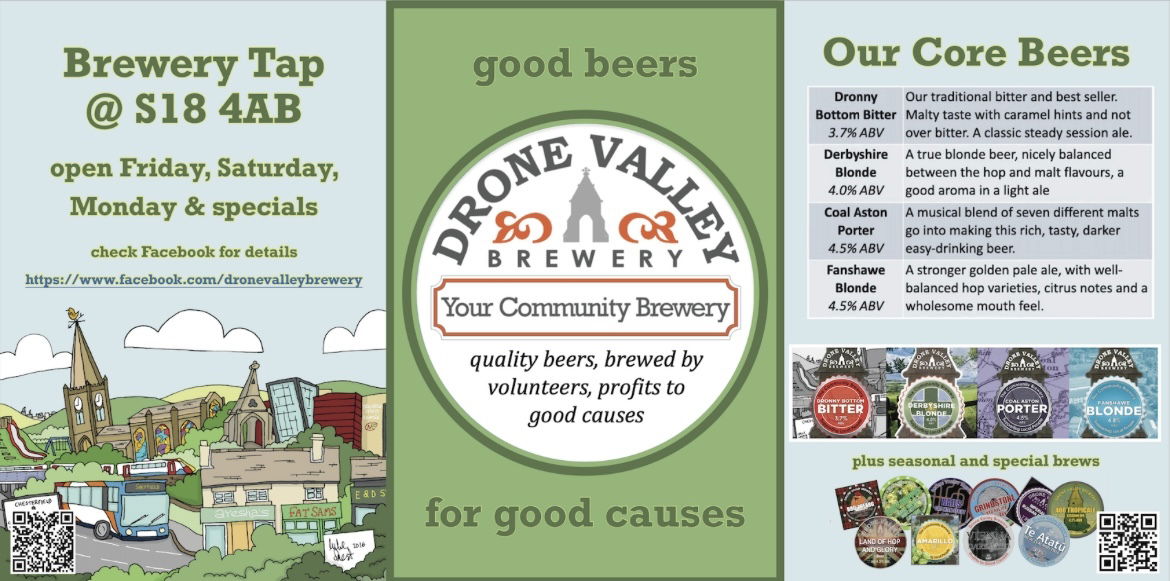
https://www.facebook.com/dronevalleybrewery
https://crafting2gether.org.uk/
As a charity our aim is to provide opportunities and activities through the medium of crafting that enhance the physical and mental wellbeing of all participants and beneficiaries.To further this goal, we conduct drop-in crafting sessions that are open to all! They are held on every Tuesday and Thursday between 10:00 a.m. and 3:00 p.m at The Peel Centre in Dronfield.Whether you're new to crafting or an old hand at it, you will be welcomed by one and all. We can provide some crafting materials but please feel free to bring your own. Come in, have a cup of tea, learn a new skill, or work on our community crafting projects together!
Where
The Peel Centre, Dronfield S18 1PX
When
Every Tuesday and Thursday10:00 a.m. to 3:00 p.m.
Contact Us
info@crafting2gether.org.uk

Since our inception in 2020 we have provided over 76,000 hand crafted face masks free of charge to the NHS, Charities, Community Organisations, Foodbanks, Schools, Hospices, Care Homes and many others, supporting the health and welfare of all those working to support these groups.Through these relationships, we have gone on to forge strong partnerships with many of these Organisations and at the same time, provided opportunity to our volunteer base.We have crafted toy bags/clothes organisers/hygiene bags and toys for Baby Basics, supporting new mothers and families in difficulty and through our work with the Grace Project, have provided hygiene bags in support of its work towards gender equality.Through our work with those supporting the most vulnerable in our community, we have continued to craft goods for use by Ashgate Hospice, supporting families in a time of crisis and generating much needed funding for them. We are also working with many Care Homes to provide Dementia aids in the form of twiddle muffs and dignity aprons and have recently forged a partnership with the Alzheimer’s Society to provide craft based group therapy as we move out of lockdown.Across Education, we have worked closely with local schools, providing reusable face masks for pupils and staff alike and using the medium of craft as part of pupil led projects we have seen them go on to create their own hand crafted face masks and at the same time embrace the role of volunteering in our society. In turn, some of these schools have gone on to deliver their own hand crafted products to the organisations we support.We have supported the Pathways and Archer Projects (for the homeless) making masks and neck warmers for rough sleepers, supported the NHS (bonding hearts for the Premature Baby Unit) and the Royal British Legion (in the repurposing of hand crafted poppies for resale in 2021) and for our volunteers we have provided a safe and inclusive space to meet and work and have recently embarked on drop-in skill sessions (crochet, card making, macramé) which are available to all. And last but not least, we are currently working on a community quilt that recognises the difficulty of recent times for many and the sheer energy and commitment of our volunteers to endure.
The provision of facilities for education, recreation and leisure time activities in the intertest of social and community welfare with a view to improving the conditions of life of the inhabitants of the local community, in particular, through arts and crafts activities.The relief of those in need by reason of youth, age, ill-health, disability, financial hardship or other disadvantage by the provision of hand made items, such as, clothing for those who are suffering from homelessness, ill-health, bereavement and long term terminal health.
Shala Healing
We offer a variety of different treatments and experiences such as; Sound Baths, Reiki, Sound Therapy, Sound Massage, Crystal Healing, Body Scanning, Chakra Clearing, Grounding, Reflexology (coming soon), Sound Therapy, Cord Cutting, Room Clearing, Card Reading, Meditation sessions and a range of workshops.
We now have our own dedicated studio – in the heart of Dronfield, where we can have up to 6 people for sessions, we also have 6 zero-gravity chairs for those who prefer not to be on the floor. We are fully equipped with mats, blankets, pillows, etc. We also have two treatment beds so you can have treatments as a couple or with a friend or loved one too. Everything to create an intimate, tranquil atmosphere where you can truly relax, replenish and revive….
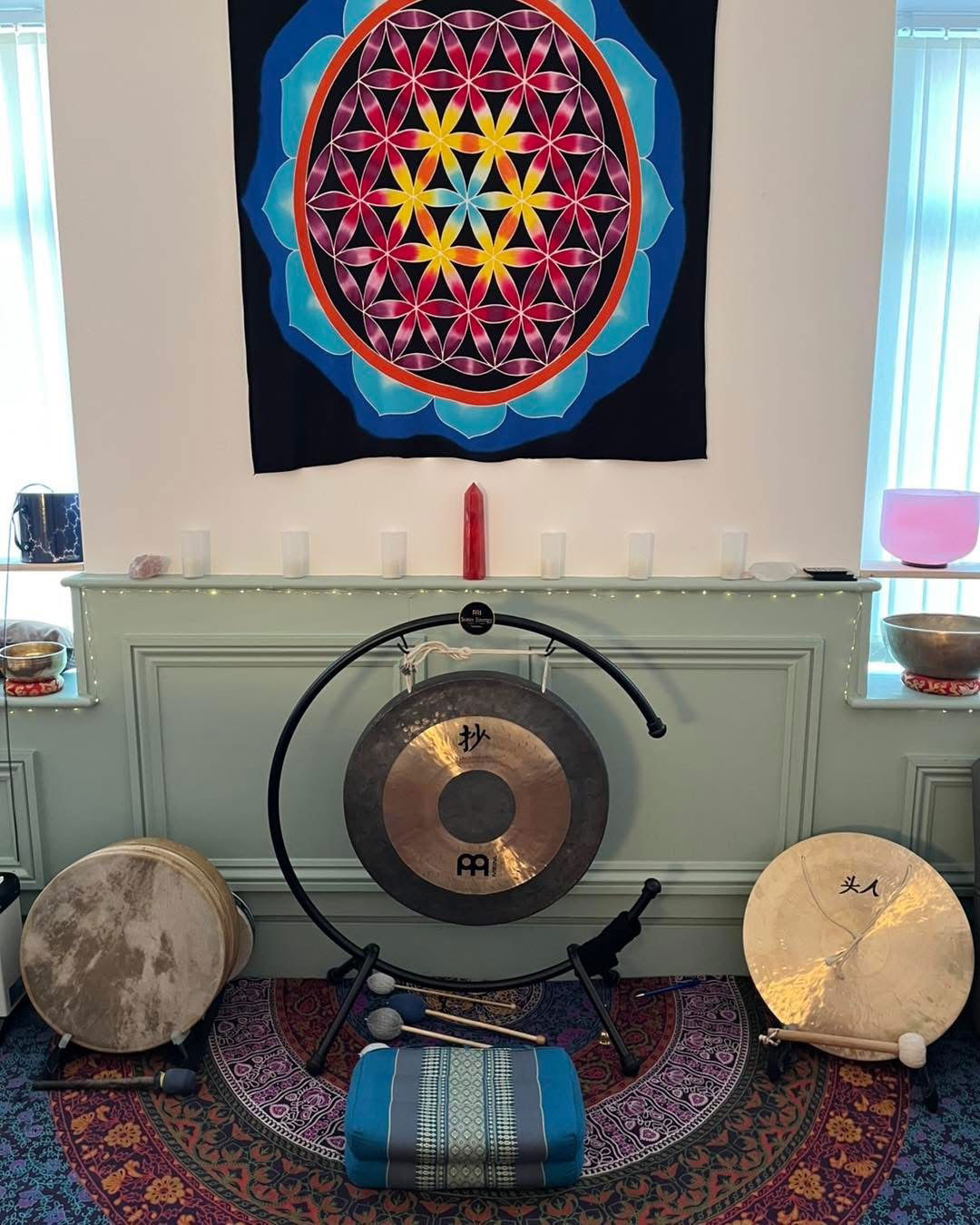
Dronfield2gether aims to nurture closer links between Dronfield's many community and voluntary groups, organisations and businesses to enable them to support each other and to work more closely together to enhance community spirit in Dronfield.
Contact : Shelley Hinson(Coordinator) 01246 417432 Mobile 07890 843166,
email coordinator@dronfield2gether.org.uk
Health And Wellbeing
I'm Lydia Homebased Level 3 nail tech in Dronfield Builder gel (biab), Gel Polish,Brows, LashLifts
https://www.facebook.com/profile.php?id=100072391770992
Welcome to Wheek'in Willows! Handmade Resin and clay products, l work with Ashes & Hair to make beautiful keepsakes of your loved ones or pets, I can personalise and customise your orders as wished, please dont hesitate to get in touch, Love Kate XxX
https://www.facebook.com/share/166tTzMbk3/?mibextid=wwXIfr
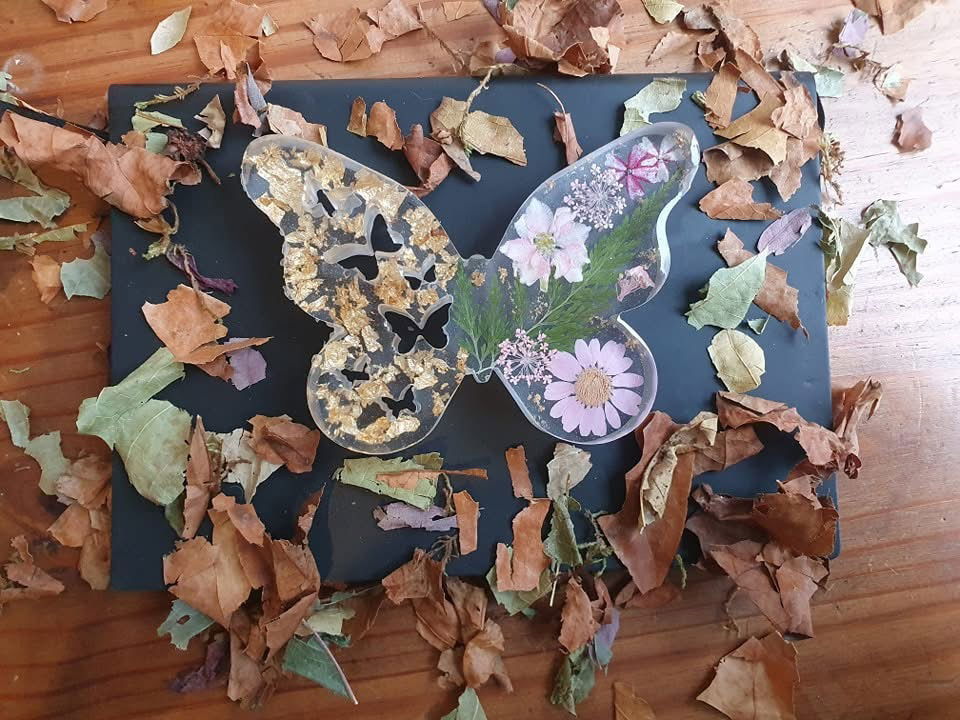
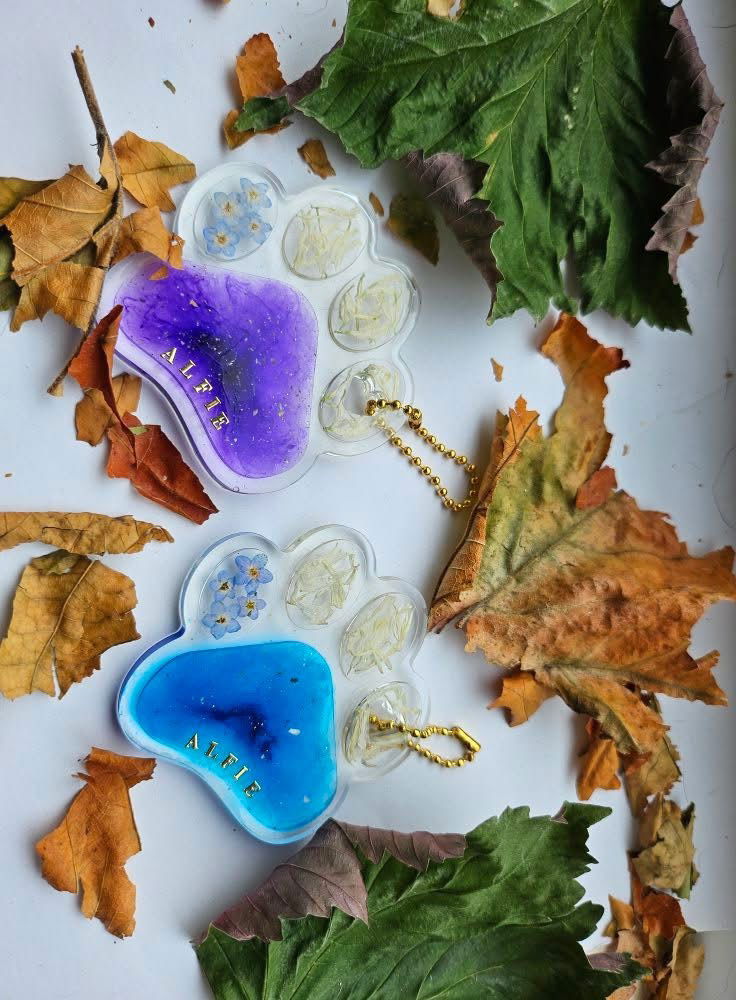
Hearing Help UK is a charity organisation that is contracted by Derbyshire County Council and the NHS Derby and Derbyshire Integrated Care Board, to provide practical help, information and support to individuals with hearing loss and their families and carers, throughout Amber Valley, Bolsover, Chesterfield, Derbyshire Dales, Erewash, High Peak, North East Derbyshire and South Derbyshire.
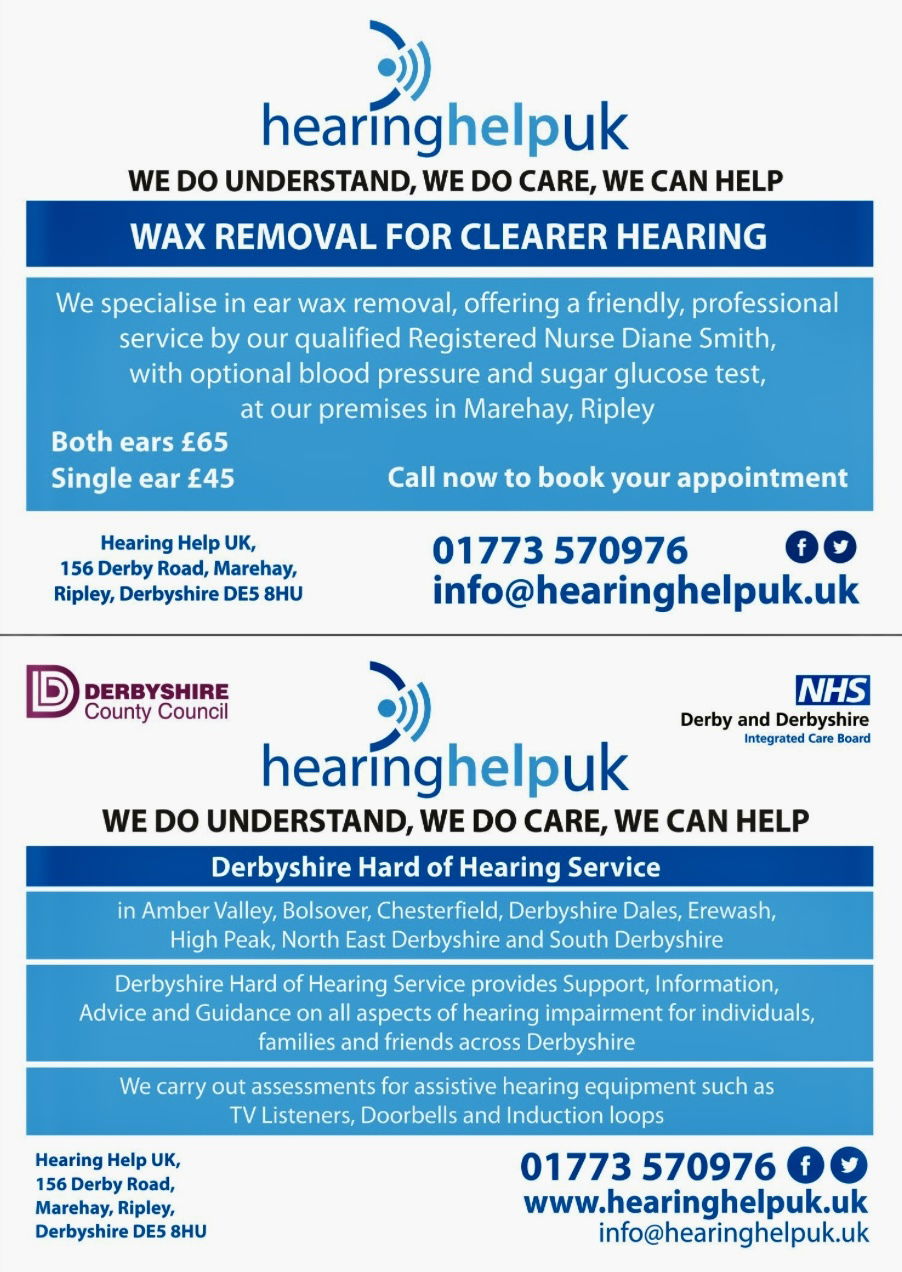
www.derbyshire.gov.uk/social-health/health-and-wellbeing/your-health/your-health.aspx
https://derbyandderbyshireemotionalhealthandwellbeing.uk/
www.ne-derbyshire.gov.uk/about-the-council/partnerships/healthy-ned-partnership
Co-ordinates actions to address three ambitions: Building Healthy Communities, Promoting Healthy Lifestyles & Improving Access to Preventative Health and Social Care.
Provides & signposts to various health and well-being related services.
Release offers training, guidance and information to educate and equip people with the crucial life skill of managing their finances and making informed choices. This includes practical help with budgeting and related support.
Finance

Support for Carers
Derbyshire Carers Association provides support to people with caring responsibilities.
The Silver Line
is a free helpline for older people across the UK that's open 24 hours a day, 7 days a week, 365 days a year. Tel : 0800 4 70 80 90
B:friend is a charity that works in Derbyshire, amongst other areas to try and reduce loneliness and isolation amongst older neighbours in our community. This is done by providing face to face befriending and social clubs. Befriending is done by volunteers who are local to their older neighbour. Volunteers offer an hour a week for a cuppa and a chat. All volunteers have an enhanced DBS check and a Befriending Coordinator is on hand to support all pairings.
To refer an older neighbour, become a volunteer or find out about social clubs in your area please visit
DVA Facebook page
https://www.facebook.com/FeelingConnectedDVA/
Feeling connected DVA
https://www.feelingconnected.org.uk/

See below for crisis and mental health support
Signposting Mental Health Support
Peer Support
This page includes information about various organisations in North Derbyshire providing mental health support
There are a number of mental health peer support groups across Derbyshire, each providing different services and catering to different needs. For more information about these, please click the link below to view an interactive map of peer support groups.
https://www.google.com/maps/d/viewer
Community Mental Health Teams
The teams offer support to people with a range of mental health difficulties. Examples of these include psychosis, bi-polar, personality disorder, severe depression and anxiety.
www.derbyshirehealthcareft.nhs.uk
Counselling, Therapies and Support
Facilitator is Al
I would personally like to thank Al & Mick for there massive donation of £1,000.00 towards our funds from Dora 2017 Via the Chesterfield Bipolar group, this means so much to our little community hub x
Bipolar UK Chesterfield Support Group
chesterfield@bipolarukgroups.org
The above group email is not monitored all the time, so below are some further details
http://www.facebook.com/bipolaruk
https://www.derbyshirehealthcareft.nhs.uk/services/talking-mental-health-derbyshire
https://www.vitahealthgroup.co.uk/nhs-services/nhs-mental-health/derby-and-derbyshire/
https://www.cruse.org.uk/get-support/contact-your-local-branch/
https://relatechesterfield.org.uk/
Support in a Crisis
Contacts and advice for people needing support in a crisis.
If you are feeling suicidal
If you or someone you know is feeling suicidal there are people you can talk to:
- Speak to a friend, family member or someone you trust
- Call the Derbyshire Mental Health Support Line on 0800 028 0077 (7 days a week, 9am to midnight)
- Call the free Samaritans 24-hour support service on telephone 116 123 or contact Samaritans online
- Use the Staying Safe website for support, information and making your own safety plan
- Contact NHS 111, though be aware of delays in accessing this service
- Make an urgent appointment to see your GP, who may be operating a callback service
- Ring 999
- If you require urgent medical intervention go to your nearest emergency department, though be aware that there are increased demands on and transmission risks in emergency departments at this time.
If you need urgent help
If you, or someone you care about, is experiencing mental ill health and is in a crisis or emergency situation, there are many ways that you can get help:
- Contact your local GP, who knows your medical history, and will decide with you the best action to take. Request an emergency appointment.
- If a health or social care professional (your care coordinator or key worker) has given you a specific phone number to call when you are concerned about your condition, continue to use that number.
- For adult social care during office hours contact Call Derbyshire tel: 01629 533190 from 8am to 8pm on Monday to Friday, and 9:30am to 4pm on Saturday. Outside of normal hours, call the emergency duty team tel: 01629 532600.
- Mental health charity Mind suggests practical things you can do to help yourself if you're feeling suicidal or are in crisis. It has information about where you can get help as well as links to blogs and websites where people have shared their experiences of dealing with a mental health crisis.
Sale
We provide free and confidential, specialist trauma informed counselling, for 26 weeks initially, face to face in Chesterfield, also at our Hubs in Belper, Long Eaton and Matlock. We also offer counselling remotely by telephone. Counselling is for anyone over 18 residing in Derbyshire affected by sexual abuse, sexual assault or incest at any time. We have Independent Sexual Violence Advisor service (ISVA) for anyone who is seeking practical and emotional support when accessing other services or agencies. This service can also support with reporting to police, through the criminal justice system to court and CICA system. We provide emotional support and information through our helpline by free phone, email and text. We offer Art Therapy and Drama Therapy, using a blend of talking and creative art making and several types of creative and performing arts to facilitate emotional release, exploration, and healing. We offer peer support groups and group therapy in a space created for the opportunity to connect with others who may also identify in some way as survivors. Topics covered include safety, stabilisation, self-care, and assertiveness. We offer volunteer placement opportunities for helpline workers and counselling students. Please visit our website or contact our helpline for more information about our services.
https://www.sailderbyshire.org.uk/
NHS 111
https://www.nhs.uk/nhs-services/urgent-and-emergency-care-services/when-to-use-111/
but not if it's a life-threatening situation.NHS 111 is available 24 hours per day, 365 days per year. Calls are free from land lines and mobile phones.Tel: 111 if:
- you need medical help fast but it's not a 999 emergency
- you think you need to go to accident and emergency or need another NHS urgent care service
- you don't know who to call or you don't have a GP to call
- you need health information or reassurance about what to do next
For less urgent health needs, contact your GP or local pharmacist in the usual way.
Samaritans
www.samaritans.org for people who are experiencing feelings of distress, despair or suicidal thoughts. Tel: 116 123 free helpline, or email jo@samaritans.org
Staying Safe
Information about how to make a safety plan can be found on www.stayingsafe.netfor anyone struggling with suicidal thoughts or supporting someone else.

Stay Alive app
prevent-suicide.org.uk/find-help-now/stay-alive-app is a suicide prevention resource for the UK containing useful information and tools to help you stay safe in crisis. You can use it if you are having thoughts of suicide or if you are concerned about someone else who may be considering suicide.
www.thecalmzone.net
Campaign Against Living Miserably (CALM)
Calm is for anyone who needs to talk about life's problems. Tel: 0800 58 58 58 free helpline or webchat from 5pm to midnight every day.
www.papyrus-uk.org
Papyrus is for children and people under 35 who are experiencing thoughts of suicide or for anyone concerned that a young person could be thinking about suicide. Tel: 0800 068 41 41 free helpline from Monday to Friday 9am to 10pm, weekends 2pm to 10pm, bank holidays 2pm to 5pm. Text:07860 039967or email pat@papyrus-uk.org
Text Shout to 85258 to access a free, confidential, 24/7 text messaging support service if you are struggling to cope. If you are deaf, DEAF to 85258. https://giveusashout.org/
Childline
helps children and young people under 19 with any issue they're going through. Tel: 0800 1111 free – the helpline number won't show up on your phone bill. Because of the coronavirus outbreak, you can only speak to a Childline counsellor online or on the phone from 9am to midnight.
Mental health advocacy and specialist advocacy
If you or someone you know has been sectioned under the Mental Health Act then there are specialist independent advocacy services to provide support in understanding your legal rights and being heard in relation to your care and treatment. You have to meet certain criteria in order to have this specialist advocacy If someone lacks capacity to make their own decisions then the specialist independent advocacy service can represent their views and wishes.For further information read about
Urgent Mental Health Crisis Care Services There are a range of local support services for adults with immediate mental health needs in Derby and Derbyshire. Chesterfield Safe Haven Address: 188 North Wingfield Road, Grassmoor, Chesterfield, S42 5EJ Open every evening from 4.30pm to 12.30am. Telephone 01246 949410
Specialist Suicide Bereavement Support – for anyone affected by a death by suicide The Tomorrow Project is here to help anyone bereaved or affected by suicide. We provide information, advice and emotional support to anyone of any age who might be struggling following a suicide supporting someone you are worried about following a suicide regardless of relationship to the person they lost.

Getting support at the right time and knowing where to turn for help is so important. Check out the link to see what support is available on the Derby and Derbyshire Emotional Health and Wellbeing Website
https://derbyandderbyshireemotionalhealthandwellbeing.uk/adult/support-services
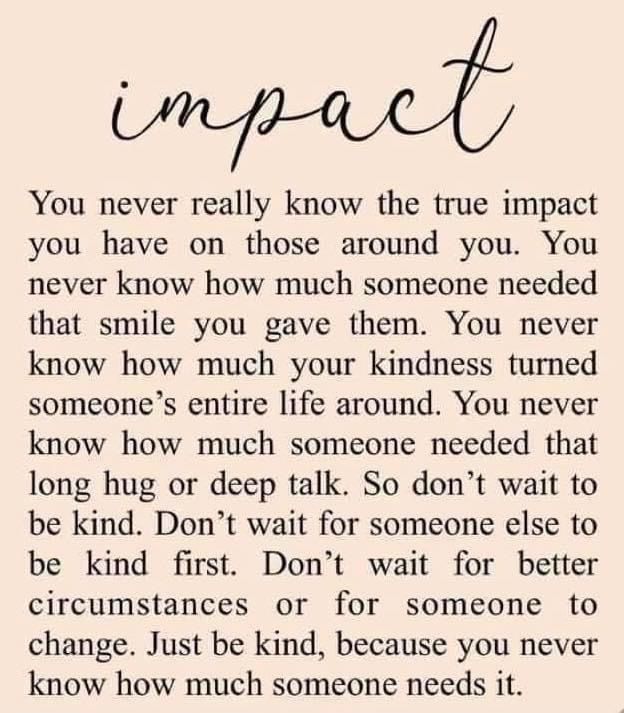
Items we hand make and sell at the hub
Brightlife Awards 2023

Brightlife Champion Awards
CHESTERFIELD based charity BrightLife will be hosting their annual BrightLife Champions Against Loneliness Awards, at Casa Hotel, on 17 February 2023. The auction sponsored by John Pye Auctions has a variety of items donated from local companies with all proceeds from the auction helping to raise much needed funds for the charity. The funds raised will help them to continue the great work which they do in preventing loneliness and isolation amongst older people living in Chesterfield, Bolsover, and Northeast Derbyshire.
Read More
8 Categories
The awards evening is a fundraising event at which the local charity BrightLife will acknowledge and celebrate those members of society who have gone above and beyond in their actions to ensure that loneliness and isolation doesn’t occur amongst older people living within Chesterfield, Bolsover and North East Derbyshire. The 2023 award categories will include: Champion Champion Young Person Champion Volunteer Champion Medical Professional Champion Carer Champion Business Champion Neighbour Champion Family Champion Charity
Read More
Champion
Mel from Derbyshire County Council nominated me I won the overall champion. We were so please that Dronfield Woodhouse Community Support Hub is being mentioned, thanks Mel x
Read MoreFundraising for our hub & Volunteering
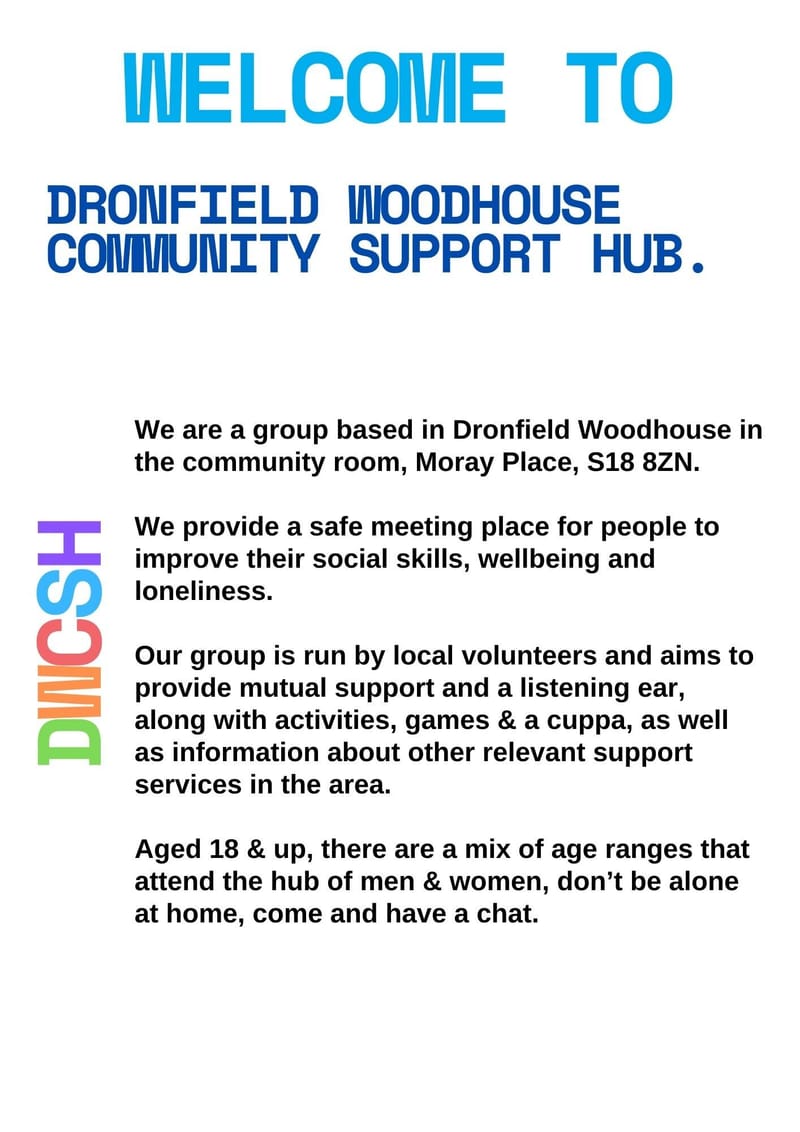
Financial donations needed
Hi my name is Farida and the hub is run by volunteers, we set up nearly 3 years ago now and would like to continue to support people in and around the dronfield Woodhouse community. Being lonely is a terrible thing and it has been incredibly rewarding running the hub with great volunteers. We go out for meals together and play all sorts of games, do arts and crafts and have many other organisations who come to the hub to give advice to anyone who needs help and support. we still need constant financial support and we make paper flowers and greeting cards that we hand make at the hub which raises funds. We need some further financial support from around our local community and local businesses. We are happy to advertise and promote the businesses who support us on our website. We appreciate any donations from our community and financial support. Please contact me if you would like our bank details to make a donation.

Mobile
You can contact us by mobile on 07821 691192 If there is no answer leave a voice mail and I will call you back or text me. Thanks

Media
We believe in community and sharing our services, there is always a bigger picture and more support needed. We are happy to share our website with appropriate local businesses and support local charities. If you want any of your details putting on our website please email me dwcsh@outlook.com
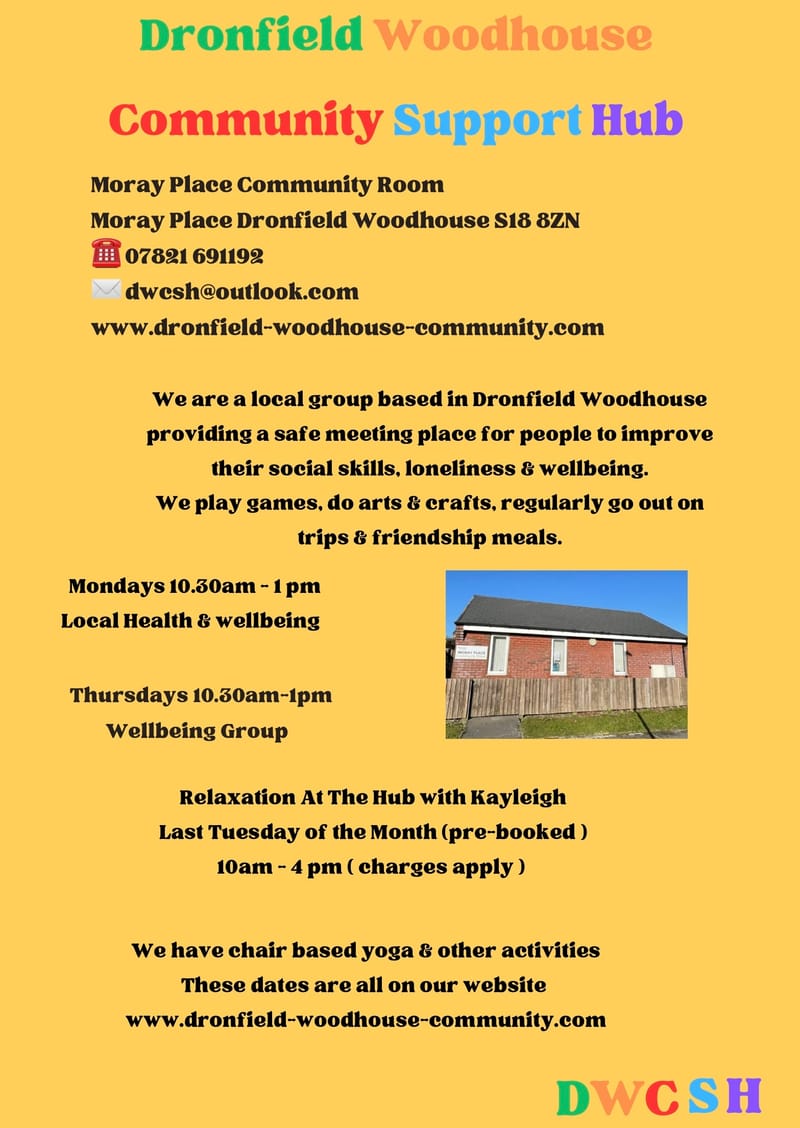
Our private face book page
This is where you can find what we are planning to do in the weeks and months ahead. Click on learn more button to Facebook page
Learn More
New type of Fundraising
We want to welcome Alison to our team of volunteers! Alison will be joining us for our Monday sessions, and lives just around the corner at the bottom of Longcroft Road, where she lives with her husband, three daughters and 3 cats! Alison used to work in pharmaceuticals, travelling all over the world. She took redundancy in 2017 to make some changes in her life, so that she could spend more time with her family. At this point she trained to be a personal trainer and nutrition coach and had a small home based gym where she trained men and women between the school runs. In 2018, Alison also started working with Utility Warehouse (UW), helping people save money on their bills, and thoroughly enjoys helping people have the option of saving money on their bills, and not having to pay more than they need to. UW has given Alison a bit of time freedom and she has been looking for somewhere to volunteer for a while. On a personal level, Alison enjoys to crochet, loves doing jigsaws, paint by numbers and of course walking and going to the gym! Alison is self employed and works for Utility Warehouse If you move any of your services to Utility Warehouse through Alison, a donation of up to £150 will automatically go to our hub - and you'll save money too. Its quick and simple, no obligation and every switch helps us. Scan the QR code for more information or speak to Farida/ Alison
Learn MoreSafe Guarding
Farida McGann
Mental Health First Aider Certificate
David McGann
Mental Health First Aider Certificate
Our group is covered by public liability insurance.
Farida
Chair based
Farida
Chair based
Farida
Chair based
Dave
Chair based
Dave
Chair based
Dave
Chair based
Contact Us
- Moray Place, Dronfield Woodhouse, Dronfield, Derbyshire S18 8ZN, UK
- +44-07821691192 - Mobile number
- dwcsh@outlook.com
- Mon- Thur 10.30 am - 1 pm
Please send your full contact details, your enquiry and we aim to contact you within 48 hours
